

How to list project management skills on your resume
When I brainstormed a list of project management skills to put on my resume (which over here in the UK we call a CV), it was a long list.
If you’re putting together an application for a job, you’ve probably found the same. How do you list the project management skills required without it turning into a giant list of buzzwords?
Here’s how.
How to include project management skills on your CV
Let’s just go with the fact that CV and resume are interchangeable terms for the purposes of this article.
On my CV, I have a section that covers skills. While I try to make it obvious in the job descriptions and project descriptions, it’s worth calling out what you can do by adding a ‘Skills’ heading.
Mine is called ‘Skills Profile’. Underneath, I list skills grouped together by:
- Interpersonal skills
Each of those headings has a list of bullet points underneath that give examples of how I have demonstrated those skills.
I don’t specifically call out project management skills on my resume here: it’s implied in the list of projects I have led in the work experience section underneath.
However, if you don’t have work-related projects , you can add project management skills as one of those headings. That’s the bullet point where you’d talk about your ability to do the technical parts of project management.
What skills to choose?
We aim for a CV to be a couple of pages. I’ve had to read resumes that were over 5 pages and frankly I lost the will to live. It’s too much, and too much detail. And there was a lot of jargon that meant nothing to me.
As you want to keep your application concise and to the point, you’ll need to be a little choosy about the project management skills that make it onto your resume.
The good news is that you don’t have to make that call yourself.
Use the job listing, job description, or personal profile to help you uncover what skills the hiring manager is looking for.
Many employers use sifting tools that look for keywords. They will program in keywords from the advert so those are definitely the ones to focus on.
Below, we’ll look at some examples of common project management skills for your resume.
Soft skills (a.k.a. Power skills)
Soft skills are actually the hard part of project management! But we call them ‘soft’ because they are difficult to quantify and are more to do with interpersonal activities and emotional intelligence.
There’s now a trend towards calling them ‘power skills’ (started, I believe, by PMI) because calling them ‘soft’ makes them seem easy. And you don’t have to work as a project manager for very long before you realize they are truly not easy.
Power skills include:
- Communication (written and verbal)
- Stakeholder engagement
- Conflict management
- Negotiation
- Influencing
- Team building
- Change management .
Ethics, diversity and inclusion and managing workplace stress all fall into this category as well.

Hard skills
Hard skills are technical project management skills: things you need to do to tick the box to prove you can lead a project. They aren’t necessarily ‘hard’ in the sense that they are difficult. They are ‘hard’ compared to ‘soft’, so if we’re moving to the power skills terminology, we should probably ditch hard skills as well.
On your resume, don’t describe them as ‘hard skills’, stick to terms like technical abilities, core competencies, technical skills, project management techniques or something similar.
This group of skills includes:
- Time management
- Resource management
- Project budget management
- Scope management
- Governance and project assurance
- Risk management
- Quality management
- Procurement, and supplier/contract management
- Issue management
- Configuration management.
Either list out the skills with an example that shows you can demonstrate each, or work these words and explanations into your job history section. As I said above, that’s what I do: the fact I can manage projects is woven all the way through my job history.
I don’t repeat that I do risk management for every project, and you don’t have to either. Think about showcasing one or two skills per job (or project) so overall your CV demonstrates that you can do them all. It would get boring to read about how you engaged stakeholders on every project — employers simply need to see a mention of it.
Check what project methodology your prospective employer uses. Then you can tailor your application to mention agile approaches, predictive or hybrid ways of working.
Describe your project management skills
It’s not enough to simply give a list. Anyone can copy a list of skills from any website or job description. You also need to give an example of what that skill looks like, for you, based on your personal experience.
Here’s a real example of one of the bullet points from my CV that falls into the interpersonal skills section.
- Excellent communication and presentation skills gained from speaking at conferences, delivering online and face-to-face training, and facilitating workshops in a professional setting.
You can see that I name the skill and then describe how I demonstrate it. That gives an employer something to ask about at an interview: “Tell me about a time when you have had to facilitate a workshop.”
It also helps employers understand the scale and scope of your skills. For example, have you run workshops for 5 people or 500? There is no correct answer, but providing some numbers and context helps recruiters understand what you are capable of.
You don’t want to write too much, but you do want to let hiring managers know that you can actually do the skill, and haven’t just copied and pasted it off a list on the internet.
Your next steps
The skills needed for project management jobs vary, so check out what is mentioned in the job posting and think hard about how you can evidence those. Then tailor your resume to highlight the skills that the employer feels are important.
Here are some things to do next.
- Make sure you understand the project management job description so you can check you are listing the most appropriate skills.
- Brainstorm your past experience and consider how to include your work projects in your resume.
- Take a look at the different project management job titles so you know what jobs to apply for.
- Invest some time in updating your resume with project management skills and experience so your application shines.
What skills are needed for project management?
Project management needs a mixture of technical and interpersonal skills including scheduling, team leadership, emotional intelligence, organizational ability, and communication.
Project manager, author, mentor
Elizabeth Harrin is a Fellow of the Association for Project Management in the UK. She holds degrees from the University of York and Roehampton University, and several project management certifications including APM PMQ. She first took her PRINCE2 Practitioner exam in 2004 and has worked extensively in project delivery for over 20 years. Elizabeth is also the founder of the Project Management Rebels community, a mentoring group for professionals. She's written several books for project managers including Managing Multiple Projects .
Project Manager Resume [2024] - Example & Full Guide

As a project manager, you’re the be-all and end-all of any project.
So, you’re great at setting goals, strategic planning, creating budgets, leading a team towards a common goal, keeping tabs on everyone and everything…
Actually, is there anything you can’t do?
Well, if you’re here, chances are your weak point is writing a job-landing project manager resume .
And, yes—it may seem hard to transfer all of your work experience, skills, and professional achievements onto a single piece of paper. With the right guidance, however, it doesn’t have to be!
So, in this article, we will cover everything you need to know about writing an effective project manager resume, including:
Project Manager Resume Example
Step-by-step guide to write your project manager resume, 50 project manager skills to put on your resume.

Like the look of Jennifer’s IT Project Management resume? Create your own modern project management resume in minutes with these easy-to-complete resume templates and get started on your journey to earning the best PMP certification .
Quite impressive, right?
These are the elements that make this project manager resume an example to follow:
- Reverse-chronological format. This resume format is the most popular around the world and effectively shows off the candidate’s work experience.
- Eye-catching resume summary. The project manager resume example above includes a brief and to-the-point resume summary that highlights the candidate’s skills and area of expertise.
- Contact information. The project manager resume example above includes all the necessary contact details, such as the candidate’s email address, location, phone number, and relevant social media handles.
- Achievement-focused work experience section. In this project manager resume example, the candidate doesn’t simply mention their responsibilities - they also include their work achievements to help them stand out from other candidates.
- Relevant education section. The candidate only includes their key education details, such as their Bachelor’s degree and a field-related minor.
- Use of bullet points. The candidate uses bullet points to organize and present the information which makes this project manager resume example look neat and structured.
- Well-organized skills section. This project manager resume example includes the candidate’s soft and hard skills that are relevant to the IT industry and project management.
- Effective use of additional sections. The candidate takes advantage of the extra space on their project manager resume by including relevant additional sections, such as their industry-related certifications and academic achievements to show off their professional background.
We've also got more resume examples that you might want to check out:
- Program Manager Resume
- Operations Manager Resume
- Business Development Manager Resume
- Human Resource (HR) Resume
- Office Manager Resume
Writing a project manager resume is no different than working on any other project - you definitely need to have a plan and know the exact steps you’re going to take.
Luckily, you don’t need to figure it out yourself!
We’ve covered each step of writing a powerful project manager resume for you, so let’s dive in:
#1. Pick the Right Format for Your Project Manager Resume
The reverse-chronological resume format is by far the best option for your project manager resume.
As we’ve mentioned above, the reverse-chronological format is the most popular resume format worldwide. It’s also a recruiters’ favorite!
Here’s what it looks like:

This resume format gives the recruiter a clear picture of your professional background and work achievements by putting your project manager's work experience in the foreground.
Now that you’ve chosen a format for your project manager resume, let’s address the resume layout .
These are the resume layout elements you should pay attention to:
- Font style . Your project manager resume has to be easily readable, so choose a professional font style that looks good on both PDF and paper.
- Font size. Keep your font size at 11-12 pts for body text and 14-16 pts for section headings, so that your project manager resume is easy-to-read and fits into a single page.
- Bullet points. Whenever possible, use bullet points to present information and make your project manager resume easy-to-scan as well as well-organized.
- Resume length. Recruiters go through hundreds of resumes every day, so it’s best to fit your project manager resume in one page to make sure they actually read it.
- Resume file format. If not asked otherwise, always save your resume as a PDF file so that it looks the same no matter the device or OS the hiring manager uses.
Use Our Tried & Tested Templates
As a project manager, you’re great at time management.
So, you probably aren’t too excited about spending hours on pointless tasks… like formatting your project manager resume.
And especially so when you could be focusing on more important things instead, such as perfecting the contents of your project manager resume.
What if we told you there’s a quick and easy shortcut?
Instead of wasting your time on designing your resume, just pick one of our professional resume templates and dive straight into filling in the contents of your project manager resume!
Besides, our resume templates are far more visually appealing than basic text-editor resumes.
Check it out for yourself:

#2. Add Your Contact Information
Now that you’ve dealt with formatting your project manager resume, you can start filling in the contents.
Let’s begin with the basics - simply add your contact information , including:
- Your first name and last name
- Your title
- Your phone number
- Your email address
- Your location
- Relevant social media handles (optional)
Here’s an example of a contact information section that includes all of the above:
Lauren Anderson
Project Manager
012-345-6789
Boston, Massachusetts
linkedin.com/in/laurenanderson29
This step is as easy as it looks - you just have to make sure to fill in the contact details correctly.
Otherwise, you may leave a bad impression which can hurt your application.
After all, no company wants a project manager who’s sloppy and doesn’t pay enough attention to details.
#3. Write an Impactful Project Manager Resume Summary
The next step is writing an impressive project manager resume summary .
Your resume summary is meant to provide a quick overview (2-3 sentences) of your professional background to let the hiring manager see whether you’re a relevant candidate.
So, to make sure the recruiter doesn’t put your project manager resume aside after taking just a glance (and actually reading the whole thing), your resume summary has to be effective.
Here’s what a powerful resume summary includes:
- Your title and years of experience
- Your most relevant skills in project management
- Your top 1-2 professional achievements
And here’s an example of an impactful project manager resume summary:
- Strategic and detail-oriented Project Manager with 7+ years of experience. Outstanding organizational, time management, planning, and problem-solving skills. Met all project deadlines for 5 years straight and increased Company X’s market share by 12% through successful branding projects.

#4. Make Your Project Manager Work Experience Stand Out
As a project manager, you have tons of work experience , so the next step is to list it effectively.
First things first - let’s get the formatting right.
Here’s how you should format the work experience section in your project manager resume:
- Follow the reverse-chronological order. Start with your most recent (or current) position and go backward in time.
- Add your job title. This is supposed to give the recruiter a clear idea of the role you had in the previous workplace.
- Include the company's name and location. You can also briefly describe the company if it’s not a well-known name.
- Add the date of employment. To show how long you worked at the company, use the mm/yyyy format.
- Write down your achievements and responsibilities. Stick to 5-6 bullet points for the most recent roles and 2-3 for older jobs.
Now, no doubt you want your project manager resume to make a lasting impression on the hiring manager and help you land the job.
So, filling in just the basic work experience details isn’t nearly enough - you’ll end up with a project manager resume that’s similar to other candidates’ resumes.
If you want to make your project manager resume stand out, ask yourself - what exactly are hiring managers looking for?
Sure, it’s your years of experience, but the responsibilities you had in previous roles weigh in much less.
To recruiters, the most important part of your professional background is a proven track record of success .
As such, the key to a job-winning project manager resume is this:
Make your work experience section stand out by focusing on your achievements over your responsibilities whenever possible.
So, here’s what you can do to take your work experience section to the next level:
- Use action verbs to describe your achievements and responsibilities, e. g. spearheaded, managed, resolved, executed, etc.
- Only include relevant work experience, e. g. you already have relevant project management experience, so the recruiter won’t be impressed that you scooped ice cream in high school.
- Make your achievements quantifiable , e. g. ”Consistently delivered projects up to 12% below the budget” instead of “Consistently delivered projects under the budget”.
Here’s an example of what an impressive work experience section could look like:
IT Project Manager
08/2017 - 01/2022
- Led and coached a team of 16 IT specialists.
- Managed the Lean Training project for all 54 IT department employees.
- Consistently delivered projects up to 12% below the budget.
- Initiated and managed the project to replace all aging equipment, lowering monthly electricity costs by 23%.
- Introduced a project performance management system that increased project efficiency by 18% over the period of 3 years.
#5. List Your Education Right
Whether you have a degree in project management, business administration, or any other related field, what matters most is your work experience, so keep your education section brief.
Simply list your education starting with your highest degree as such:
- Degree Name
- University, college, or other institution
- Location (optional)
- Years attended
As a project manager, technically you aren’t required to have a degree (though this can make competing against candidates with a diploma much harder), so only include your high school education in your project manager resume if you don’t have higher education .
Here’s an example of the education section:
BSc in Project Management
Colorado State University Global
09/2012 - 06/2016
#6. List Your Project Manager Skills
The skills section shows the recruiters your professional abilities, so it’s one of the most important sections (alongside the work experience section) in your project manager resume.
Here are some tips on how to list your skills effectively:
- Tailor your skills section for project management. The point of the skills section is to prove to the hiring manager why you’re a great candidate for this position, in particular, so listing all of your skills is redundant.
- Include any of the skills you have that the company is looking for. Carefully read the job description and see whether the company has listed any specific skills - if you match them, make sure to include them in your project manager resume.
- Research the most in-demand project management skills. The skills you need largely depend on the field (IT, marketing, retail, etc.), so research the project management field you’re specifically applying to and write down any of the industry-related skills that you have.
- Take a look at your achievements. Not sure which skills you have? Your achievements are proof of your skills, so go back to the work experience section and take a closer look. For example, if you consistently deliver projects before the deadline, you’re likely skilled at time management, planning, delegation, etc.
- List your soft skills and hard skills separately. This will make your project manager resume well-organized and easy to navigate.
Need some inspiration on which skills to include in your project manager resume?
Take a look at our list of the 50 most in-demand project management skills!
Soft Skills for a Project Manager
- Public Speaking
- Active Listening
- Communication Skills
- Critical Thinking
- Problem-solving
- Negotiation
- Conflict Resolution
- Analytical Thinking
- Adaptability
- Stress Management
- Time Management
- Collaboration
- Compromising
- Organizational Skills
- Emotional Intelligence
- Resourcefulness
- Decision-making
- Attention to Detail
25 Hard Skills for a Project Manager
- Business Strategy Knowledge
- Forecasting
- Project Management Methodologies
- Microsoft Office Proficiency
- Technical Documentation
- Project Management Software Proficiency
- Process Management
- Strategic Planning
- Statistical Analysis
- Risk Evaluation
- Risk Management
- Database Management
- Programming Languages
- Technical Writing
- Prioritization
- Evaluation of Project Performance Metrics
- Goal Setting
- Financial Management
- Contract Management
- Vendor Management
#7. Include Your Project Management Certificates
While some companies don’t require project managers to have a degree, many are looking for certified project managers.
Having a project manager certificate also means that you’ll get paid more - in fact, certified project managers earn up to 16% more compared to their uncertified colleagues.
So, don’t let your certificates go to waste and include them in your project manager resume (in reverse-chronological order, of course, in case you have multiple certifications )!
Here’s how to do it:
- Certification name
- Name of agency
- Year of obtainment
- Location (if applicable)
- Date of expiration (if applicable)
- Expected date of obtainment (if applicable)
And here’s an example:
Certified Project Manager Professional (2019-2022)
Project Management Institute
#8. Make Use of Relevant Additional Sections
Do you still have some extra space on your project manager resume?
Take advantage of it!
Show off your project management experience by adding one or more of these additional sections:
- Associations and organizations you’re a part of, alongside your role in them.
- Publications , such as studies, interviews, and others.
- Conferences , whether they’re on project management or industry-related subjects.
- Awards , if any of them are related to project management.
- Languages are always a plus, but even more so if you’re applying to an international company.
And here’s an example of how to put these extra sections on your project manager resume:
Conferences
- BRIDGE 2021
- English - Native or Bilingual Proficiency
- Russian - Professional Working Proficiency
#9. Match Your Project Manager Resume With a Cover Letter
Now that you know how to write an effective project manager resume, there’s one more thing we need to address - how to write an impactful cover letter .
The point of a cover letter is to prove to the hiring manager that you’re the full package - a competent project manager and the perfect fit for the company.
So, your cover letter should be personalized for the position and include any important details that you haven’t mentioned on your project manager resume.
Here’s how to write a compelling cover letter (even if you aren’t confident in your writing skills!):
- Start your cover letter by putting your contact information in the header.
- Directly greet the recruiter and mention your top 1-2 achievements in the first paragraph.
- In the body of your cover letter, describe your professional background (work experience, skills, etc.) in detail, explain why you want to work for this particular company, and stress why you’d be a great asset to them.
- To end your cover letter , include a call to action.
Check out our guides on cover letter writing tips and cover letter mistakes to make sure your cover letter is top-notch.
Here’s an example of a convincing project manager cover letter :

Want to show the hiring manager that you are thinking of every detail from A to Z? Match your cover letter to your project manager resume with our cover letter templates !
Key Takeaways
Congrats - now that you know the step-by-step plan of writing a project manager resume, you’re prepared to write a job-winning project manager resume for yourself!
Before you start, let’s run over the main elements of writing an effective project manager resume:
- Use the reverse-chronological resume format to put your project manager work experience in the center of attention.
- Write an eye-catching resume summary to spike the recruiter’s interest in reading your project manager resume.
- To land the job, focus on your achievements over responsibilities when describing your work experience.
- Only add industry-related soft and hard skills to your project manager resume.
- Add extra sections, such as certificates, awards, associations, etc., to paint a full picture of your professional background.
- Convince the hiring manager you’re the perfect candidate by attaching a compelling cover letter to your project manager resume.

To provide a safer experience, the best content and great communication, we use cookies. Learn how we use them for non-authenticated users.
Your Step-by-Step Guide to Writing a Great Project Manager Resume (With an Example)

If you take pride in bringing order to chaos, love seeing things through from start to finish, and are wildly organized, project management could be the perfect job for you. Even better, you’ll find opportunities across a variety of industries, like construction, IT, engineering, retail, e-commerce, and finance. That means with the right project management resume, you can pursue a job in virtually any space you’d like!
Project managers are tasked with driving initiatives, like product rollouts or program implementations. They meet with stakeholders to clarify their goals and define the scope of a new project, create budgets and timelines, identify key milestones, obtain and delegate resources, monitor progress, and do their best to deliver a completed task on time and within budget. No small feat!
Because project management roles have so many moving parts, PMs are revered for being exceptionally well-organized, patient, methodical, and flexible. You’re basically an organizational savant, seamlessly tending to the countless tabs that are open in your brain—or on your screen!—at any given time. Managing large-scale initiatives through every phase of a project lifecycle is a huge responsibility, so project managers tend to be skilled communicators and multitaskers, with a knack for managing big picture concerns and minute details.
Wouldn’t it be great if you could feature all of these wonderful traits on a resume? You can! Here’s how.
How to Create a Project Manager Resume That Screams “Hire Me!”
Project managers play a crucial role in an organization’s success, so their skills are highly valued. Recruiters will be especially interested to read about the specific projects you’ve managed, your methodology, your training and certifications, and your technical skills. They’ll be keeping an eye out for certain keywords and specific metrics (like budgets, cost savings, and deliverables), too. Here’s how to write a resume that’ll capture the essence of your qualifications.
1. Tailor Your Resume With the Right Keywords
When you submit an online application or resume for a project manager opportunity, it’s usually directed to an applicant tracking system (or ATS ). This program will scan your resume to determine whether your skills are a match for the job you’ve applied to by searching for certain keywords that indicate your relevant project management experience, like “scope” or “budget.” If your application has enough of the right terms, the ATS will forward it to a recruiter for a closer look.
The best way to identify the keywords you should include on your resume is to carefully read through each job posting before you apply. Because every role, company, and industry is unique, relevant keywords will vary from one application to the next, but here are some commonly used project management keywords and terms to get you started:
- Business Case
- Change Management
- Client Communication
- Data Analysis
- Data Modeling
- Deployment Management
- Development & Testing
- Due Diligence
- Financial Analysis
- Impact Assessment
- Process Development
- Process Improvement
- Project Life Cycle
- Quality Control
- Resource Allocation
- Risk Management
- Scheduling & Planning
- Scope Management
- Specifications
- Stakeholder Management
- Transformation
You can find a detailed guide to walk you through tailoring your resume here . But the quick and easy trick is this: If a particular skill or proficiency is mentioned in a job description and you have that skill or proficiency, then it should appear on your resume. Conversely, you may have to exclude certain elements of your experience if they’re not relevant to a particular job posting.
2. Spotlight Your Metrics and Achievements
Project managers typically have several quantifiable responsibilities (like timelines, key milestones, and budgets), and as a PM, you’re probably already pretty comfortable measuring outcomes. This will come in handy as you’re writing your resume!
As you’re drafting your resume bullet points, try to assign a metric or outcome to each of your job duties, wherever possible. Some questions to ask yourself as you’re writing might include: What was the outcome of this project? Was the project completed on time? Did I stay within budget? How many people did I manage?
So instead of writing a bullet point that simply says “managed project budgets,” you might say, “Directed $2M corporate headquarters relocation project, delivering target outcomes on time and under budget.” If you’re feeling stuck, try using this simple bullet point formula:
- Compelling verb + job duty + outcome or accomplishment
Here’s how it might look in practice:
- Designed accelerated program roadmap, saving 20% on expenditures and delivering completed implementation three months ahead of schedule
If you’ve managed multiple projects for a single employer, you might find it hard to quantify each individual bullet point, as your metrics will be different for every initiative. That’s where a “Key Achievements” section can save the day. You can still write interesting bullet points (compelling verb + job duty) in your main job description, but save the outcomes for these subsections, where you can call out each specific accomplishment and load it up with metrics. You’ll see this in action in the example resume below, but here’s what it might look like:
- Executed customer program implementation, spanning 5 departments and 130 users; achieved 100% adoption rate within three months
3. Choose the Right Layout
For most, a traditional chronological resume layout is the way to go. The clearly defined sections and orderly work history (typically displayed in reverse chronological order starting with your current or most recent job) are easy to follow and can serve as a signal to recruiters that you don’t have any questionable gaps in your work history or irrelevant experience to hide.
But in certain instances, an alternative format might be a better option—especially if you hop from one contract to the next (no judgement—I do it too!). Freelance project managers might prefer to use a combination resume or a functional resume , so that they can feature their most relevant projects more prominently, without having to eat up valuable space with less applicable, but more recent experience. You can read up on the merits of each layout (and see examples!) here .
Looking for project manager jobs? Search on The Muse .
4. Feature Technical Skills and Methodologies Prominently
As a project manager, you’ve surely encountered a number of project management methodologies—like Agile, Kanban, Scrum, or Waterfall—and are well aware that that they’re essential to your job. Recruiters know that too, which is why they’ll be paying close attention to the “Technical Skills” section of your resume. They’ll also want to know what your level of expertise or familiarity with each is, so you may want to consider using bullet points for additional detail (you’ll see this in action in the example resume below)!
Project managers typically rely on programs such as Microsoft Project, Asana, Jira, SharePoint, or Trello (among many, many others) to successfully track and complete their work. Remember, if a job posting calls for a specific technology, and you have experience with that program, be sure to include it!
If you’ve completed any specialized trainings or seminars or if you’ve earned a certification like PMP (Project Management Professional) or Agile Certified Professional (PMI-ACP), be sure to prominently feature it on your resume. Continuing education is highly valued (often required!) in the project management space.
5. Don’t Forget the Basics
One of the wonderful things about resumes is that they’re pretty universal. While the content will, of course, vary from one person to the next, there are a few golden rules that’ll (almost) always apply.
- Keep your resume to a single page. Some recruiters review hundreds of applications a day, so they’ll appreciate you keeping your resume clear and concise. Tailoring your content for every job you apply to and cutting less recent experience (anything more than a decade old can usually go) will help you keep the length down.
- Consider a summary. Resume summaries aren’t a must, but they can be helpful if you’re looking to transition into a new industry or manage a different type of project in the future. Writing a brief introduction (two or three lines) can help you tie your past experience together with your future goals. It might look something like this: Process-driven project manager with 10 years of experience leading customer-facing initiatives, looking to transition into an internal role in the tech space. Eager to leverage extensive budgeting, tracking, and roadmapping experience to seamlessly drive program initiatives from ideation to completion.
- Make it easy to scan with section headings. Using section headings to break up your resume into clear sections (such as experience, education, and technical skills) will make it more visually appealing and easier for recruiters to read. You can achieve this by centering, underlining, or bolding each heading.
- Proofread, proofread, proofread! When you’ve been staring at your resume for hours, days, or weeks on end, it gets harder to catch little errors, like a misplaced comma or a missing date. Set it aside for an hour or a day, then proofread your work one last time before you submit an application. Better yet, ask a trusted friend or colleague to look it over for you, too.
If This is Your First Project Manager Job
If you’re an entry-level employee on the hunt for your first job or an experienced professional looking to make a career pivot into project management, here are a few things to keep in mind:
- Tell your story in the summary. Resume summaries can bridge the gap between your existing experience and what you’d like to do next, so it’s well worth taking a couple of lines (no more than three!) to explain who you are and where you’re going next. You might say something like: Organized, methodical, and process-oriented recent graduate with experience managing projects, including a campus-wide election, from ideation to completion. Looking to blend hands-on experience and familiarity with project management methodologies in a coordinator-level role.
- Consider leading with your technical skills. If you don’t have loads of directly transferable experience to speak of, but you do have a relevant certification (like PMI, Scrum, Six Sigma, or Agile certifications) or familiarity with project management software or methodologies, feature your technical know-how at the top of your resume—before your experience. This can help you get off on the right foot with hiring managers.
- Spotlight the projects you have managed —even if you weren’t technically a project manager. Did you help to roll out a new expense processing software? Coordinate an office move? Collaborate on a new product launch? Highlight that in your experience section! And be specific. Did you manage budgets? Create timelines? Interact with vendors? Make sure you include those details.
Now for an Example!
Every project manager’s resume will naturally look a little different because no two project managers have exactly the same experience. Some may include summaries. Others won’t highlight their key achievements in a dedicated subsection. Still others may choose a different layout entirely. But regardless of the layout and content, every project manager’s resume should include compelling bullet points, quantifiable metrics, specific achievements, and easy-to-scan section headings.
Here’s one example of what a great project manager resume might look like:
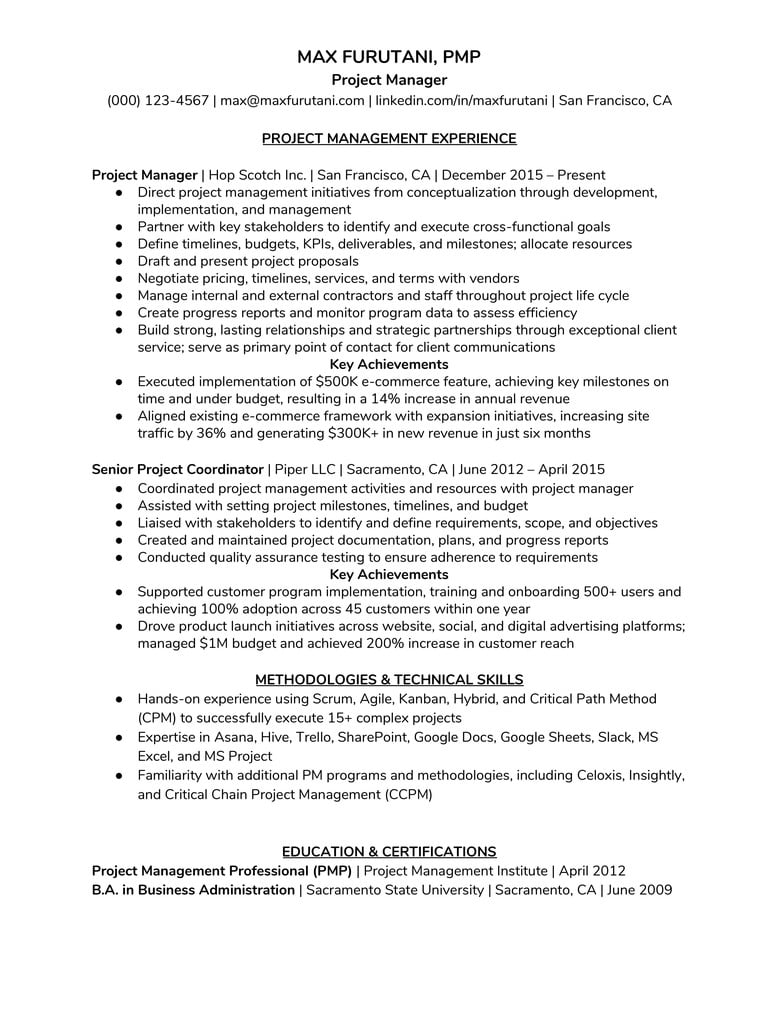
Download a sample project manager resume
As a project manager, you bring a diverse and valuable set of skills to the table. And that’s something to be very proud of! Ideally, your resume will tell a compelling story about your abilities and achievements—and help you to nab a hiring manager’s attention. Follow these tried-and-true guidelines and you’ll be well on your way to doing just that.
How to List Project Management Skills on a Resume: Best Skills and Examples
Quick Navigation:
What are project management skills?
Best project management skills.
- How to highlight project management skills on a resume
- How to highlight project management skills on a cover letter
Project management skills are a requirement for any individual wishing to fill a project management role within an organization. Knowing how to effectively highlight your project management skills on your resume may improve your chances of getting noticed by employers and increase the likelihood of landing a job interview for a project management position. In this article, you can learn more about project management skills along with some tips for listing the best project management skills on your resume.
Project management skills are skills that are considered necessary to effectively manage projects within the workplace and refer to any abilities that support the role of a project manager. These skills are relevant to almost every industry and can be applied in various project management-related roles. Most project management skills are soft skills that help a project manager succeed in planning, overseeing and executing projects within an organization.
Project managers must know how to not only manage various projects within the workplace but also deal with any issues or challenges as well as keep everyone on the project team on task. These professionals may develop programs, launch products, construct worksites and various other tasks that require a number of skills to successfully complete.
Related: 10 Best Skills to Include on a Resume
There are several different types of project management skills that you can hone to become a better project manager. The more you practice these skills, the more likely you are to succeed in a project management position.
The following are a few of the most important project management skills:
The ability to lead a team and keep each member motivated and engaged is vital to the success of any project’s successful progression. Good leaders are able to coach and supervise employees, resolve potential conflicts and keep everyone on track to ensure delivery of excellent quality work. As a project manager, you will need to be proficient in running team meetings and setting the agenda, conducting performance reviews, assigning promotions and incentives as well as additional duties related to your team as necessary.
Read more: Leadership Skills: Definitions and Examples
The skill of management has many components. To begin, management skills relate to the various ways you successfully manage team members, resources, clients and/or stakeholders. This skill set also includes the ability to set goals and evaluate the performance of your team and provide suggestions for improvement when needed.
Project managers are ultimately responsible for making sure the project stays within budget. They must develop a detailed budget for all aspects of the project and constantly make sure that those funds are being utilized as planned.
The ability to schedule effectively is a core project management skill. Without proper, responsive scheduling, project deadlines cannot be met. Employers need to know that you can and will deliver projects on time and keep costs where they should be.
Organization and planning
There are many aspects to the skill of successful planning. Organization is key to a project being completed on time and meeting or exceeding expectations. Activities must be arranged and the project manager must remain on top of all the details of various systems and processes. When conveying your organization and planning skills on your resume, you should demonstrate that you have an effective time management system and provide examples of how your planning has led to successful project completion.
How to highlight project management skills on a resume
The following are tips that you can use when highlighting your project management skills on your resume:
1. First, decide where you will highlight your project management skills
You can highlight your project management skills in a number of ways on your resume. You can include these skills in the resume objective or summary, in your skills section, in the descriptions of your employment history or in all three areas.
Example: ‘Experienced project manager with six years of experience managing teams in a number of industries. Excellent leadership, management and budgeting skills that have enabled the successful completion of multiple projects.’
2. Second, use project management skills when indicating work duties
When referencing your project management skills in your employment history, you could describe your accomplishments and incorporate the project management skills that helped you for each, rather than simply listing out the job duties.
Example: ‘Developed a new management program that saved $5,000 in monthly operation costs and enabled project teams to successfully meet all deadlines.’
3. Lastly, be as specific as possible
When describing your project management skills on your resume, be as specific as possible and show results when possible with numbers or percentages. You can also use a skills section to highlight additional project management skills that were not mentioned in other areas on your resume but that are important for a particular position.
How to highlight project management skills on a cover letter
The following are tips to keep in mind when highlighting your project management skills in a cover letter:
1. First, choose one or two skills to highlight
When including project management skills on your cover letter, try to select one or two primary skills that have been listed as requirements in the job description. The skills you list on your cover letter should be specific to each job position that you are applying for.
2. Next, be specific and use a real-life example
Include specific examples that demonstrate how your project management skills have made you a successful project manager.
Example: ‘During my previous job position at XYZ Company, I managed a number of the organization’s projects including the development of a new software system. For this project, I developed a management system that enabled team members to update their progress in real-time for constant motivation and recognition. As a result, we completed the project a week early and saved $5,000 on the overall project costs.’
In this example, the project management skills of leadership and management have been clearly highlighted through a real-life example. This allows employers to get a clear idea of how you have successfully produced results within a project manager position as well as demonstrates your skills in context.
3. Lastly, use keywords from the job posting
When writing about your project management skills on your cover letter, be sure to include several keywords that have been listed as the job qualifications for the position you are applying for. This will show the employer that you not only have the skills needed but that you were paying attention when reading about the job.
Jobscan > Resume Examples > Project Management Resume Examples, Skills, and Keywords > Project Manager Resume Examples, Skills, and Keywords
Project Manager Resume Examples, Skills, and Keywords
A project manager position will allow you to showcase your leadership skills as you work for a wide variety of industries. If this sounds like you would like to do, land your dream job with these optimized project manager resume examples.
Jobscan users have been hired by:
Project manager resume sample
Project managers are efficient and organized with excellent communication and leadership skills. They enjoy planning all sorts of activities, have no problem making decisions on their own, and thrive under pressure. If these skills define you, they will help you thrive at any stage of your project management career path. Showcase them on a tailor-made project manager resume and catch the eye of any recruiter out there.
If finding a new project management job is something you’ve been thinking about for a while but haven’t exactly found the motivation to do, this is your cue. But before you take the leap, you must prepare a bulletproof resume that’ll guarantee your success . Being a type “A” person, you’re probably ahead of us and have most of it covered by now. However, let us give you some helpful tips to increase your chances of getting hired.
Take note. We’re about to show you one of our best project manager resume samples. If you follow it as closely as you can, there’s a pretty big chance your career path is about to change for the better.
New York City, New York 10001 • (555) 555-1234 • [email protected] • linkedin.com/in/mindy-castello
PROJECT MANAGER
Excellence-driven professional with 25+ years’ experience increasing efficiency, productivity, and revenue while effectively managing projects of all sizes. With a keen eye for detail and a disciplined approach to execution, excels at driving projects through to completion based on milestones and top-notch communication.
Project Management | Resource Coordination | Process Improvement | Strategic Planning Vendor Relationship Management | Contract Negotiations | Procurement & Purchasing | Reporting Cross-Functional Leadership | Team Building | People Management | Complex Communications | Windows | MS Office (Word, Excel, Outlook, PowerPoint, Access) | OneNote | MS SharePoint | Lync | EBuy | Concur | Catalyst | Accenture | Kronos | TMS | InfoServe | Adobe CS | Plan Grid | BlueBeam | CORE
Drive development, implementation, training, and support of the enterprise project management methodology. Lead large cross functional teams in the deployment of enterprise-wide projects and programs. Direct multiple projects as project manager, leading a team of internal staff and external vendors in delivering business solutions.
- Create project plans to fit stakeholder and customer needs and deliver with-in budget on desired outcomes; full accountability for project results
- Define project roles and responsibilities in close collaboration with the Customer, including project scope and objectives to ensure a cross-functional understanding amongst project members
- Perform project tracking through clear and concise status reports and time management reports; proactively identify potential issues and track project member progress against commitments
- Learn from recent projects to identify and recommend improvements, cost saving initiatives, and substitutions to positively impact current and future project budget or schedule
Led project management on commercial furniture installation and design projects for key accounts. Engaged directly with clients to define scope and requirements, identify risks/issues, and offer effective solutions.
- Designed and articulated the all-encompassing strategy for clients with the aim to deliver realized results
- Managed deliverables from 3rd-party vendors and conducted site visits to coordinate product delivery logistics
- Served as the tactical point of contact for clients regarding project planning, timeline forecasting, organizing deliverables, relaying meeting minutes, and driving client projects forward
- Planned resources and assisted in training staff and consistently developing the talent pipeline • Achieved high levels of satisfaction by skillfully coordinating competing priorities and devising and executing strategies to meet schedules, budgets, and on-site logistics requirements
Contracted with a premier Fortune 100 company client. Recognized as a deeply embedded team member fully integrated into corporate culture with a talent for identifying and remedying obstacles to project success. • Provided high-level support to the PM Team on all areas including proposal review, purchase/change orders, job site inspections, and client delivery requirements
- Ensured on-time attainment of metrics and objectives for successful project delivery by coordinating with client-side external, internal, and executive-level teams, as well as vendors and contractors
- Propelled cost control and managed budget/fiscal spend details and approved payments • Collaborated cross-functionally with numerous teams across the organization and coordinated logistics, communications, and reporting; tracked metrics and results
- Professional Certificate: Spencer Business and Technical Institute
- Leadership Breakthrough: Rapport Leadership
- Interpersonal And Communication Skills: Dale Carnegie
Resume written by Lezlie Garr
Why this resume works
Project manager resume, skills, and keywords
Most recruitment offices and HHRR departments use applicant tracking systems (ATS) to find the perfect fit. You might be wondering, “What does an ATS do?” It works like a search engine that responds to the resume keywords . So when you’re perfecting and personalizing your project manager resume, make sure to include the resume skills you know recruiters are on the hunt for.
The first step to building your best resume yet is identifying your strengths and using your project manager skills in your favor. If you’re still unsure which skills companies are looking for in a project manager candidate, check out this list.
Top Project Manager Resume Skills
- Project planning
- Team management
- Goal setting
- Relevant technical skills
- Proofreading
- Negotiation
- Organization
- Schedule planning
- Prioritization
- Budget management
- Critical thinking
- Attention to detail
- Report development
- Tech savviness
- Proactivity
- Resourcefulness
- Perseverance
- High motivation
- Communication
- Sense of urgency
- Consistency
- Conflict management
- Adaptability
5 project manager resume writing tips
Once you’ve identified the most coveted project manager resume skills, writing a fabulous resume should come easy. Keep it short, simple, and follow the recipe for success with these handy resume tips.
1. Tailor your resume to each job.
Don’t take the easy way out by building a one-size-fits-all resume. That path will hardly lead you anywhere. Your project management resume needs to showcase that you’re cut for every aspect of the job. That’s why you want to make sure to keep it clean and only include your most relevant project management projects to date. It’s also helpful to highlight the main skills that helped you carry out your responsibilities as a project manager in your previous positions.
Put in a little extra effort and customize your resume based on the position and the company you’re applying for . This small action will make a huge difference and skyrocket your chances of getting an interview. By creating a resume that feels even slightly more personal, your prospective new boss will know you’re serious about your search.
2. Showcase the metrics behind your most significant achievements .
Most people write their resumes the exact same way. They type in a bunch of entries and simply specify their past few positions, employment dates, and responsibilities. While this method is not wrong, you could do something different. What better way to get your prospective employer’s attention than flaunting the skills they might hire you for.
Include measurable results for your primary job duties and responsibilities. That way, you’ll creatively display your achievements. Remember to begin each bullet point with a compelling verb for a more dominant narrative.
3. Use an ATS-friendly resume template.
If you’re still creating a mailing list of prospective employers and sending them all the same resume, you’re taking the wrong approach to project management job seeking. If you want recruiters to notice you, you must remember ATS plays a massive role in the selection process. That’s why you want to keep your application ATS-friendly by using the right project management keywords.
If you’re unsure what an ATS-appropriate resume should look like, you can find many online templates to help you figure it out. The process of getting your project manager resume ATS-ready might seem daunting for recent grads and senior project managers alike. However, using the right tools will stop you from overthinking and help you get the work done.
4. Keep your grammar spot on.
Good writing will make you look more professional and educated. It will cause your future team and clients to take you much more seriously. But we’re jumping ahead of ourselves. Using proper grammar and syntax while writing your resume and cover letter will leave an excellent impression on the recruiting team. It’s the fastest way to impress them.
5. Avoid keyword stuffing .
With all this keyword optimization craze, now more than ever, all job seekers want to enhance their resumes massively. Who doesn’t want a better chance at getting noticed by their dream employer? However, things aren’t that simple.
If you lie on your resume, you’re setting yourself up for failure. Depending on the severity of your lie, you might even be jeopardizing your new position. The truth always comes out, and losing your employer’s trust may damage your career beyond repair. The best approach is always to remain faithful to what you know and what you’ve accomplished.
Build an ATS-friendly resume for free
Many resume builders are advertised as free, but they often charge a fee to download your resume. Jobscan's online resume builder has no hidden costs and it’s ATS-compatible.

Optimize your resume


- Share on Twitter
- Share on LinkedIn
- Share on Facebook
- Share on Pinterest
- Share through Email
21 Project Management Skills You Need For Your Resume In 2024
The hard and soft project management skills required to be successful in this role are rapidly evolving. Discover and learn how to develop the PM skills required in 2024 to lead better teams and deliver more successful projects.

Project management is transforming quickly and drastically. Advancements in technology (looking at you, AI) and the evolution of project management tools, methodologies, frameworks, and best practices contribute to a similar change in the project management skills required to deliver successful projects.
In 2024, simply having hard project management skills is not enough. You need well developed soft skills and personal and professional traits. Where you're missing these skills, it's important to upskill yourself through project management training .
This is the definitive list of essential project management skills that are “in” right now and how you can best develop them to propel you along your project management career (or launch it!).
What Are Project Management Skills?
Project management skills are the capabilities and competencies that project managers need to have (and be good at) in order to do their jobs well and ensure their projects are successful. Common project management skills include project planning, requirements gathering, and risk management.
Complete Project Management Skills List
These are the hard and soft project management skills you’ll learn about in this article so you can add them to your resume and learn how to be an (even more) awesome project manager.
| Hard Skills | Soft Skills | Traits |
|---|---|---|
| Ordered | ||
| Visionary | ||
| Detail-oriented | ||
| Team-oriented | ||
| Cautiously Optimistic | ||
| Tenacious | ||
| Adaptable | ||
| Decisive | ||
| Responsible | ||
| Strong Work Ethic | ||
We've broken down these project management skills into hard skills, soft skills, and traits.
Click on any item within the skills list to understand what it is and how to develop it. You’ll also get a deep understanding of why they matter, and I’ll cover plenty of examples of when you’ll use them along the way.
Might I add: this is also the raison d’être for DPM Membership and the DPM School . Because having practical know-how and support to implement the skill set is really important!
11 Project Management Hard Skills
The hard skills of project management are all about competence, and speak to your practical technical ability: they are the tools, techniques, and methodologies you can apply.
Hard skills can be thought of as expert knowledge on how to operate that machine or make something work technically. You can do or make something. There are straightforward steps you follow that work. If you’re new to project management, hard skills are easiest to learn.
Hard Project Management Skills List
- Reading, Writing & Arithmetic
- Process Management
- Project Initiation
- Project Planning
- Project Scheduling
- Documentation
- Task Management
- Project Control
- Risk Management
- PM Tool Knowledge
- Technical Skills
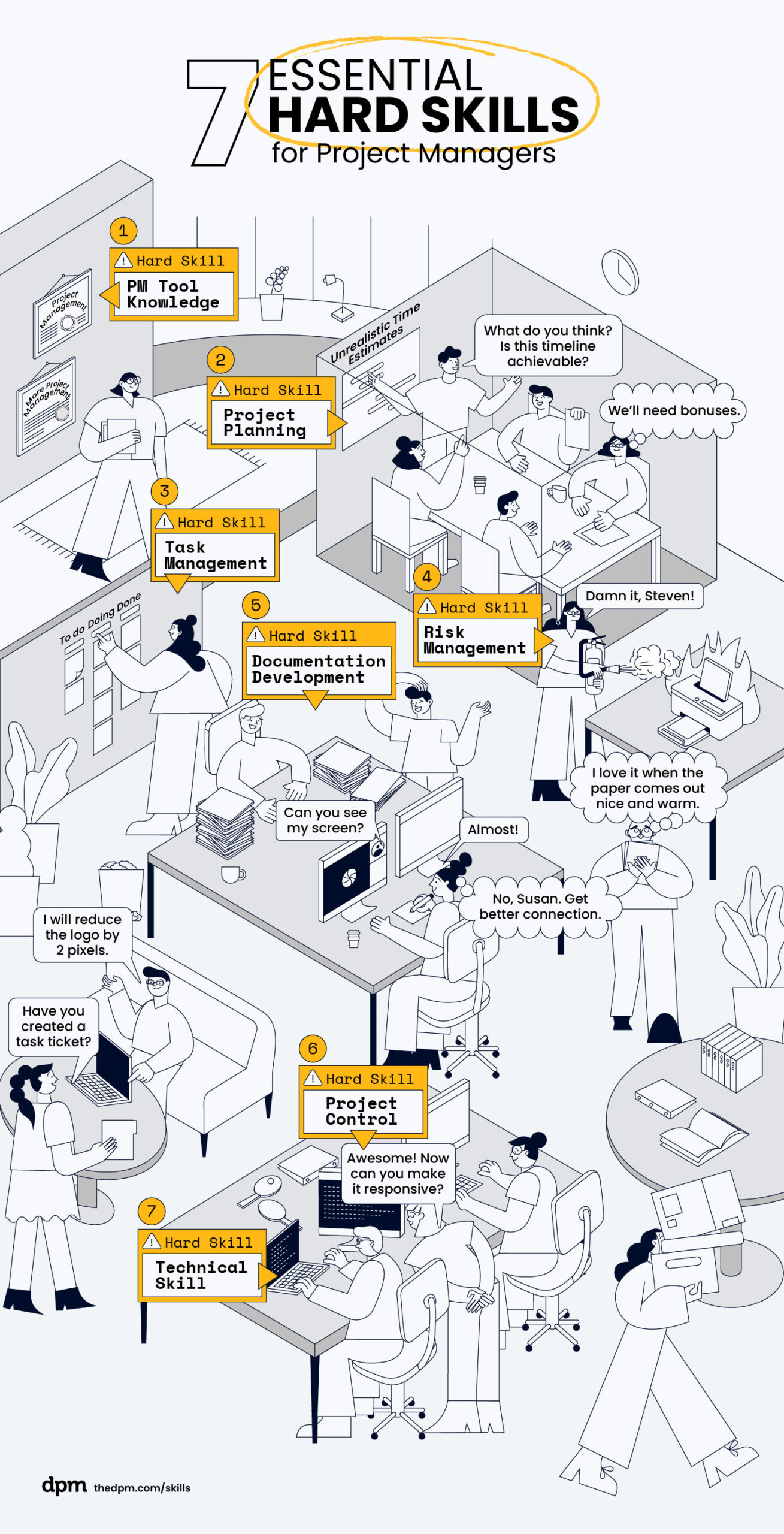
1. Reading, Writing & Arithmetic
Any good project manager needs to be able to employ and activate quick, accurate, and clear reading, writing, and math skills .
- Can you read a proposal and immediately comprehend the technical or legal issues present in the text?
- Can you write a solid project brief that any team can understand and run with?
- Can you verify budget and expense math, catching errors before they become a bigger problem?
Reading, writing and arithmetic are hard skills that are repeatedly taught to us throughout grade school and even post-secondary. However, as we become adults these skills can stagnate if you don’t push yourself to use them regularly.
How To Develop Reading, Writing & Arithmetic
- Read often—you can read anything, just to keep your skill sharp—but I’d recommend any of these books for project managers . Even just 30 minutes of reading per day goes a long way to keeping that part of your brain exercised.
- Hone your writing. Invest in a program like Grammarly , which gives you customized feedback on your tone along with typical corrections for spelling, grammar, and wordiness. You can also check out these 5 tips for better writing .
- Practice basic arithmetic with apps like BBC Teach or Khan Academy . Nobody expects you to memorize advanced trigonometry equations, but it’s useful to know basic addition and subtraction and be able to puzzle out harder multiplication and division problems.
Return to the list of project management skills.
2. Process Management
Process management is the ability to map vital and control processes within a project ecosystem .
What are your most vital company and project management processes? For many, business processes include the likes of:
- Project launch
- Project delivery
- Reviews, reporting, and evaluations
Process management, then, is a way to catalog all of these processes, get a birds-eye-view of it all, and circulate knowledge about each item as needed. By its very nature, process management requires the balancing of a lot of spinning plates. Excelling in process management is a surefire way to stand out as a project manager, but it can be quite a daunting task.
How To Develop Process Management Skills
- There are plenty of process management training certifications that you can invest in. Consider night courses or a work-at-your-own-pace program that doesn’t interfere with your workday.
3. Project Initiation
Project initiation involves ensuring everyone's aligned on vision and approach , and it’s critical to starting projects effectively.
Before there can be a project, someone has to take the first step—be that a pitch, a formal project initiation document , a plan, a kickoff, a discovery session, or even simply being curious enough to notice an area of the business that could use some improvement.
As a project manager, initiating a project will often fall to you. It is to your benefit to learn how to instigate them and how to get them started on the right foot.
There are multiple sub-skills involved in initiating projects:
- Getting buy-in and alignment from the team and all stakeholders
- Setting up the project tools and documents
- Gathering or assigning the right resources
- Communicating a project vision to the right people
How To Develop Project Initiation Skills
- First, teach yourself how to write a stand-out project proposal . This is a big part in getting your ideas moving. Knowing how to build out an exemplary project proposal is going to teach you the basics of project initiation, namely the ability to identify a problem and then offer a solution that you are best equipped to handle.
- Next, learn how to kick off projects —how to plan for, lead, and follow up on a project kickoff meeting —so the project starts with the highest chance of success. There’s an entire workshop on mastering project kickoffs in DPM Membership .
- Learn more about which resource management skills to build up.
4. Project Planning
Project planning involves setting a course through the project that meets its objectives and adheres to its constraints . It spans both the meta and the micro.
There’s the large scale obvious planning we need to create things like meeting plans, statements of work , project estimates , timelines, resource plans, and briefs. There’s also the more mundane: planning out your day, who you’re going to talk to first, and how you are going to make time to keep your status documents up to date.
The extent to which you’re able to effectively plan will directly impact the project’s ability to be successful. No matter how good you are at executing, without a proper project plan , the project won’t succeed. Remember that you need to plan for both success and disaster, and that there’s always an element of trial-and-error when it comes to planning. Never be afraid to fail and learn.
How To Develop Project Planning Skills
- There is no one single way to do planning. Diversify your learning by consuming different materials and seeing what different experts have to say.
- To accompany the guide, there are templates and filled-in project plan samples available in DPM Membership .
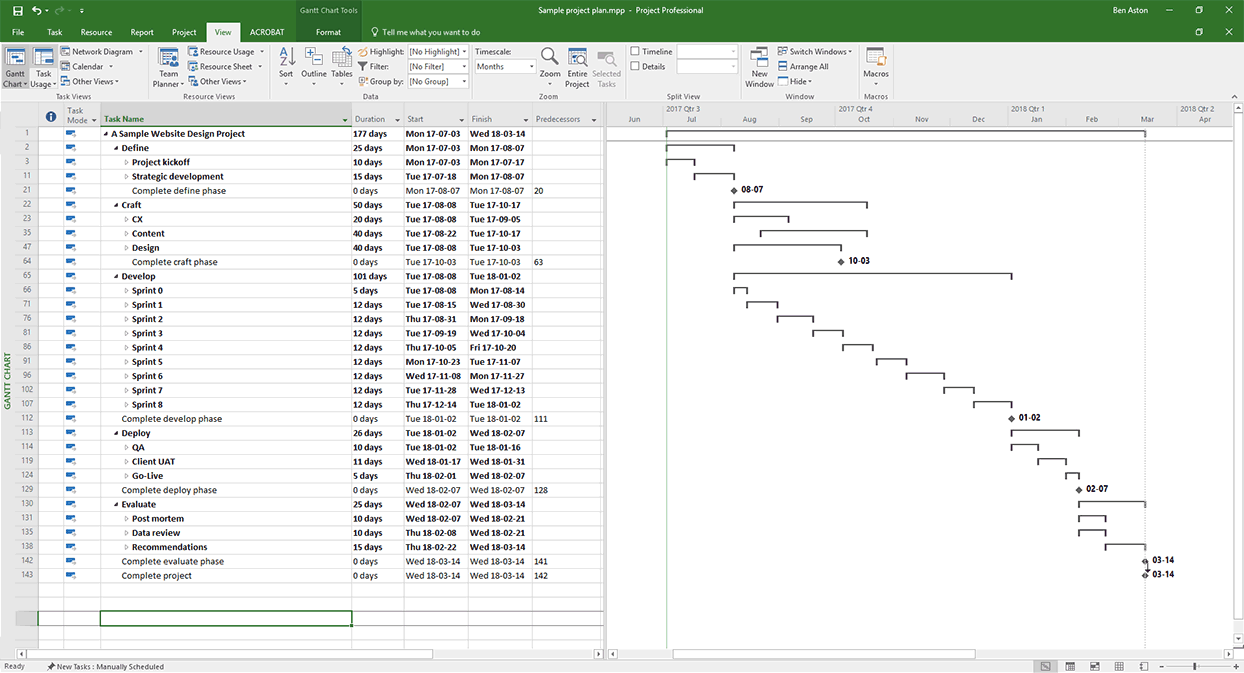
5. Scheduling
Project scheduling is the ability to sequence the right people on your project at the right time .
This means building out a calendar that indicates who is doing what, and when. This could be a work breakdown structure in Excel, a Gantt chart in your project scheduling tool of choice, a dedicated project management calendar , or any other form of project schedule.
Project managers are responsible for determining project milestones, indicating when things need to be done, and what tasks are dependent on others, as well as who is representing your team at different hours, on different days, across different tasks and deliverables. You’ll need to account for all roles, tasks, and responsibilities when dividing up work amongst the project team.
Honing this skill will help you avoid common scheduling pitfalls, like last-minute adjustments, staff confusion, “clopen” shifts, and out-of-hand overtime/on-call practices.
How To Develop Scheduling Skills
- One of the best things you can do to learn the skill of project scheduling is to study your preferred project management methodology (whether it's waterfall or agile) and learn what “scheduling” means in that context.
6. Documentation Development
Project managers are often responsible for creating documentation for things like costs, timeline, scope, stakeholders, and the contract .
Documentation involves recording your process so that it can be accessed, checked, and repeated by others. For a PM, knowing HOW to do proper documentation is only half the battle—you must also know how much documentation is needed, to prevent excessive time and energy output.
The Manifesto for Agile Software Development states a preference for “working software over comprehensive documentation.” What does that mean? Well, documentation is needed, but don’t go overboard. A functional product is always the top priority.

Sign up for the DPM newsletter to get expert insights, tips, and other helpful content that will help you get projects across the finish line on time and under budget.
- Your email *
- Yes, I want to sign up to receive regular emails filled with tips, expert insights, and more to build my PM practice.
- By submitting this form, you agree to receive our newsletter and occasional emails related to The Digital Project Manager. You can unsubscribe at any time. For more details, please review our Privacy Policy . We're protected by reCAPTCHA and the Google Privacy Policy and Terms of Service apply.
- Email This field is for validation purposes and should be left unchanged.
How To Develop Documentation Development Skills
- Use other people’s project documents to help you save time and use best practices without having to figure everything out the hard way. There are plenty of templates, charts, agendas, checklists, and the like in DPM Membership .
- If you’re totally new to project documentation you’ll be better off with training like The DPM School , which can help you learn when, why, and how to fill out the most important project documents.
Return to the list of project management skills .
7. Task Management
Task management involves scheduling, monitoring, and assessing project progress and quality of tasks so work flows smoothly.
Making lists, using text editors, using tools like Kanban boards, spreadsheet building, team-based approaches, and even simple pen-and-paper are all forms of task management.
Excellent task management can boost productivity, reduce errors, and keep everyone up-to-date, so it’s up to the project manager to use the best task management approach for the situation.
A lot of task management is trial-and-error. It's also having a willingness to scale to a more comprehensive solution if you are finding your current task management systems are becoming inadequate.
How To Develop Task Management Skills
- Don’t invest too much money into learning task management. It’s a skill that is nebulous and will change day-to-day as your project needs change. Work on this skill through simple practice and enhance your knowledge with free tutorials and guides to give you deeper insights.
- There are plenty of free resources that you can rely on to sharpen your tasking skills, including our own guide to task management here .
8. Project Control
Project control involves monitoring and managing critical aspects of the project such as cost, schedule, scope, and stakeholders .
It’s a project manager’s job to keep their project(s) from going over budget and over schedule. Almost every project will test these imposed limitations. Scope creep , unexpected bumps in the road, and other entanglements will try to push the boundaries of these time and cost constraints.
Project control involves gleaning data and analytics from your project tracking tools or project dashboard in order to predict and influence the financial and time expenditures required for a particular project.
Once limitations have been confirmed, it’s a project manager’s job to make sure things don’t run out of control on their way to completion.
Any project manager knows that no project is ever 100% complete. There is always more to do, more to build, more to finetune. Proper controls help to establish limitations around a project so that it doesn’t end up in developmental limbo.
How To Develop Project Control Skills
- A great resource is the DPM Podcast episode, Coloring In The Project Lines , which features Maik Stettner talking about his personal experience with delivering on budget, hitting timelines, and other areas of project control .
Return to the list of project management skills
9. Risk Management
Risk management is the process of identifying, evaluating, and mitigating against project snafus .
The skill for effective risk management is really experience—it’s knowing what could go wrong and having the humility to ask for your team’s input. The earlier you identify risks, the better your chances of avoiding the risk occurrence.
Risk identification must be followed by a risk plan that outlines how you’ll address them. This involves assigning a probability, a cost, and an owner, and using mitigation strategies that are suitable for the risk and the appetite of the client for things going wrong.
Whether you do these activities in a dedicated risk management tool or in a simple spreadsheet, RAID log , or risk register , the skill to master is the ability to identify risks well before they become issues and come up with effective mitigation plans to nullify the risk of them ever becoming issues.
How To Develop Risk Management Skills
- Rely on other people’s experiences and learn from their mistakes (and from their successes). Glean knowledge from the best-of-the-best and use their mistakes as lessons to fuel your own learning.
- There are plenty of books on risk management, which is a safe way to hone your practical skills before testing them out in the workplace. You can start with Fundamentals of Risk Management by Paul Hopkins or Implementing Enterprise Risk Management by James Lam.
10. Project Management Tool Knowledge
General knowledge of how project management tools work is useful, but there is no “one right project management tool”—you need the skills to learn them all.
A project manager can only do so much with their own two hands. That’s why it’s important for them to have a toolkit of software backing them up. There is a project management tool for every task, work style, team structure, and department need.
Over a quarter of survey participants from the Project Success Survey named “the use of project management tools” as a key component to project success. Software tools are not only useful for relieving an administrative workload burden, but they are a critical component to success.
How To Develop Your Skills In Using PM Tools
- There is no one-size-fits-all to learn the intricacies of every project management tool in existence. Instead, you are going to want to hone in on: what problem you need to solve, what tool can best do that, and how to best use that tool.
- If you want to understand the types of tools at your disposal, check out some of my favorites and get a deeper look at the project management software listed here.
11. Technical Skills
Technical skills include things like basic wireframing, copy, design, & coding , which can allow you to manage more effectively.
The number of technical skills a project manager brings to the table can elevate them from average to expert in a heartbeat.
- Can you wireframe a product using different techniques?
- Do you have basic design skills?
- Do you read or develop code at all?
These are some of the most valuable hard skills because they are tangible. If you know C++ or HTML5, you can easily prove it with a practical demonstration. However, these skills can also be incredibly difficult to master.
As a project manager, you will most likely be a jack-of-all-trades with a specialty in one or two items. A good practice to have is: make sure you have at least two unique and intersecting skills. That way, you stand out as a niche specialist that people who need your expertise cannot do without.
It’s up to you to decide how much guidance you need, how much of an expert you want to become, and how many technical skills you want to adopt.
How To Develop Technical Skills
Of course, technical project management skills can be learned online with:
- Myriad free resources, like these free coding resources
- Casual paid courses, like this Wireframe Overview on LinkedIn Learning, for example
- Traditional college/university courses, like the Computer Sciences program at the California Institute of Technology
10 Project Management Soft Skills
Soft skills (sometimes known as interpersonal skills) comprise other personal and professional skills. They’re soft because there aren't any specific steps to follow or a "correct" way to do them.
It requires intellectual engagement and personal interaction. These are harder to learn because they're developed through experience. These are also exceedingly valuable because machines and AI cannot recreate their effects.
Soft Project Management Skills List
- Organization
- Prioritization
- Critical Thinking
- Communication
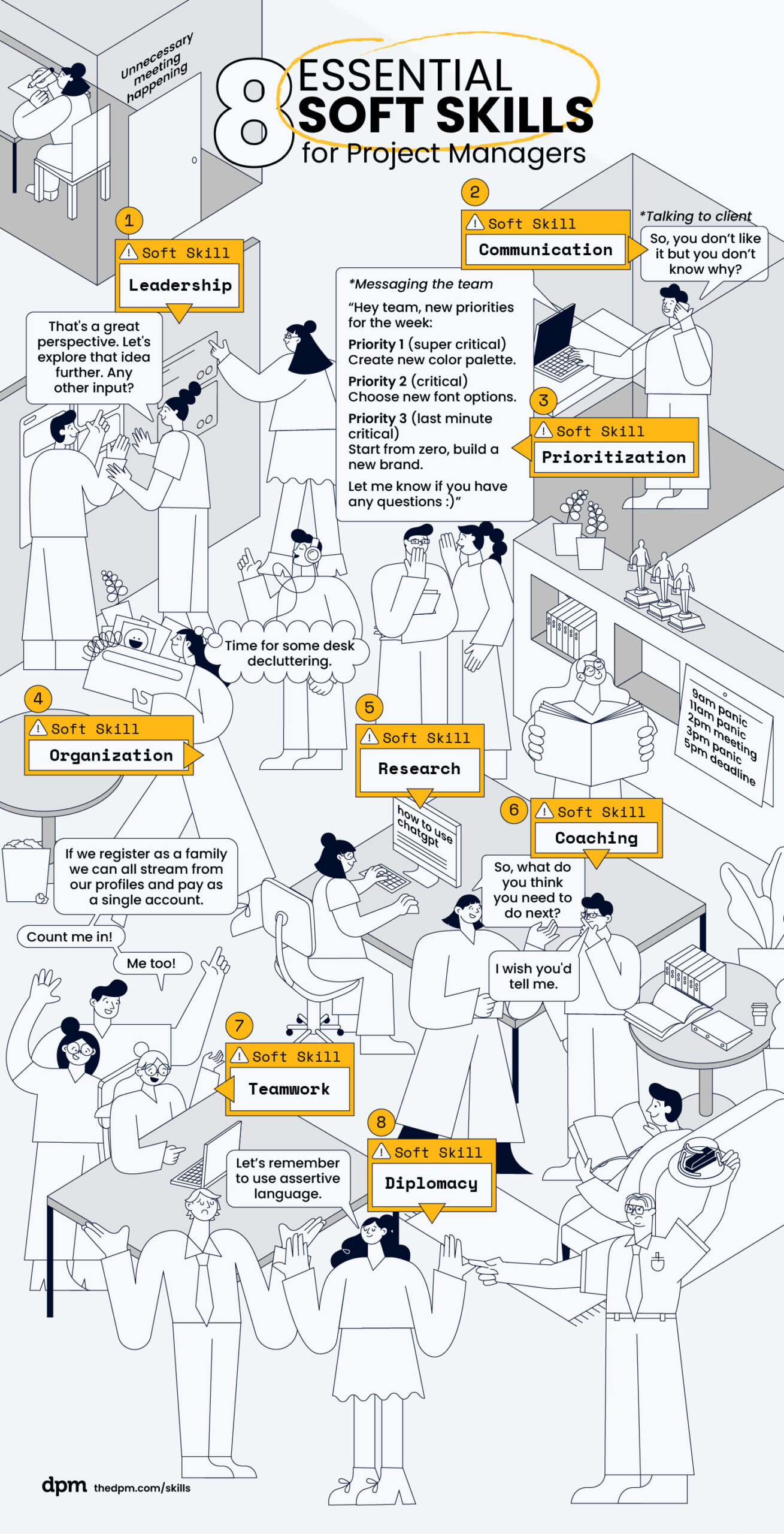
1. Organization
Organization means bringing order to chaos, sorting things out, and staying on top of everything .
Whether you are mapping out resources or turning a messy project proposal into gold, organization is THE defining characteristic of a great project manager. You simply cannot be without it.
Bad organization wreaks havoc on your team’s motivation, morale, and ability to get things done. A project manager with a personal organization strategy will get more done, feel less stressed, and be an admirable leader.
Then, the hardest part: organizing your task list, team, thoughts, tools, workflow, errands, habits, and all the rest, while maintaining adaptability when the plan changes.
How To Develop Organization Skills
- There are whole communities dedicated to different organizational strategies. Just think about how wildly popular Marie Kondo’s “ tidying up ” self-help strategy became, with a best-selling book and a Netflix show. Organization has become a religion at this point.
2. Teamwork
Teamwork is the ability to make team members work together and to motivate them effectively . It’s something a project manager must learn and teach simultaneously, as you must flexibly and reliably work with employees, clients, suppliers, external contracts, customers, and anyone else who shows up in your inbox each morning.
The positive impact of teamwork is supported by behavior science and psychology. Working together is proven to spark innovation, foster happiness and personal growth, prevent burnout, grow specialized skills, improve productivity, promote taking worthwhile risks, reduce feelings of stress, and boost creativity.
How To Develop Teamwork
There are two approaches I suggest to “learning” teamwork skills:
- Theoretical knowledge about what it means to work as a team and the benefits of navigating teamwork successfully. Try seeing what cutting-edge research is being done in the areas of teamwork. My current suggestion is The Science of Teamwork .
- Fun, in-person exercises you can do with your team to promote trust, understanding, and comfort. Try these team building activities !
3. Prioritization
Prioritization is the ability to do the right thing, at the right time .
As project managers, a huge part of our job is determining and communicating how other people will spend their time. But it’s equally important to be aware of our own time management.
Steven Covey’s quote, “The enemy of the best is good,” applies really well when it comes to the project manager’s management of time (theirs and their team’s).
The problem is that important tasks usually get trumped by urgent tasks. If needed, do an 80/20 analysis of your current tasks . So if you’ve got a limited amount of time in your day, how can you make sure you set aside time for important tasks?
Successful project managers also respect their teammates’ time, so being able to read the body language of people in the room is also critical to ensuring that you’re staying on course.
How To Develop Prioritization Skills
- Understand where you are putting your time. If you’re not already, use a simple time-tracking tool to help you tag and analyze where you’re spending your time. Is that where your priorities are? If you’re not sure, remember this quote: “What is important is seldom urgent and what is urgent is seldom important.” Dwight D. Eisenhower
- Important and Urgent (Highest priority)
- Important but Not Urgent
- Not Important but Urgent
- Not important and Not Urgent (Lowest priority)
4. Research
Research is the ability to effectively investigate and understand the big picture . Effective project managers need to know ‘just enough to be dangerous’ about all the work that their teams execute.
You need to know the platforms and systems your teams use, and the possibilities and limitations of those so that you can have intelligent and informed conversations with clients, team, project stakeholders, and suppliers.
It’s worth trying to develop expertise across the full project life cycle : strategy, service design, product design, creative concept, user experience, design, content development, front end development, back end development, QA, hosting, content delivery networks, SEO, analytics, CMS, social media, or media (yes even banner ads).
How To Develop Research Skills
- You can always trust libraries, particularly post-secondary libraries, as being a great source for research practices. For example, read the 15 Steps to Good Research by the Georgetown University Library.
5. Creativity
Creativity involves the ability to see things differently and approach things uniquely .
Creativity is one skill that computers and AI cannot match. Machines might be able to build, entertain, and perform but there is nothing that channels creativity the way humankind does. This makes it an invaluable skill.
How To Develop Creativity
- There are plenty of ways to boost your creativity, like changing up a habit, spending time outdoors, indulging in a hobby, experimenting with art supplies, or listening to (or creating) music.
- I would also highly recommend you check out the TEDxDirigo presentation by John Paul Caponigro called “ You’re A Lot More Creative Than You Think You Are .” Caponigro is a renowned fine artist who has worked for Photoshop User, Apple.com, and The Huffington Post.
- Read more about how you can get involved in creative strategy here .
6. Critical Thinking
Critical thinking allows you to decide what to do when there’s no obvious choice and tackle problems with confidence .
You’ve most likely heard of the term “critical thinking” but can you describe it? Do you know what it is and how to access the parts of your brain that excel in it? According to the Oxford Dictionary, critical thinking is “the objective analysis and evaluation of an issue in order to form a judgment.”
Oftentimes, project managers are confronted with conflicting data, mismatched ideas and facts, and flaws in common reasoning. Being able to pick apart what we see, think, hear, and feel to decide what is best for the current situation at hand is the linchpin in what it means to be a critical thinker.
There are 7 critical thinking skills, which I’ve broken down into their most basic essence:
- Analysis : What information is present?
- Interpretation : What does the information suggest?
- Inference : What conclusion can be drawn?
- Explanation : An elevator pitch for the above.
- Self-regulation : Could I be wrong about something?
- Open-mindedness : What are other possibilities?
- Problem-solving : What is the next move?
How To Develop Critical Thinking Skills
- Harvard Business Review suggests that 3 habits can help you improve your critical thinking: questioning all assumptions, finding reason through logic, and diversifying your thought by trying to see things from an opposing point of view.
- You may want to try these INC.com exercises for better critical thinking . Udemy also has critical thinking exercises as well as an online course to go with it.
7. Communication
Communication is the ability to understand and be understood by people from varying backgrounds .
One of the essential skills for project management is the ability to communicate well—understanding and being understood.
The key communication skill to master is the ability to listen, to be clear, and to ensure you’re understood. When information flows with the right messaging, at the right time, to the right person, through the right channel, almost any hurdle can be overcome.
However, effective communication doesn’t just happen. It starts by putting in the time and effort required to get to know your team well and devising an appropriate communication plan and related communications tools that connect with the different personality types. It’s easy to communicate well under ideal conditions with perfect communicators—but projects rarely benefit from ideal conditions, and no one is a perfect communicator.
You’ll likely need to adapt the communications strategy from project to project, for the simple reason that you may have different team members for each project and a particular communication system or structure may not always work for everyone.
How To Develop Communication Skills
- I’ve focused on teaching the skills of communication in many contexts, whether it’s in troubleshooting client complaints to solve conflicts (get practice for that in The DPM School) or handling difficult conversations better ( DPM Member webinar).
- But beyond these dedicated communication-strengthening activities, I have to say: just put yourself out there. Go to events, meet new people, leave your comfort zone, and network enthusiastically. Every conversation you have is going to teach you something about effective communication.
Watch our video covering tips on improving your communication skills here:

8. Leadership
Leadership involves seeing what could be, seeing the big picture, and leading and inspiring others .
Great leadership is an essential skill for being a good project manager. Our leadership role means we lead and manage teams—setting the vision, motivating the team, and making your team’s life better by coaching them and inspiring others.
But being a leader isn’t just about creating a feel-good vibe for our teams—we have to enforce process and keep everyone on the team in line too.
We know that we have the final call about what our team works on next, as well as the final responsibility for whether the project fails or succeeds.
Make sure you’re leading, rather than just managing. That means providing a vision and roadmap for success, and serving and empowering your team to get there.
How To Develop Leadership Skills
- Leadership is one of those things that takes time, experience, and consistent effort. No book or course is going to turn you into a leader overnight. No online course can hand you true leadership qualifications.
- To get started, I suggest looking for leadership-oriented seminars by speakers that you feel have something worthwhile to say. There are whole conferences dedicated to developing leadership skills , and that’s a good place to start.
9. Diplomacy
Diplomacy is the ability to influence, negotiate, and collaborate in tricky situations .
Project management is somewhat like politics; it brings together a disparate group of people, often with competing interests, and our job is to get these different interests on the same page so that we can accomplish project goals. In other words, a good project manager must be an excellent negotiator.
Discussions about budgets, resource allocation , and timelines can become adversarial and counterproductive if not handled tactfully. The best project managers know how to find compromises where possible and how to hold a firm line without damaging their workplace relationships.
The key negotiation skill to master is finding that middle ground—working out compromises so everyone that matters feel like they’ve won!
How To Develop Diplomacy Skills
- There are plenty of books on diplomacy, some more theoretical and others more practical. You can start with a classic, The Power of Tact by Peter Legge. This book goes over how to keep your cool in tough situations, conflict resolution strategies , negotiation tactics, and being a positive influence on those around you.
- You should also check out Public Diplomacy by Nicholas J. Cull, which goes over five core areas of public diplomacy: listening, advocacy, cultural diplomacy, exchanges, and international broadcasting. This book focuses its advice through a lens of international relations, communication studies, psychology, and contemporary practice and highlights what this all means in a time of “Global Engagement in the Digital Age.”
10. Coaching
Coaching is the ability to simplify and complexity, and to build, drive, and encourage the team .
Every PM is a coach in the way that they must bring out the best in their team and their product. Coaching is an inverted form of teaching where the goal is to help the subject learn rather than convey information.
Coaching is meant to focus on a person’s individual needs and talents, drawing out their full potential. This may involve offering positive feedback, establishing positive expectations, identifying room to grow, listening to concerns, and allowing (even encouraging) mistakes.
How To Develop Coaching Skills
- Try being coached yourself. Work with a mentor or professional life/career coach and take note of what they do and how they do it. Pay special attention to what works well and what falls flat.
- TheCoachingToolsCompany.com has a series of free tools that you can access, including exercises, common questions, a newsletter, and templates for goal setting and the like.
- You could also consider looking up career coaches in your city and bringing one of them into your workplace for an all-day coaching session with your staff. You can also follow professional coaches online if they have a blog, videos, or podcasts.
Is Project Management A Soft or Hard Skill?
Project management is both a soft skill and hard skill. It's difficult to manage a project without both kinds of skills because they are so complementary to one another.
Trying to use project management hard skills without accompanying soft project management skills like team leadership will be largely ineffective. You might be able to create a great project plan, but the project is doomed if you aren’t able to effectively organize and lead the team to execute on the plan.
Similarly, trying to use soft skills without the hard skills required to properly plan and control the project will also lead to failure. Hard, technical skills allow you to ensure project stakeholders are aligned on the objectives and outputs, and that the plan to deliver them is feasible within the budget and timeline.
6 Traits of Successful Project Managers
The above list of key project management skills misses out on a crucial part of being a PM: personal and professional traits. Traits are the foundation for soft skills and the way you execute the hard skills.
In fact, when I’m hiring for project management roles, what I’m actually primarily trying to establish is the candidate’s character traits. These are hard—if not impossible—to teach, but in my experience, they really do set good PMs apart from the bad.
How many of these traits do you embody and practice on a daily basis?
- Ordered : your sock drawer, and everyone else’s
- Visionary : see what could be, potential and opportunity
- Detail-oriented : spot the gaps and mistakes
- Team-oriented : empathetic, enjoy working and communicating with people
- Cautiously optimistic : always careful, but positive about it
- Tenacious : keep going when things don’t go to plan
- Adaptable : love problem solving and can be flexible
- Decisive : ability to assess, anticipate, and make difficult decisions
- Responsible : take ownership, look after, and take the weight off the team
- Strong work ethic : hard-working, hustler, self-motivated, and on time
How To Build These Successful Project Manager Traits
- Be honest with yourself : Ask for feedback from your colleagues and be open and accepting about what they share. Learn how to gently and productively critique yourself and remember that it’s never about fault, it’s about a desire to constantly improve.
- Be humble : Humility is the beginning of wisdom. In order to build your character, you must be open to new ways. No one can ever be too humble, though those who aren't are sure to think so.
- Live out your principles and values : Whether it’s “love others,” or ”do the right thing,” living by your principles will make decision-making easier and your character more steadfast.
- Be intentional : Integrity does not happen by accident. We are all products of our thoughts and habits. Be intentional about filling your mind with good thoughts. Creating a habit of this internalizes principles and breeds high character.
- Practice self-discipline : Being of high character takes the ability to do what is right over what is easy. After all, as John Wooden says , “The true test of a man’s character is what he does when no one is watching.”
- Be accountable : Surround yourself with people who have high expectations. Be responsible for yourself first. Lose the pride. Open yourself up to accountability. Let others push you to a high character.
6 Key Agile Project Management Skills
Agile project management requires all of the above, as well as a few unique items I wanted to call attention to which are particularly important to methodologies that fall under the agile umbrella, such as Scrum or Kanban .
Here are a few additional traits you can count on a good agile PM to have mastered:
1. Facilitation
Help people understand common objectives and their part in the bigger picture. Effective facilitators are able to make overarching goals feel understandable and achievable.
Learn more on how to do this in our workshop with Annie MacLeod (you'll need to be a member to access this workshop).
2. Problem-solving
The ability to navigate conflict, errors, and unexpected roadblocks with poise and purpose. If something unexpected arises, you keep your cool and set a good example for others.
3. Issue resolution or escalation
Knowing when it is appropriate to internally resolve issues and when intervention is needed. It’s important to grasp what resources are available for when escalation is deemed necessary.
4. Team building
Understanding the social intricacies of team management and properly providing guidance and encouragement. Make sure your team works well together, trusts one another, and feels satisfied as a unit.
5. Change management
Making natural and inevitable change within a business as easy, inclusive, and transparent as possible. No change, no matter how great, should disrupt your team to the extent they go into disarray.
6. Create the right environment
Know your “workplace culture” and make sure it aligns with your vision for the team and their work. Don’t let it become too strict or too casual and make sure everyone understands their freedoms and limitations.
How To Develop Your Project Management Skills Further
It might be getting more difficult to get a job as a PM , and just knowing what skills project management professionals need is not enough.
We must be knowledgeable and have the right tools; but critically, we must know how to apply the right techniques to our projects. Knowing theory without the skills to apply it is useless. Having the right tools without the practical skills to put them to good use is meaningless.
So, how should you go about improving your project management skills?
- Create a personal shortlist of skills you're missing. Include the technical skills you’d like to learn, as well as the soft skills and traits where you could develop further.
- Use your list to guide the development of your project management competencies.
- Take the DPM School course, Mastering Digital Project Management , to develop the hard and soft skills you need to succeed—the instinct, judgment, and leadership skills needed to deliver complex projects that revolve around people, pixels, and code.
- Join the vibrant DPM community where you'll discover even more ways to deepen and enhance your project management skills.
How To Become An Independent Project Management Consultant: 8 Steps
5 project management resume tips from an expert pm, jobs with purpose: my project management skills helped me build a career in sustainability.
- • Accelerated outbound sales cycle by 330% by designing and implementing customer acquisition platform for training and managing technical and IT teams
- • Established and curated strategic partnerships with 6 out of 10 top state manufacturing companies which resulted in $20M additional annual revenue
- • Led re-architect effort of a core SaaS product to reduce the platform deployment time for clients by 2 months
- • Lead a team of developers to build a proprietary CRM system for enterprise and its strategic partners, optimizing sales process and increasing sales revenue by 24%
- • Curated a $2M business implementation project that saves ~ $3.5M on operational inefficiencies between sales and development departments
- • Researched user behavior and led strategic product roadmap discussion across multi functional teams
- • Integrated Tableau reporting system into BI sales workflow, which led to 23% increase in post-meeting inquiries for technical sales department
- • Streamlined post-sales support to increase customer retention rate among enterprise clients by 27%
- • Acted as liaison between 3 country offices
- • Maintained and documented inventory of over 4,000 items
- • Led a team of 15 as a project manager, creating a trusting, respectful team in the process
- • Consistently ranked in the department's top 3 for completed tasks
- • Trained over 270 temporary remote workers
26 Project Manager Resume Examples & Guide for 2024
Your project manager resume must showcase an impeccable track record of completed projects. Highlight your ability to deliver within specified timelines and budgets. Demonstrate your leadership skills by detailing how you've successfully led diverse teams. Provide concrete examples of how your strategies improved project outcomes.

All resume examples in this guide
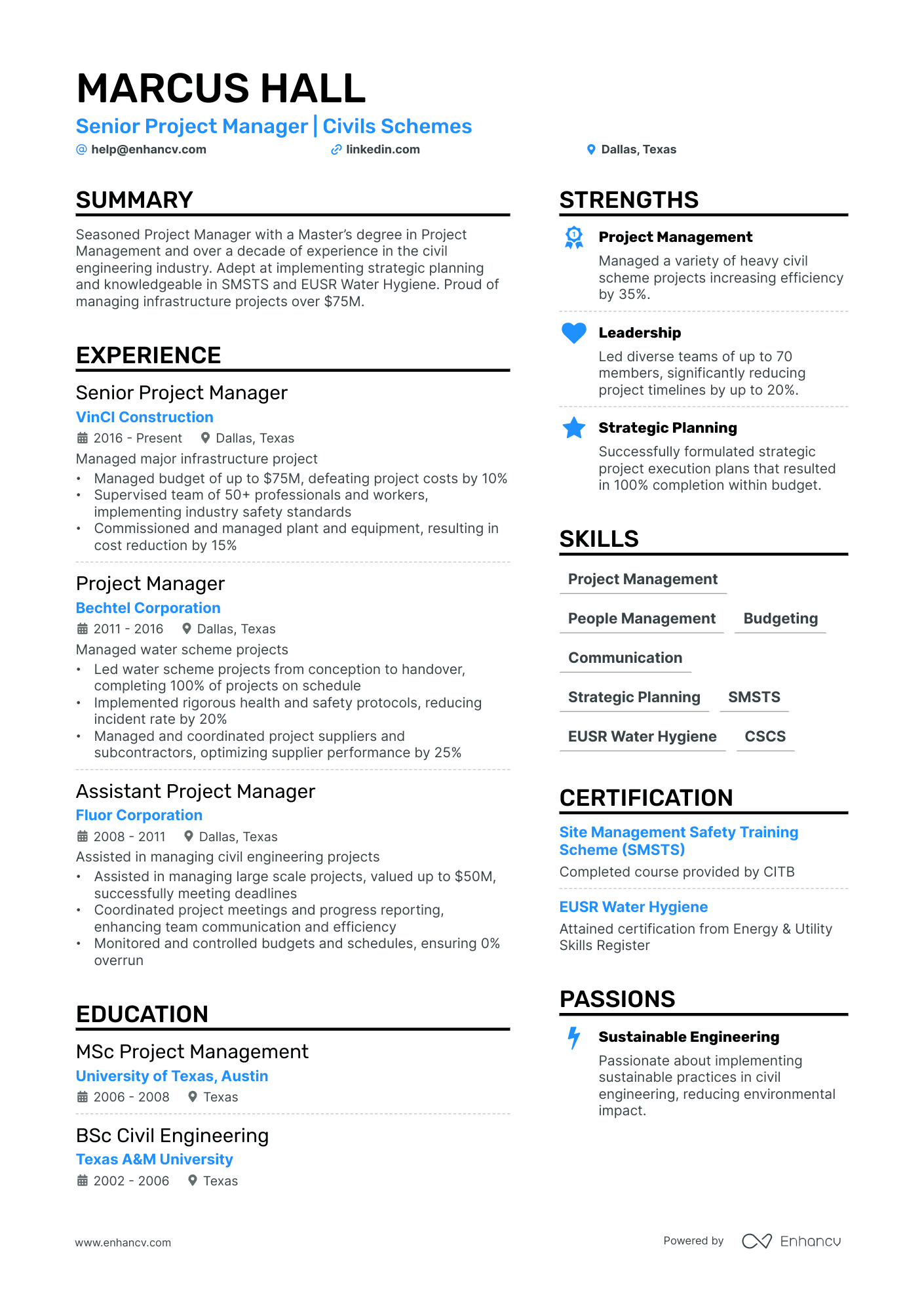
Senior Project Manager
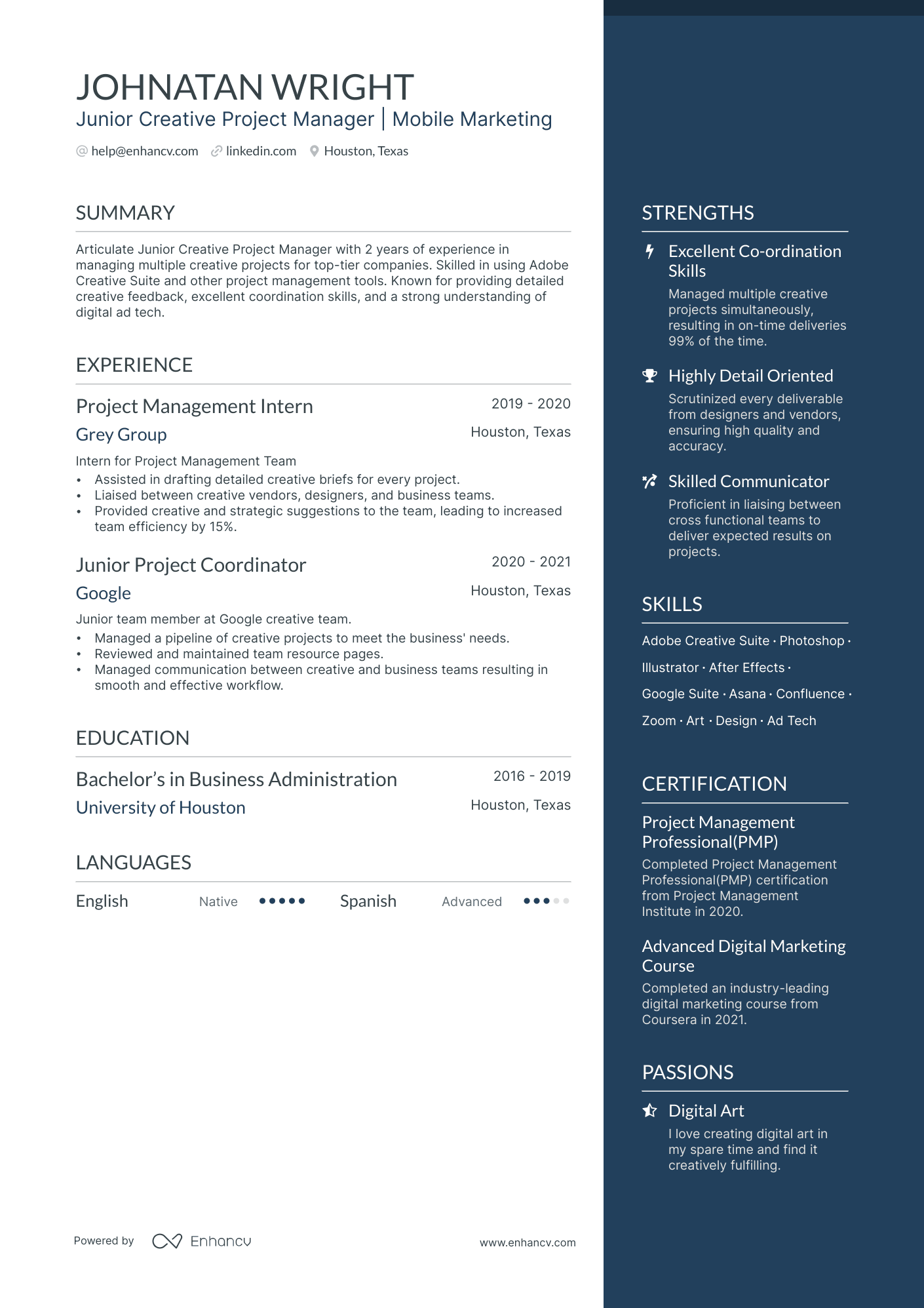
Junior Project Manager
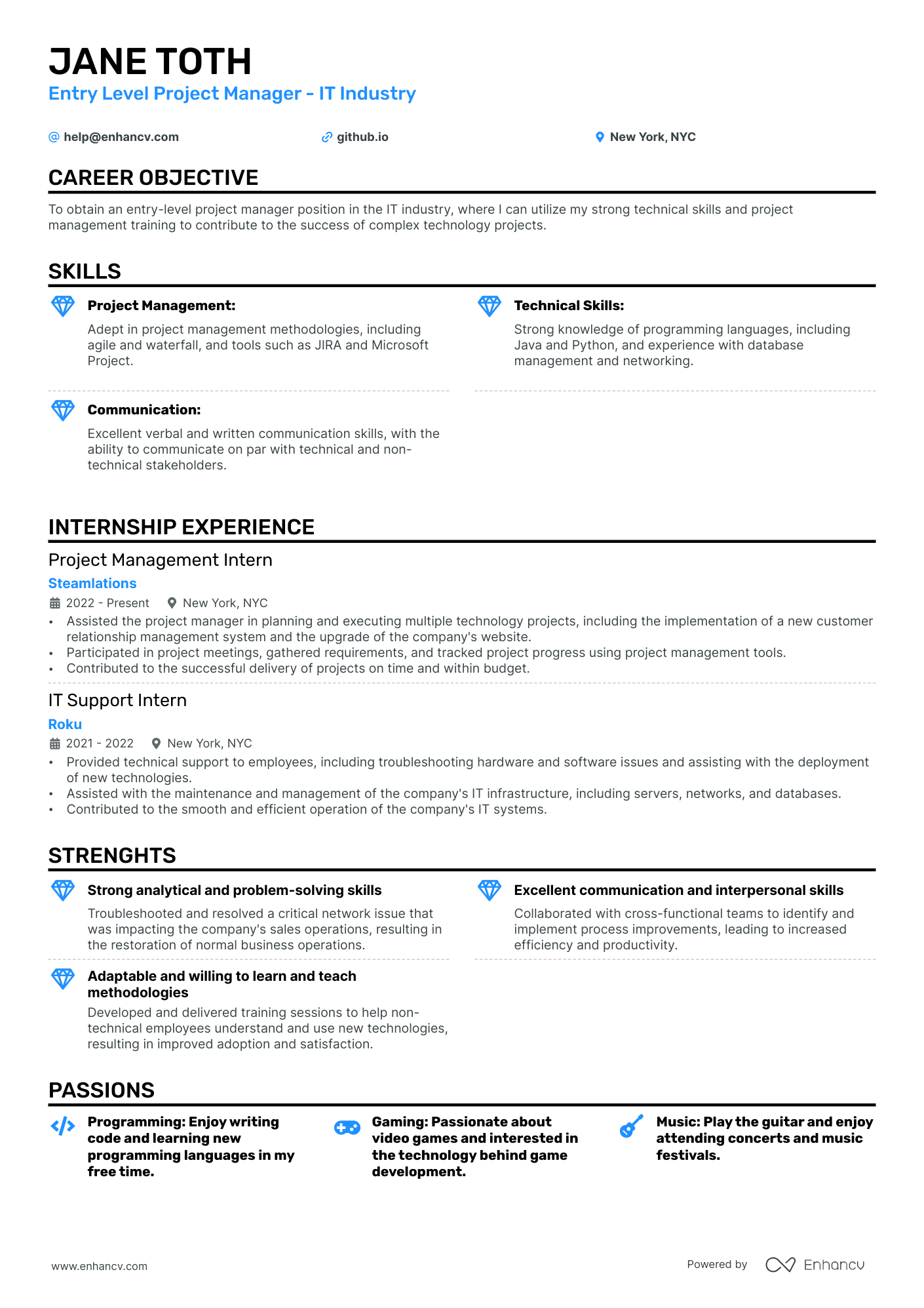
Entry Level Project Manager
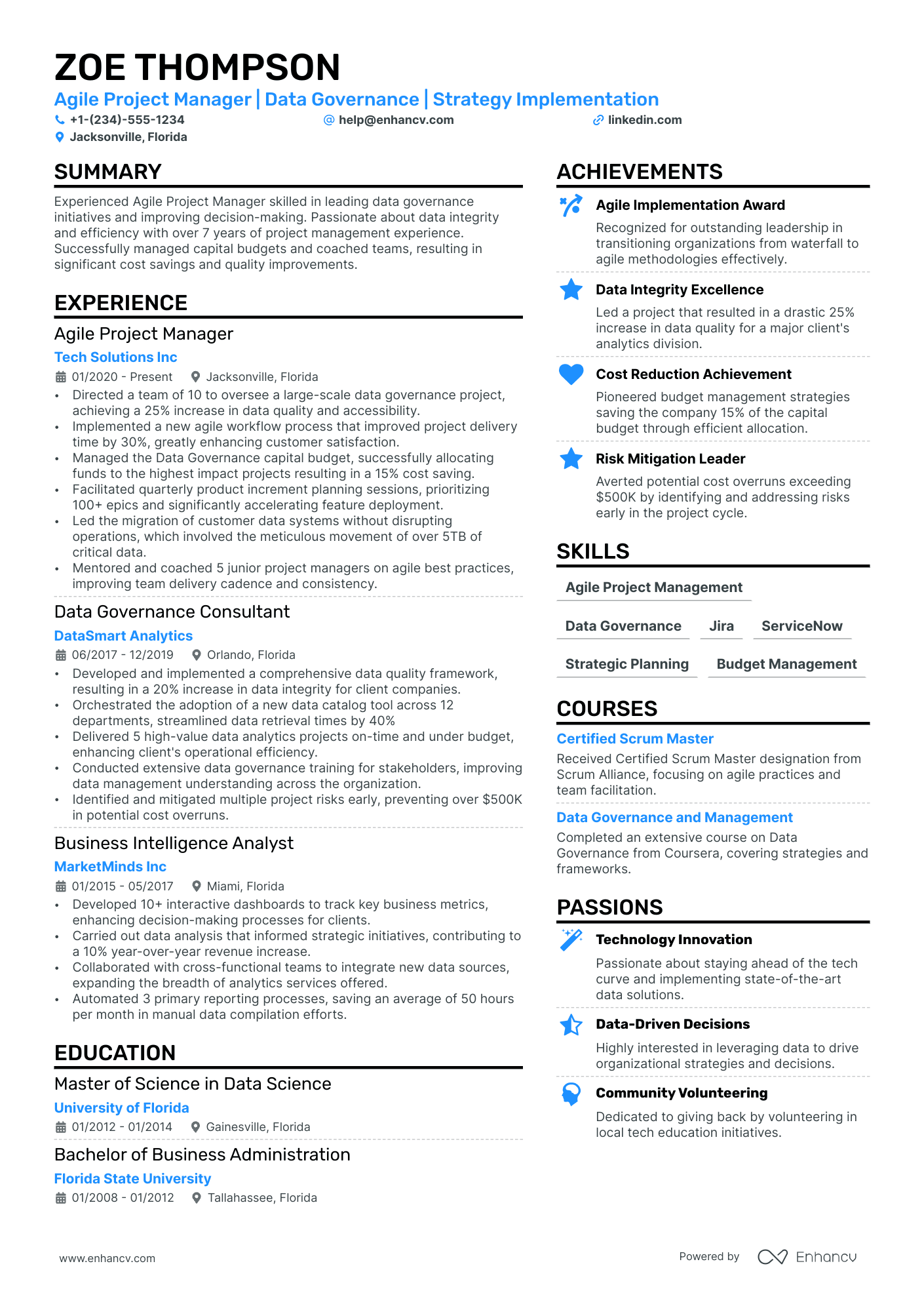
Agile Project Manager
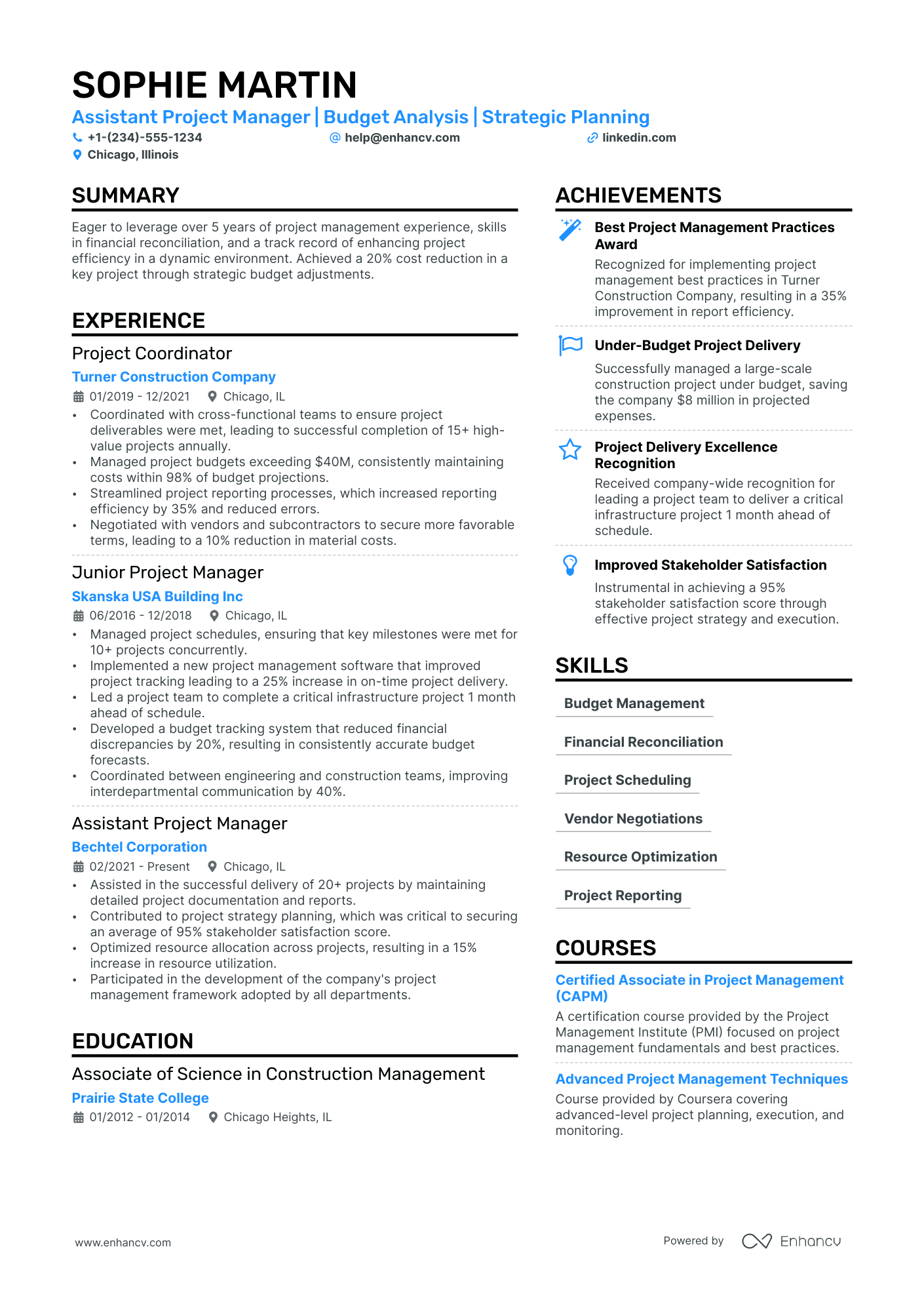
Assistant Project Manager
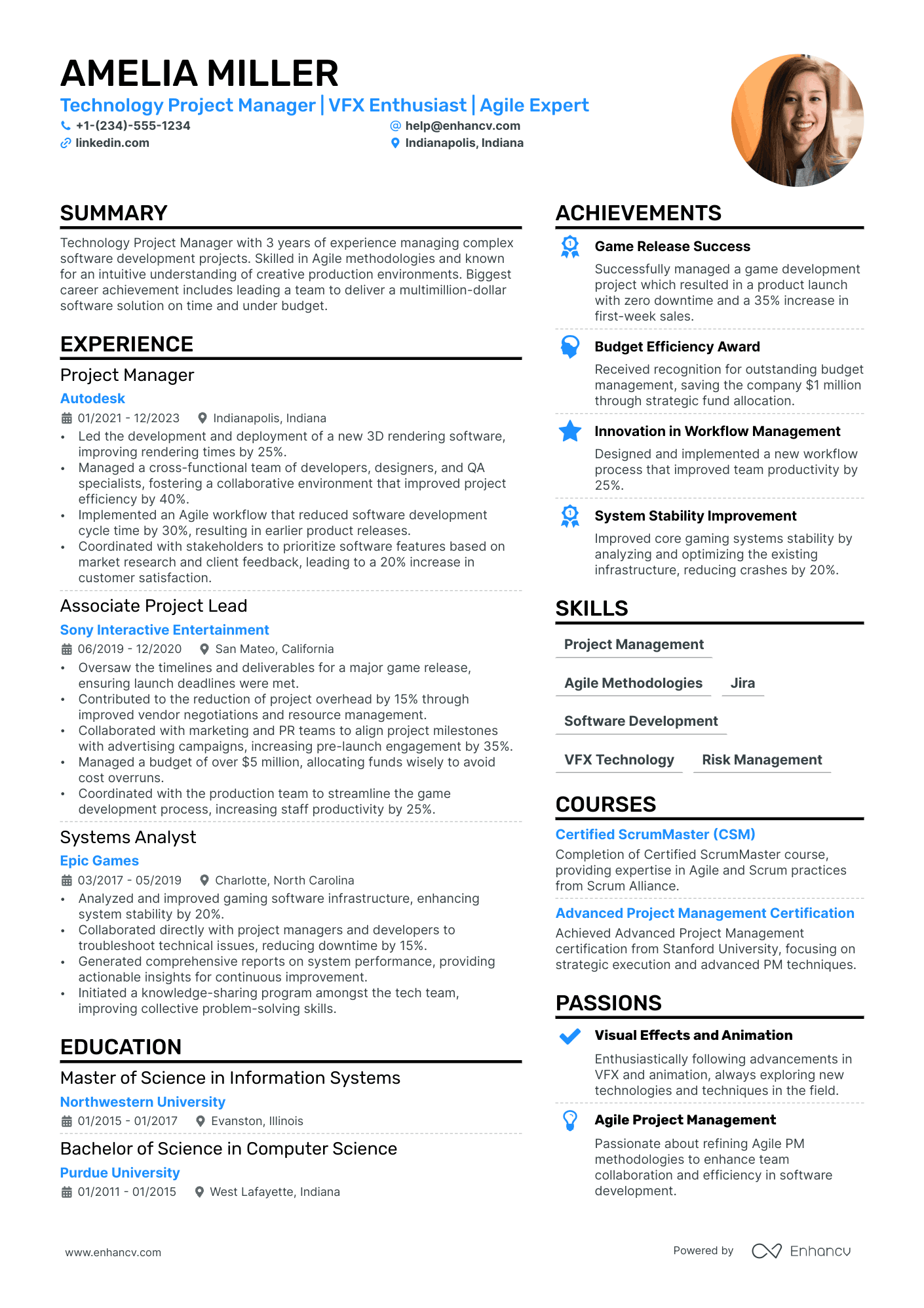
Associate Project Manager
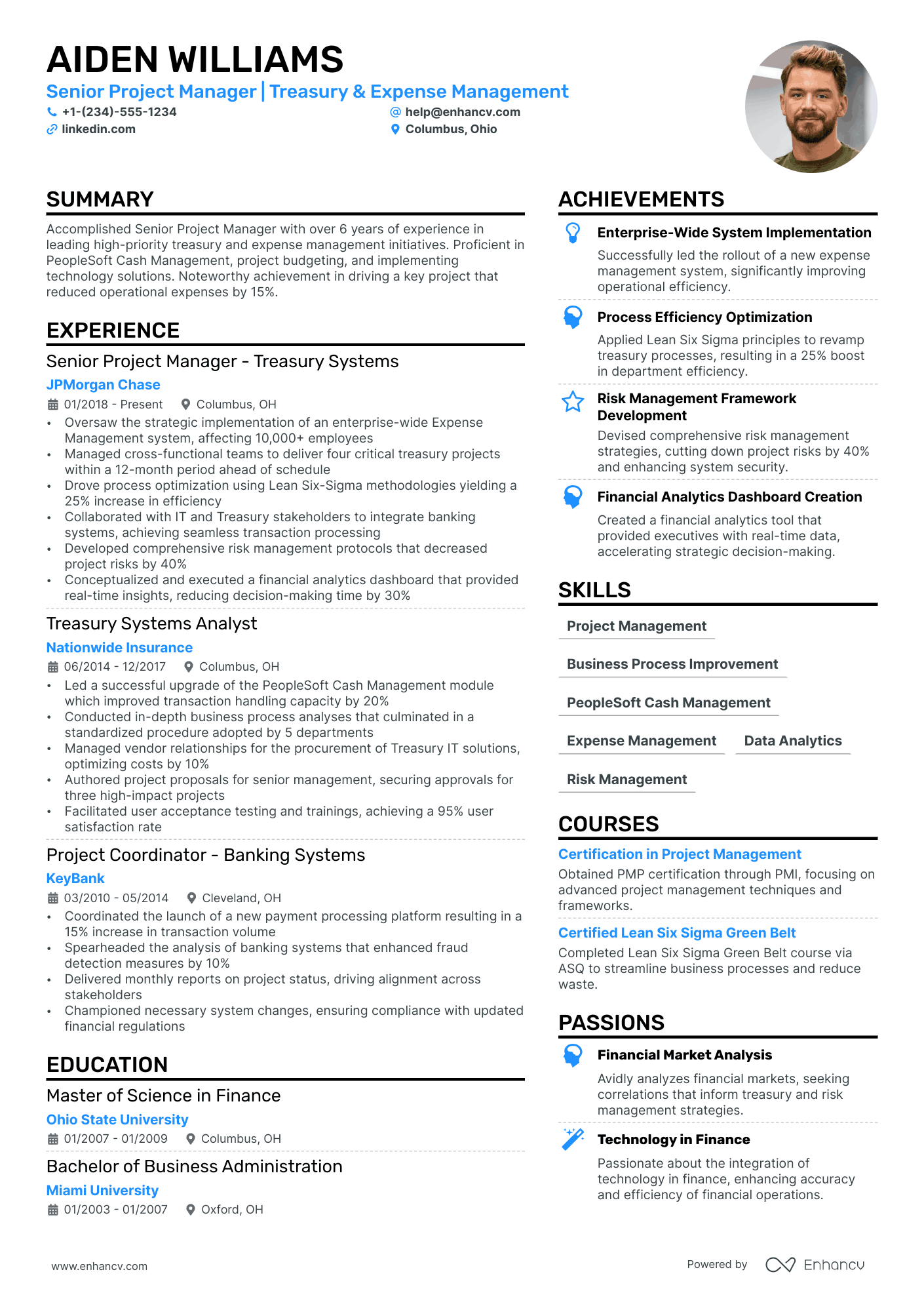
Business Project Manager
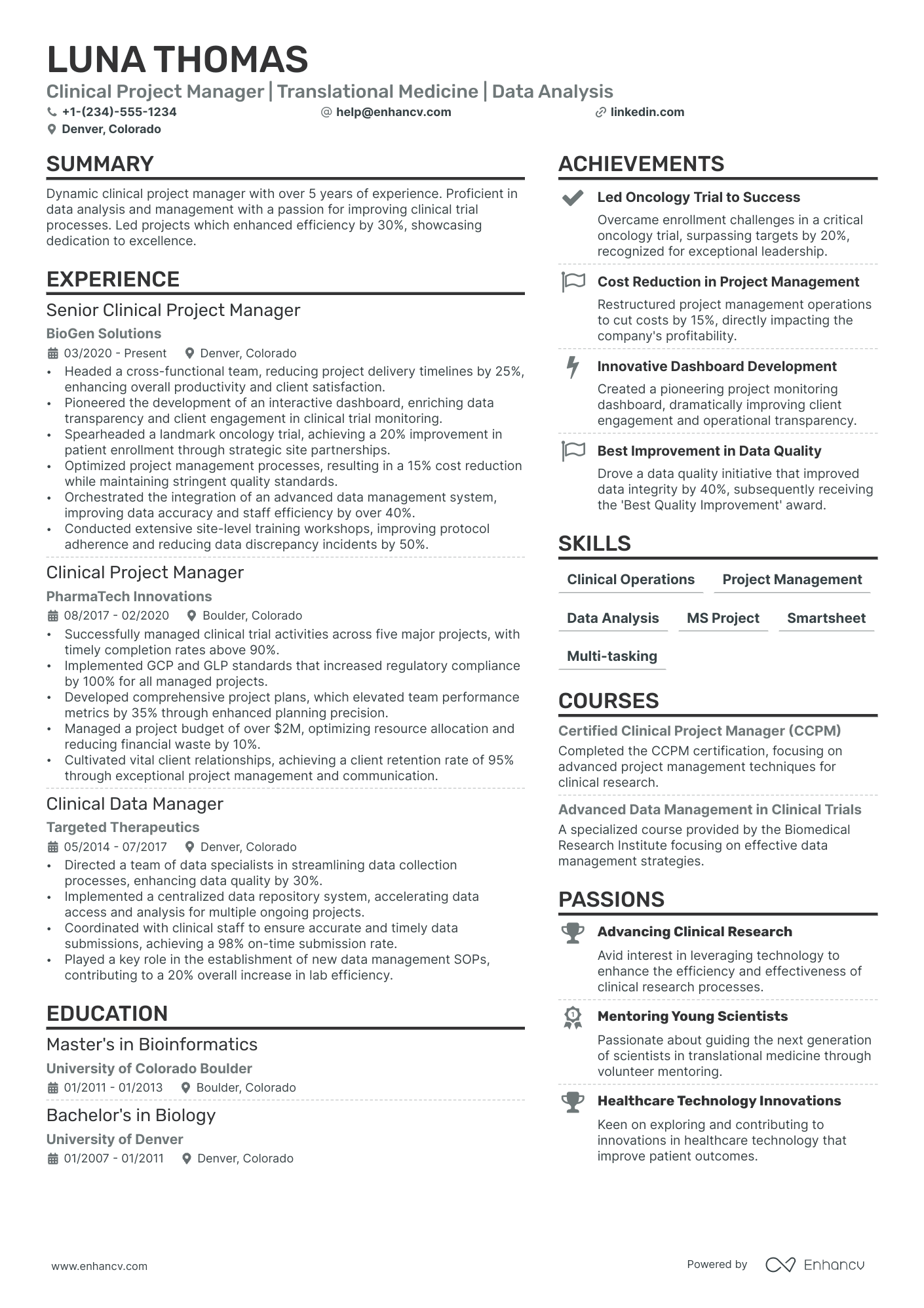
Clinical Project Manager
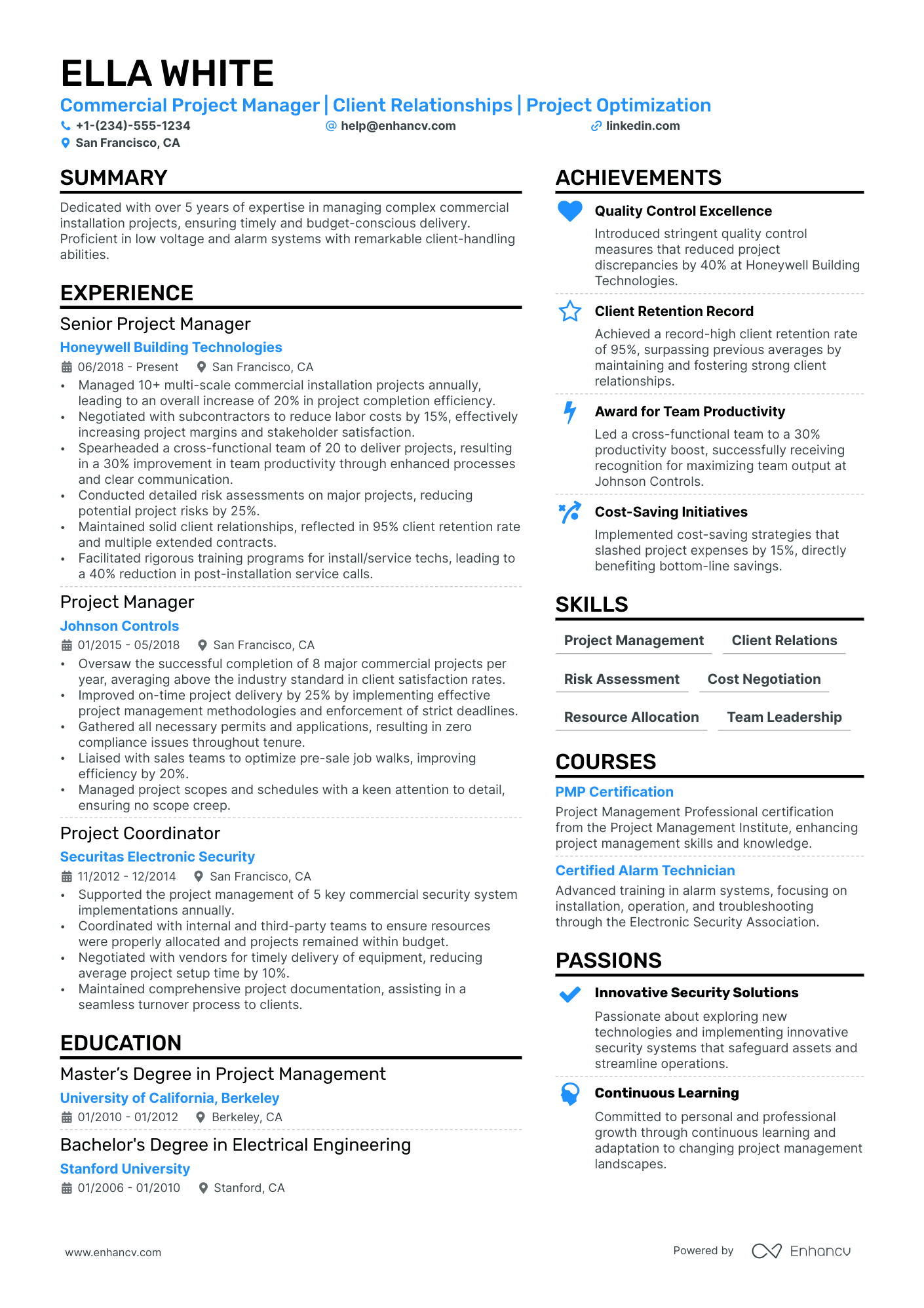
Commercial Project Manager
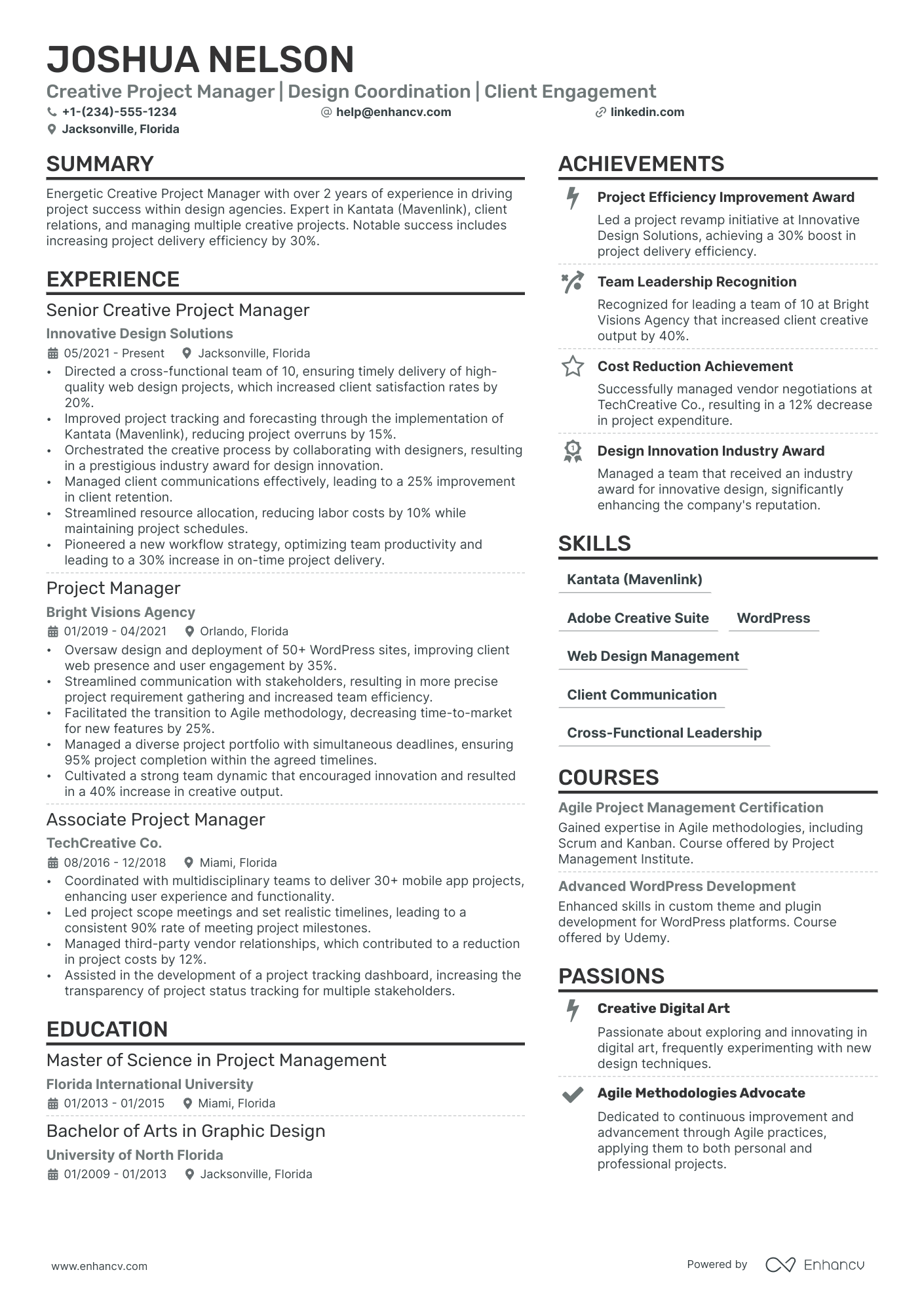
Creative Project Manager
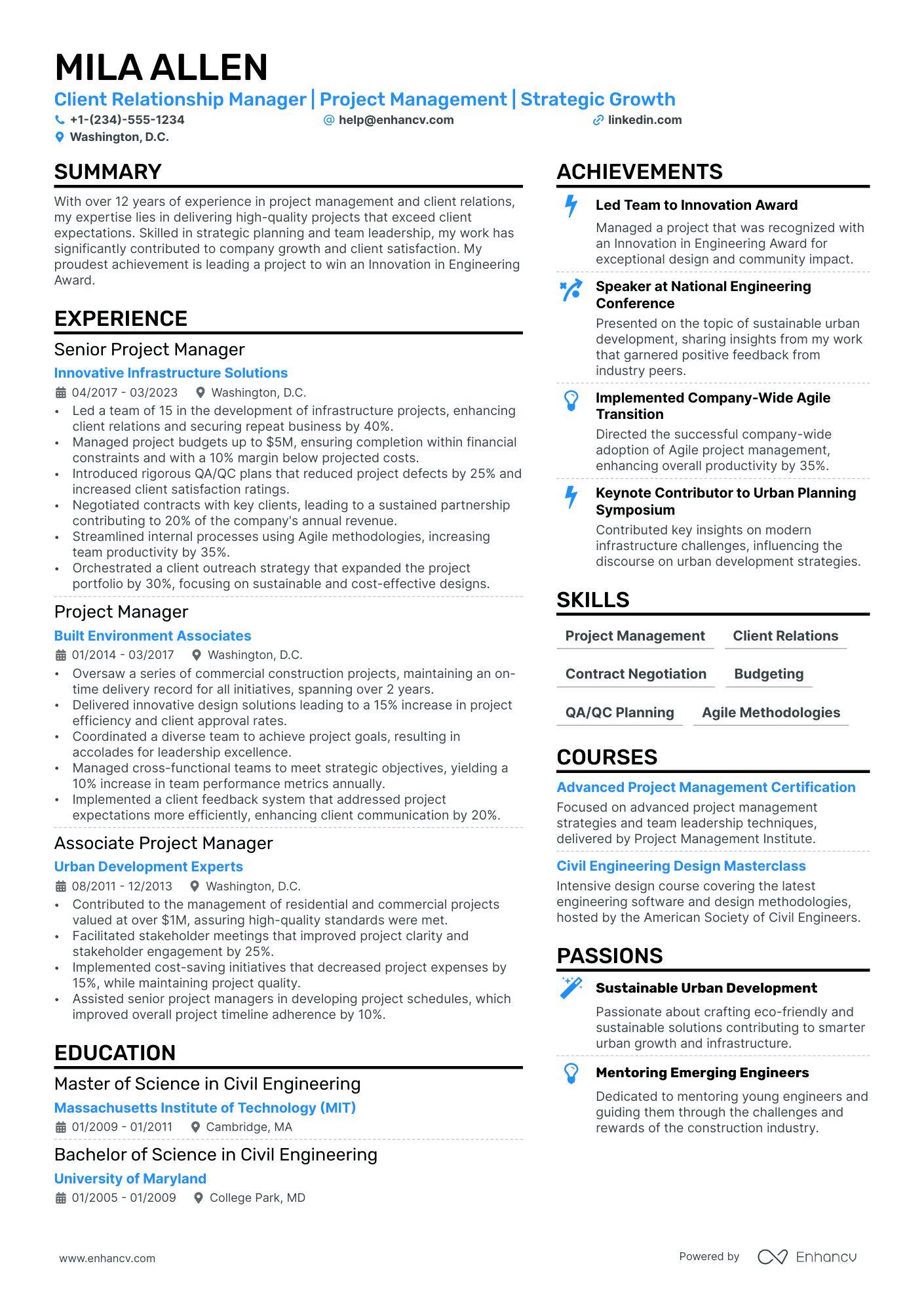
CRM Project Manager
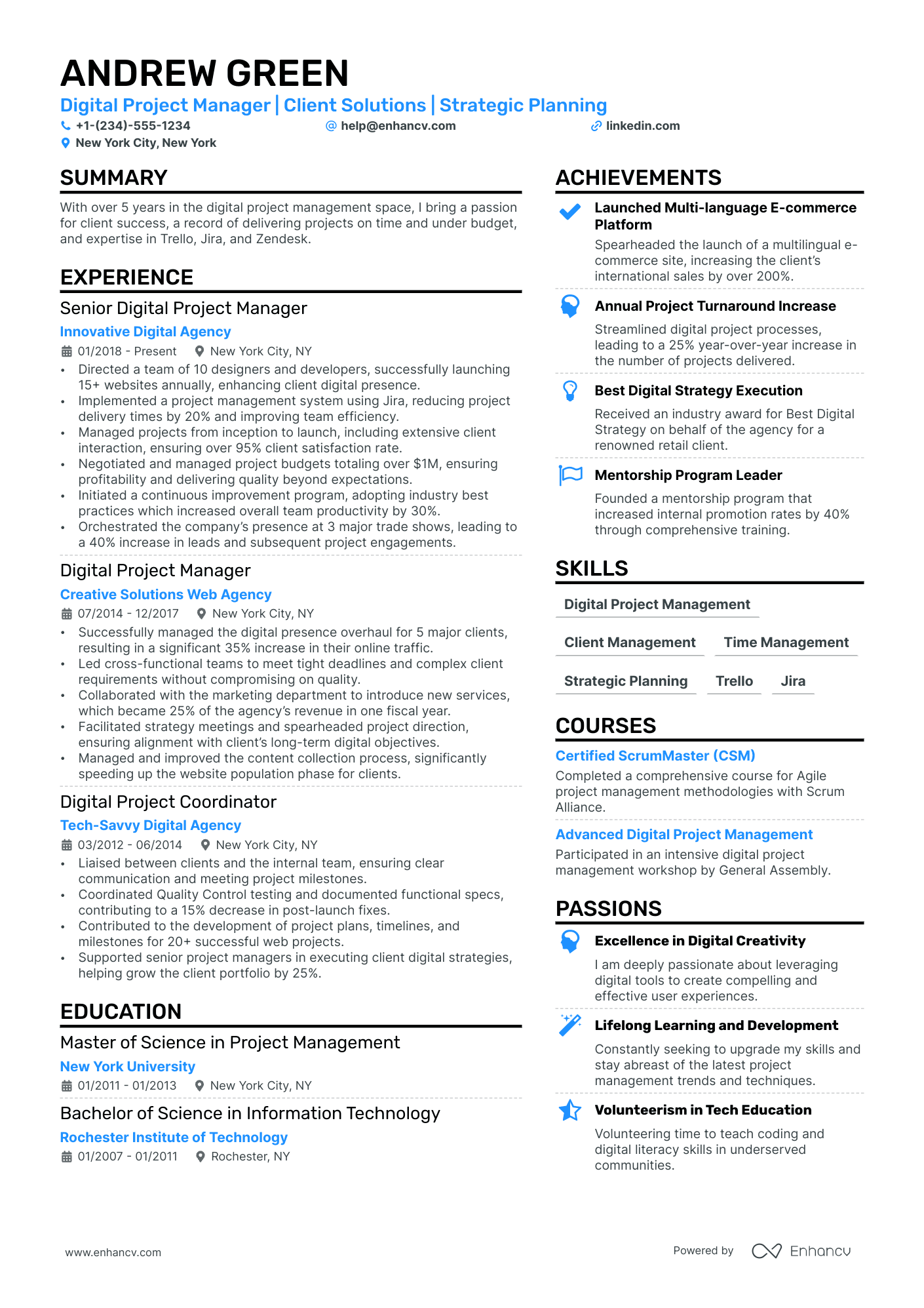
Digital Project Manager
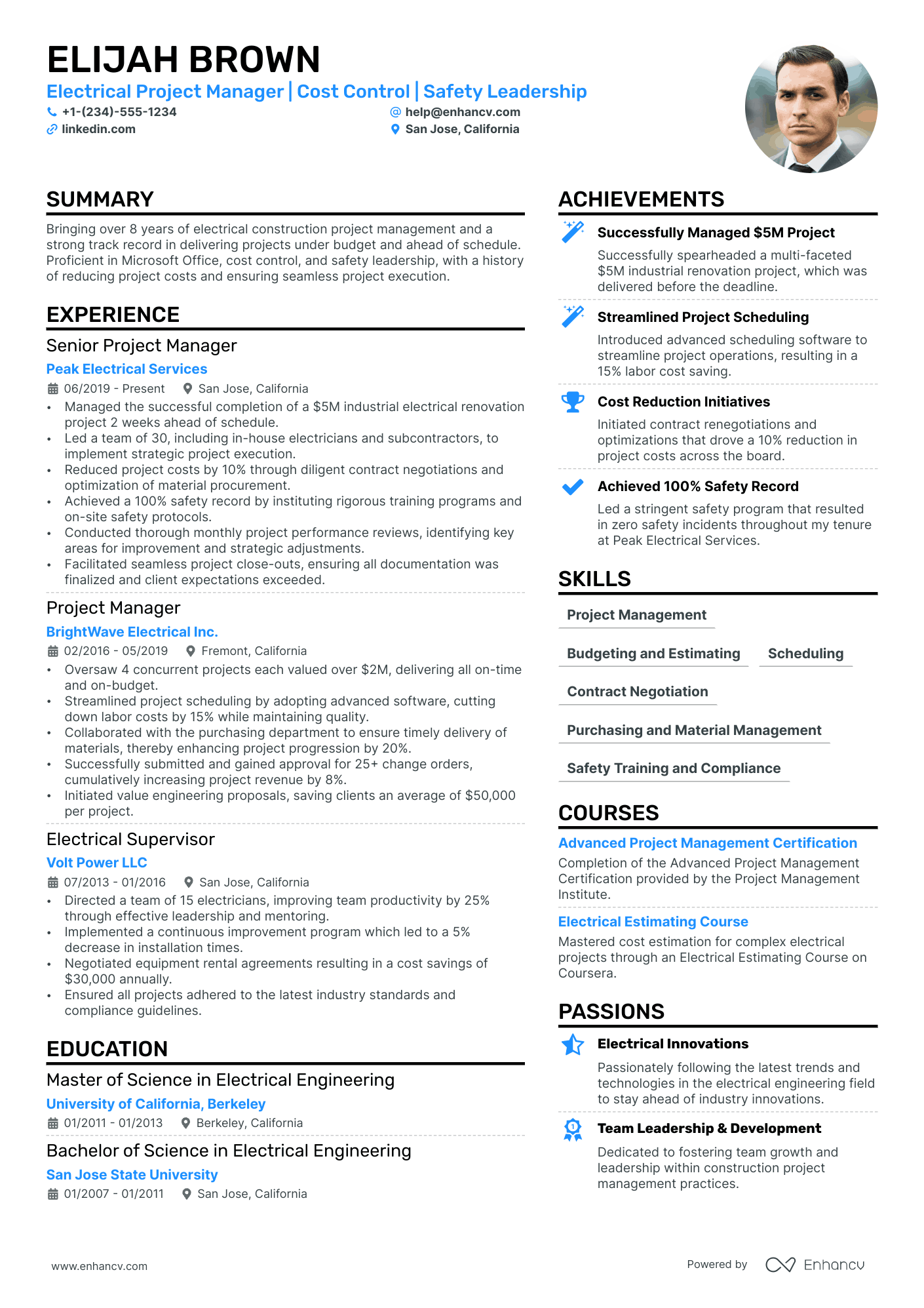
Electrical Project Manager
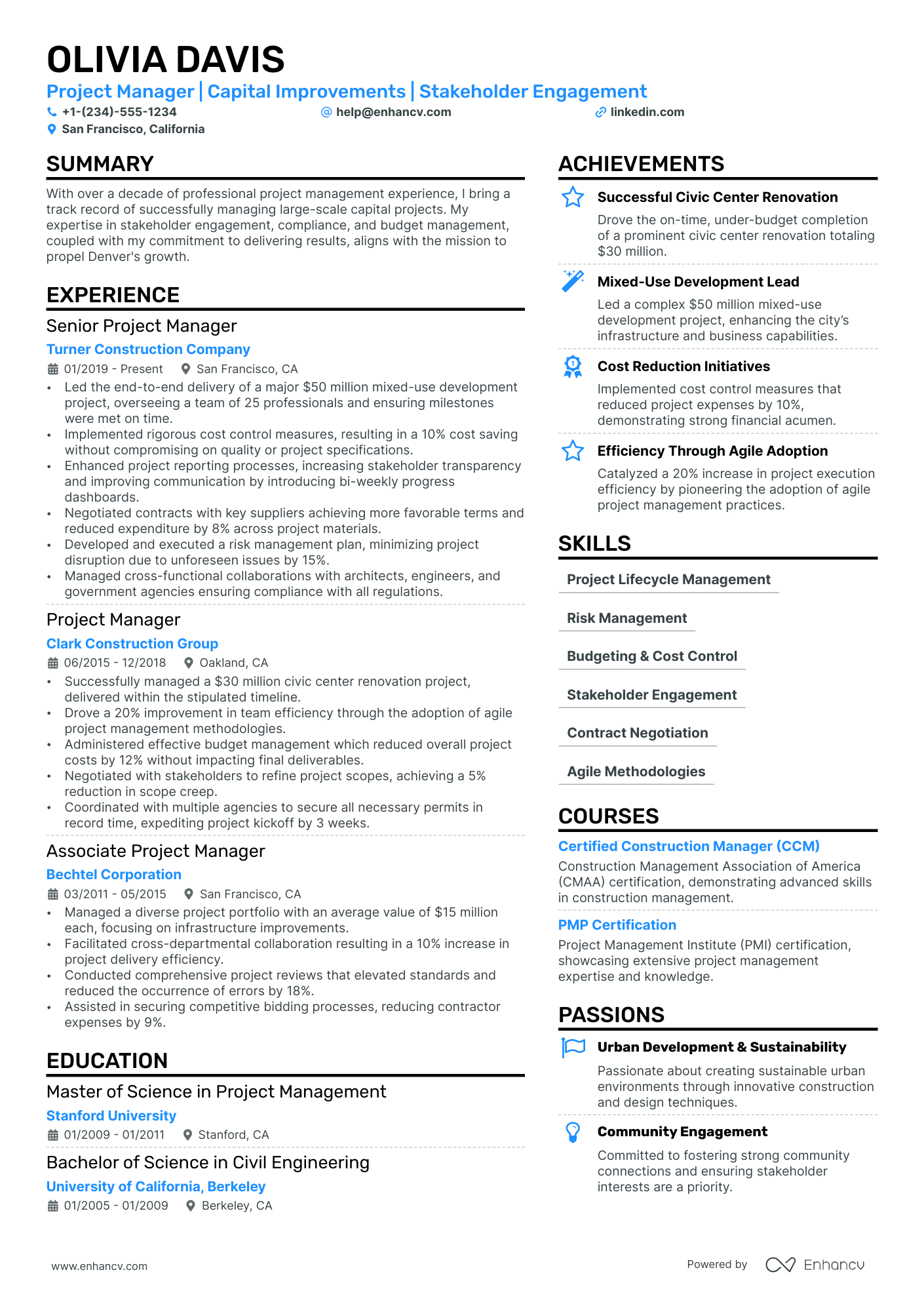
Engineering Project Manager
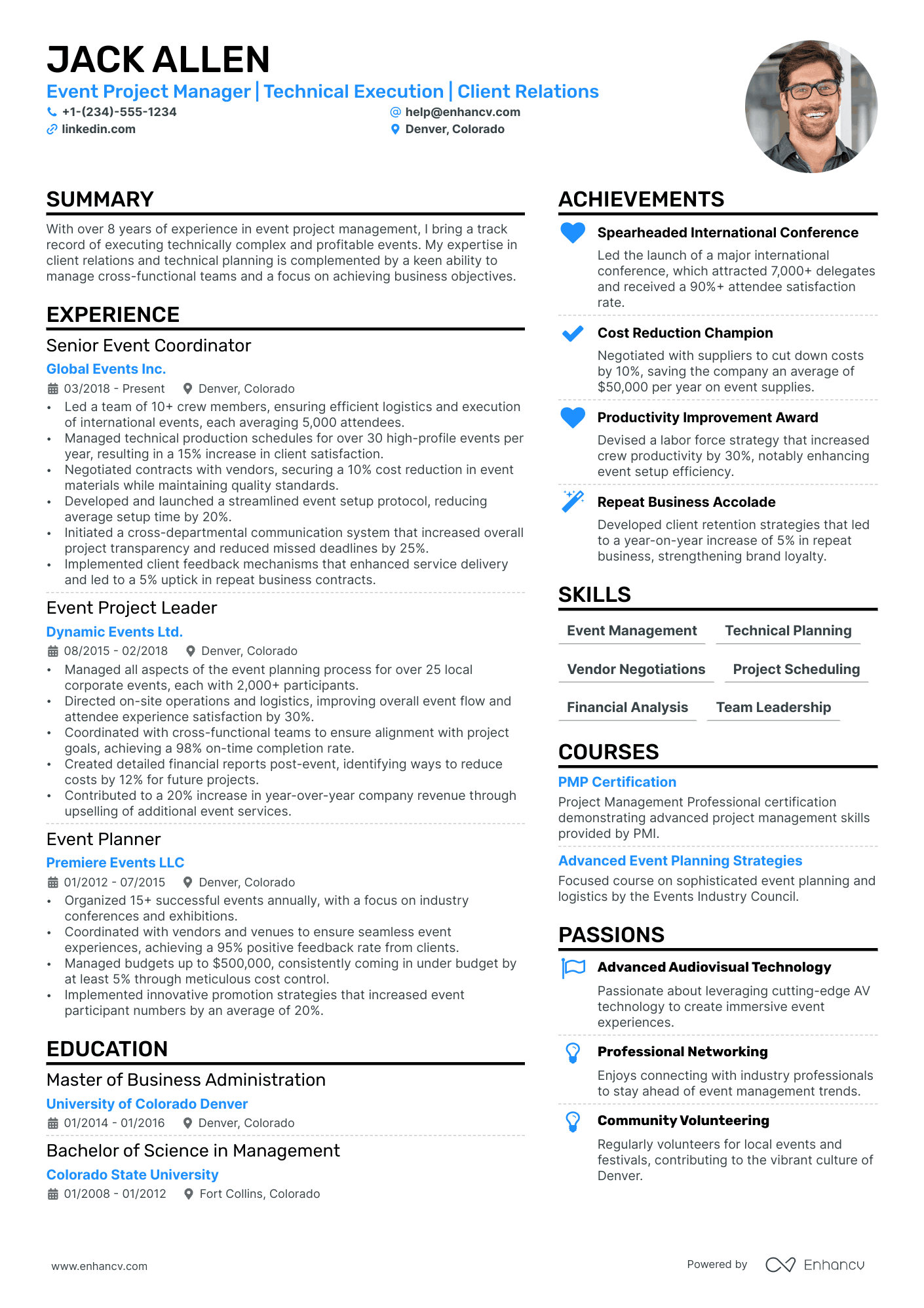
Event Project Manager
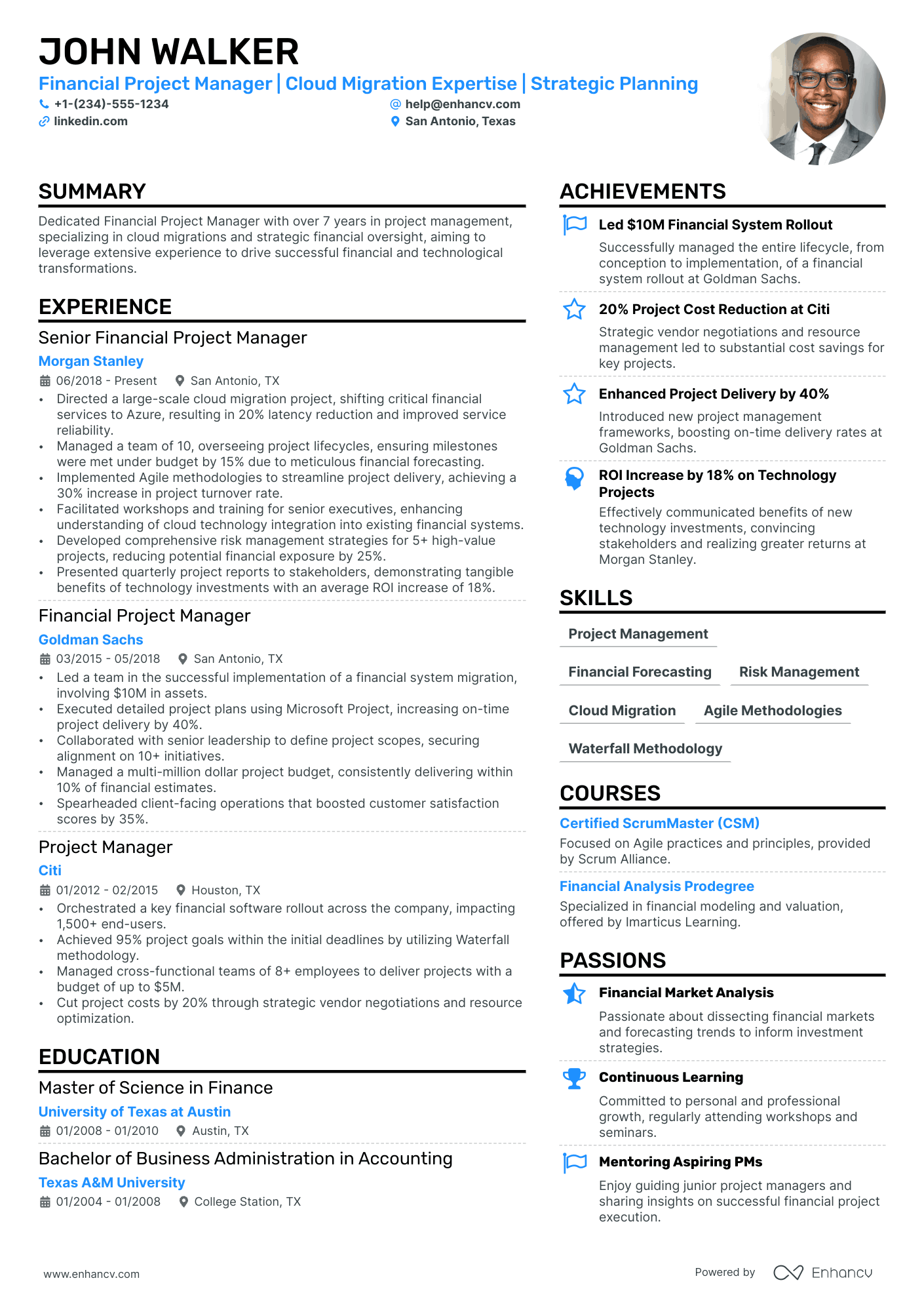
Financial Project Manager
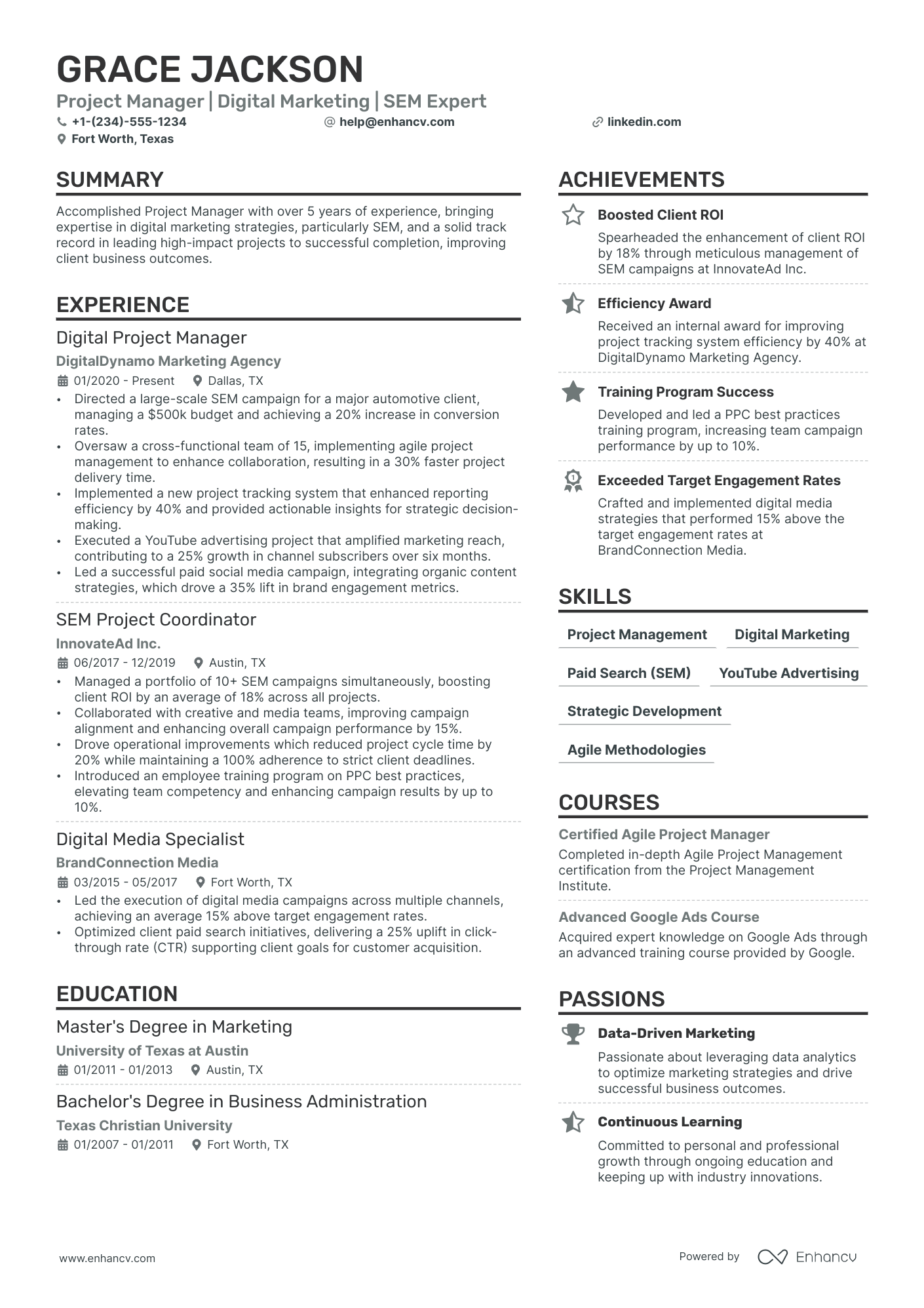
Freelance Project Manager
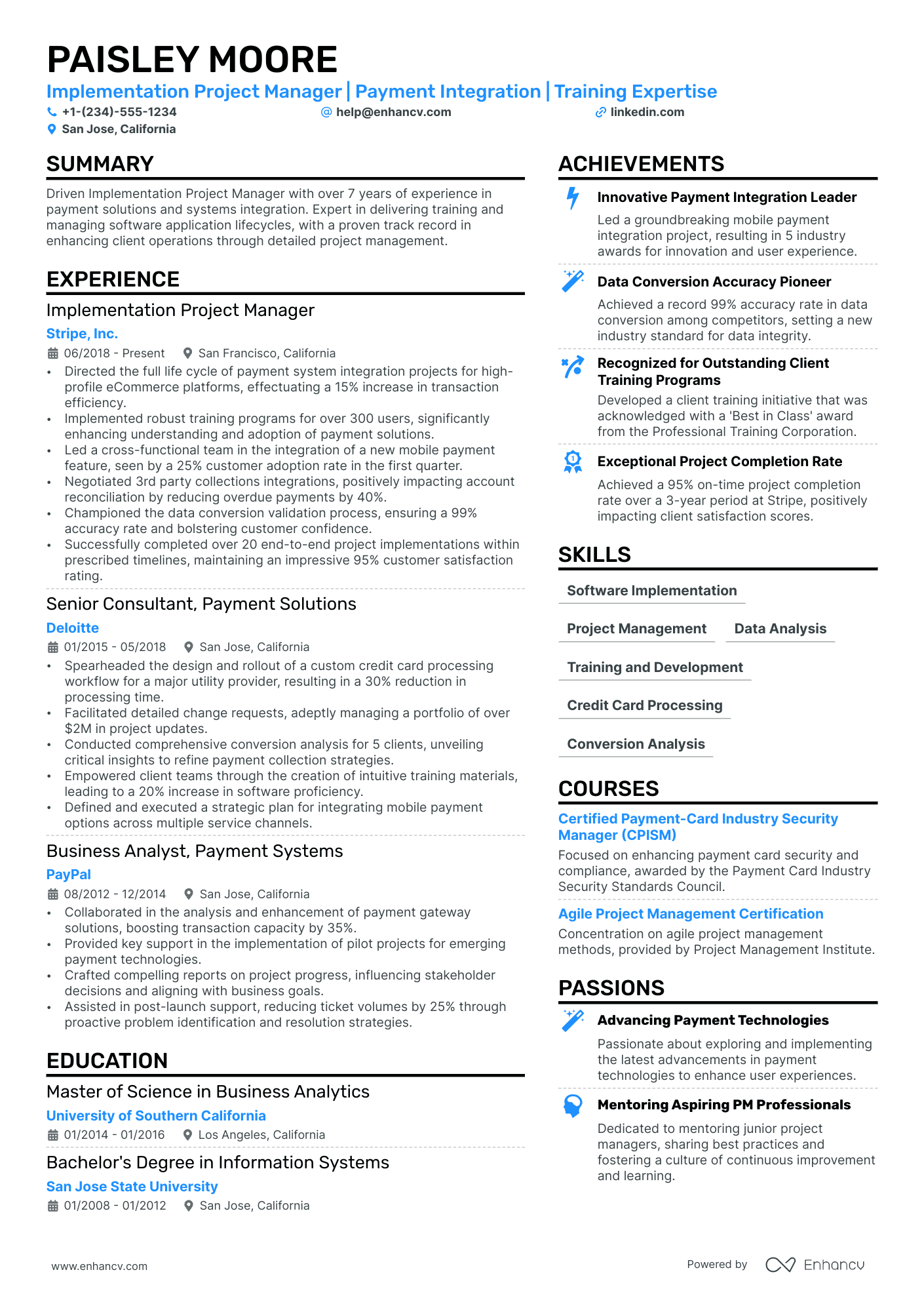
Implementation Project Manager
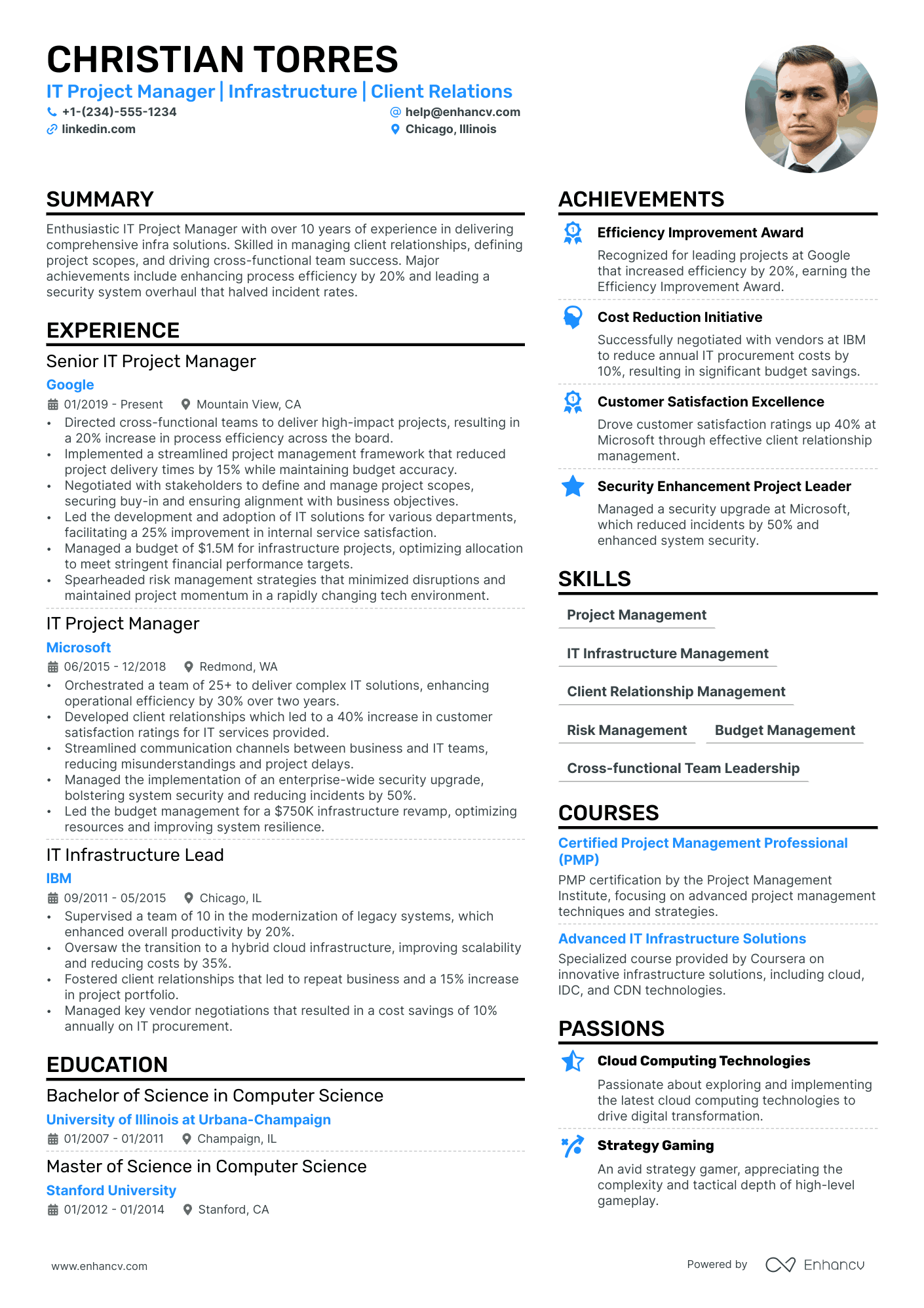
Infrastructure Project Manager
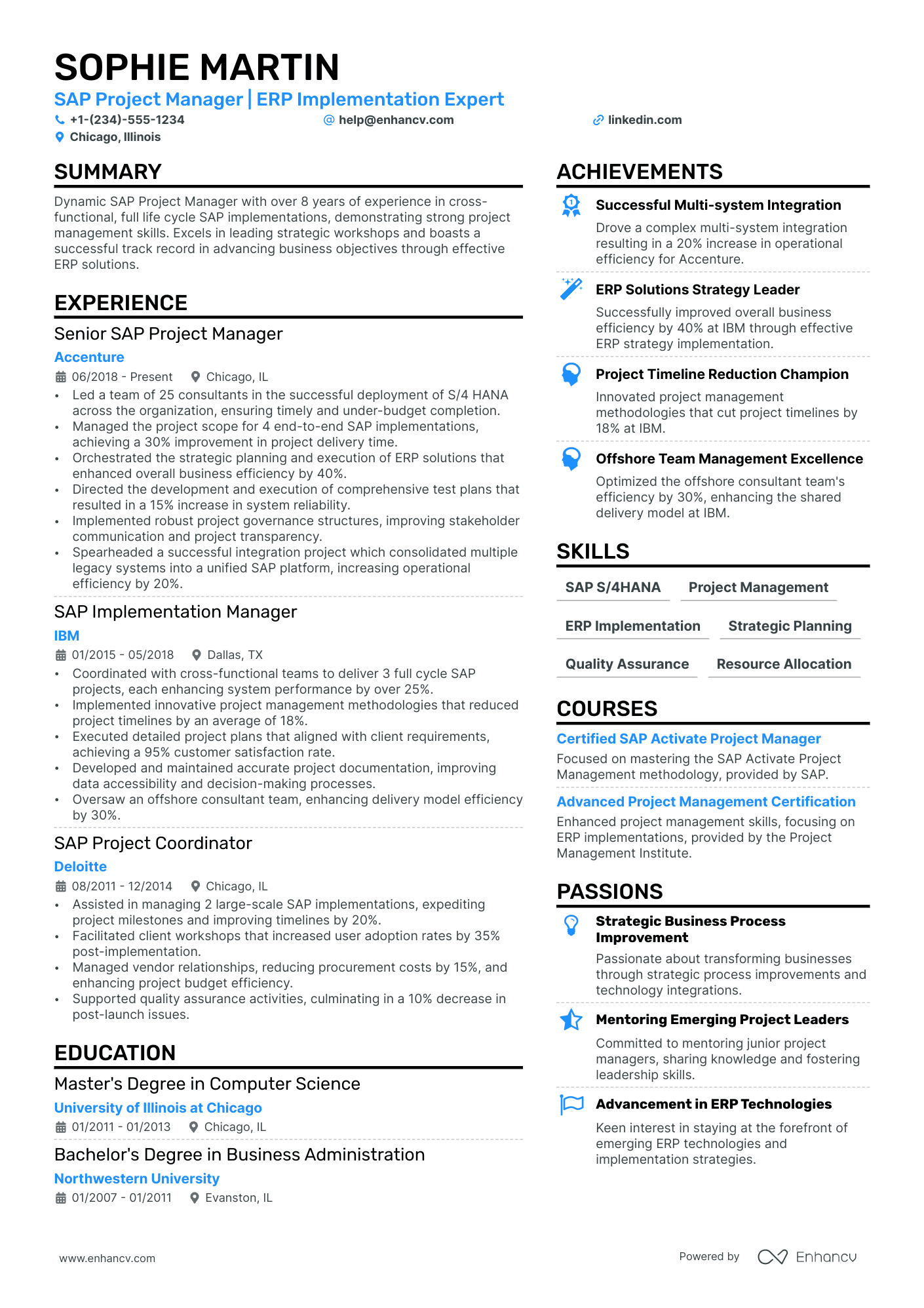
SAP Project Manager
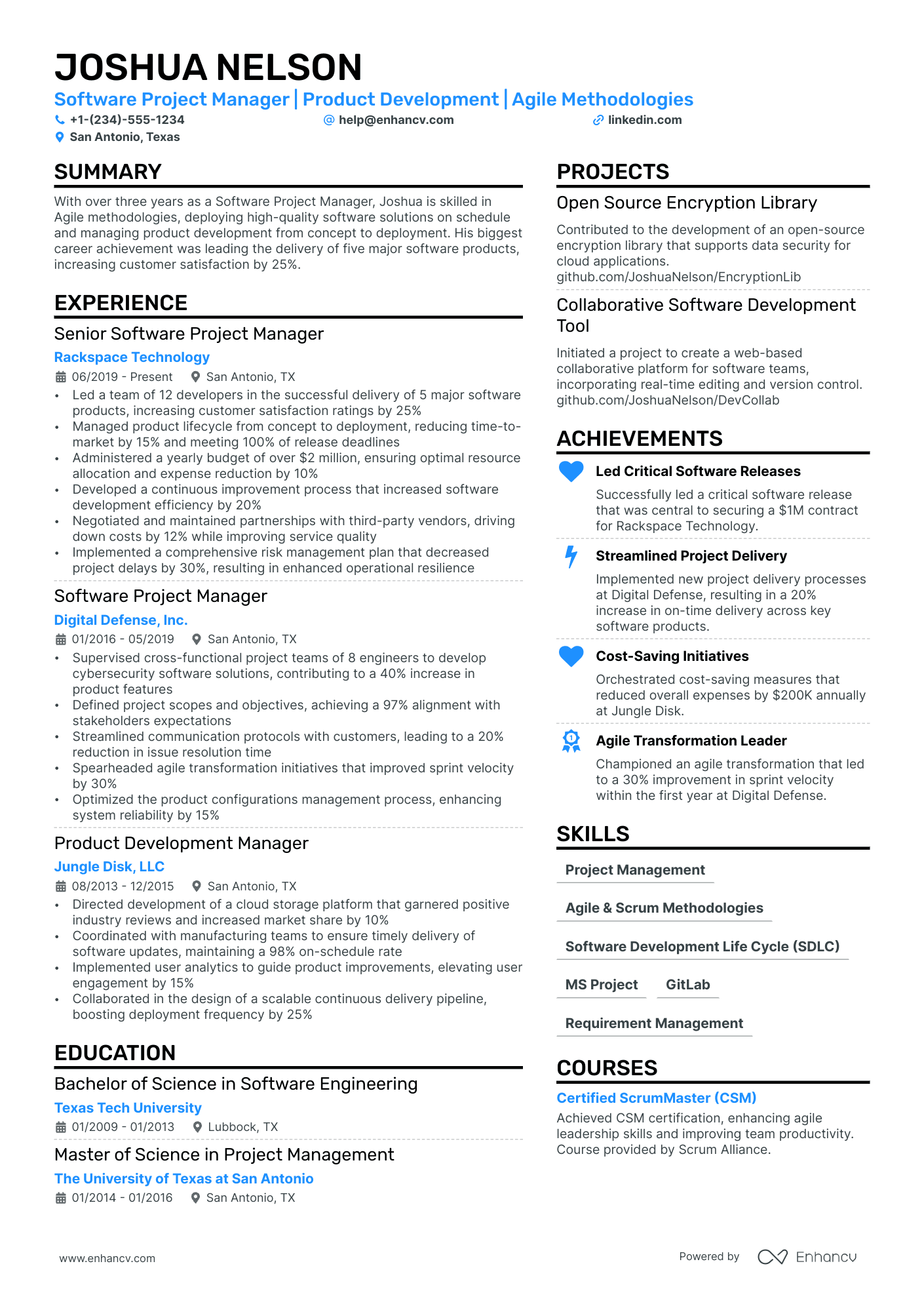
Software Project Manager
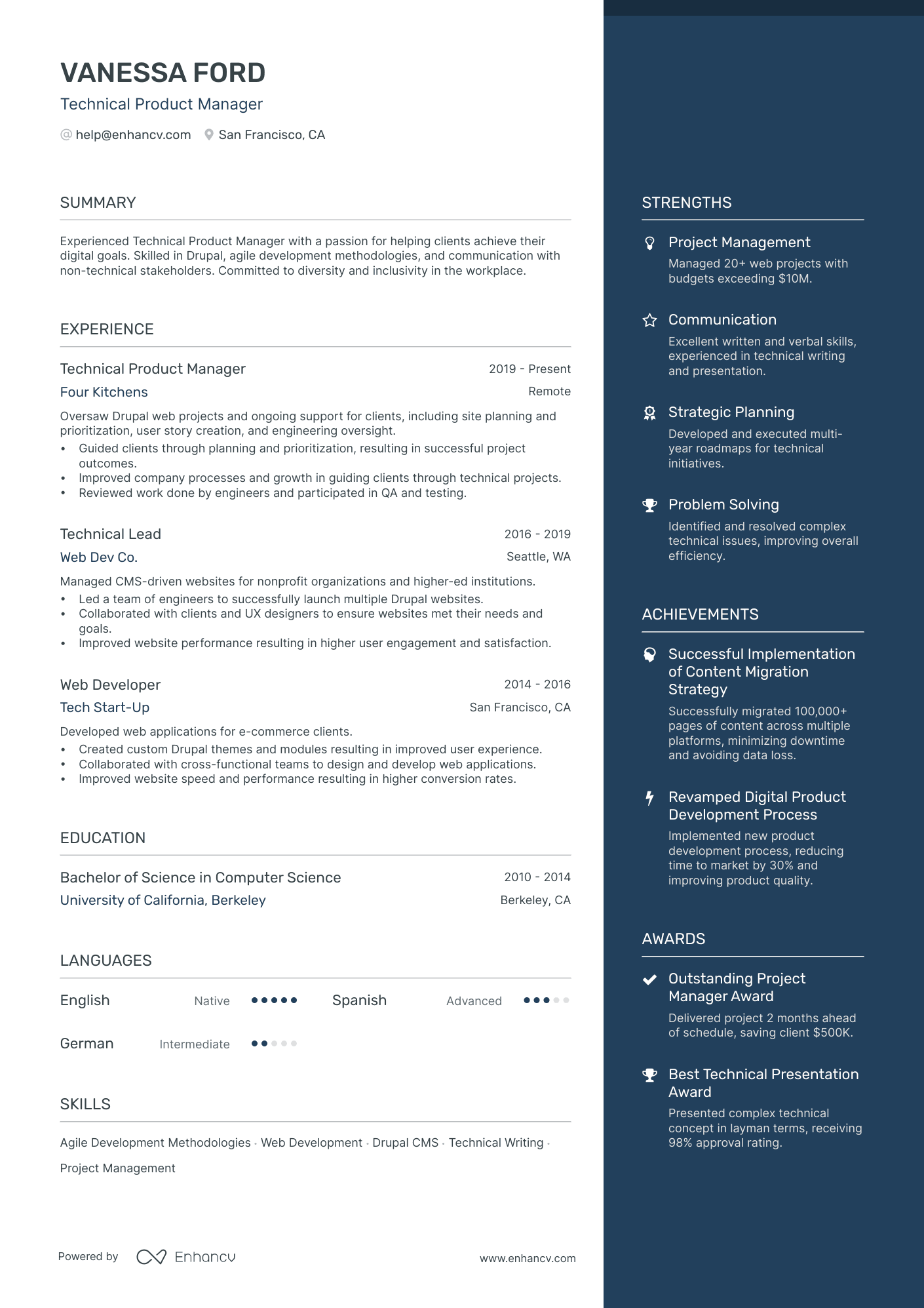
Technical Project Manager
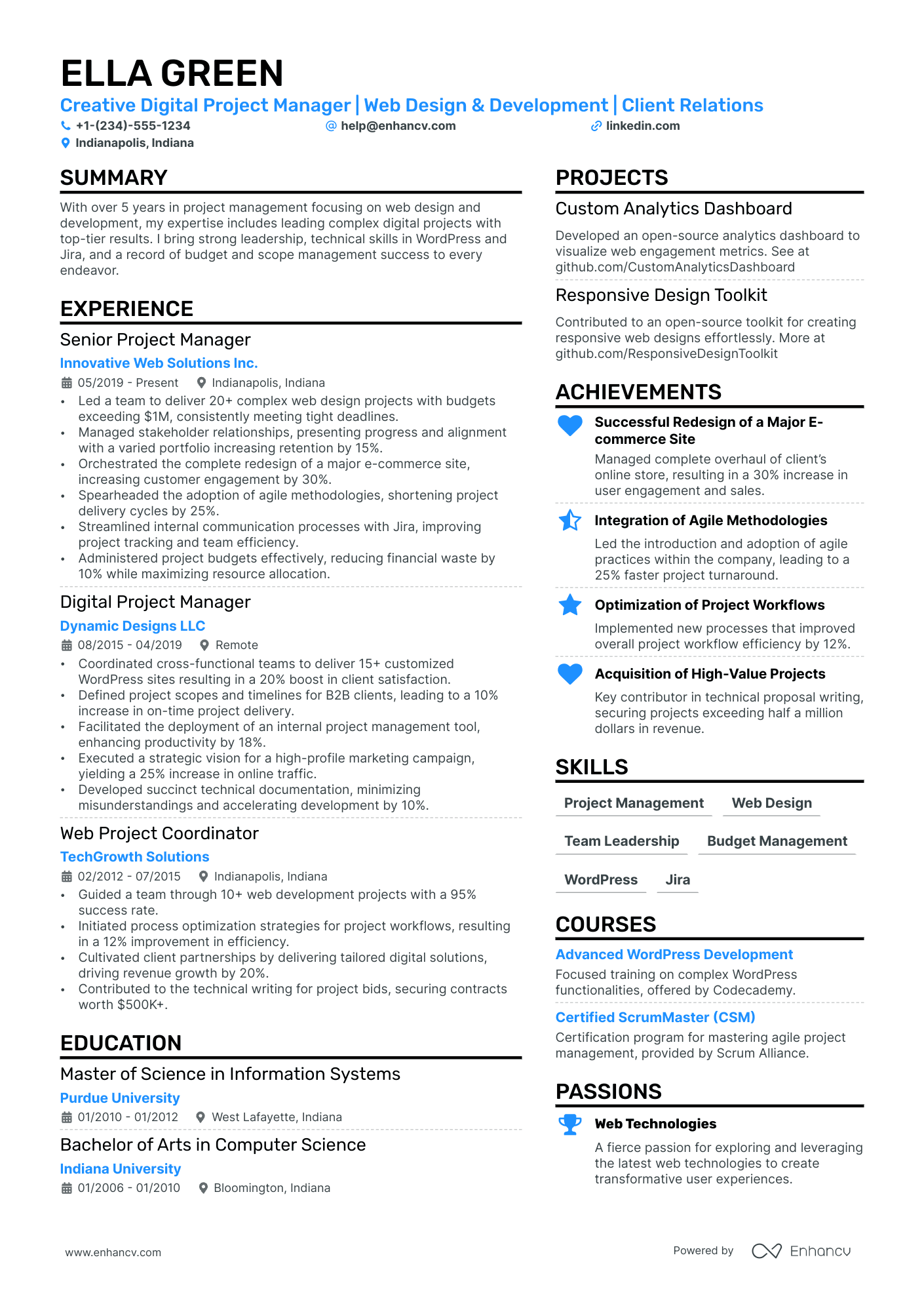
Web Project Manager
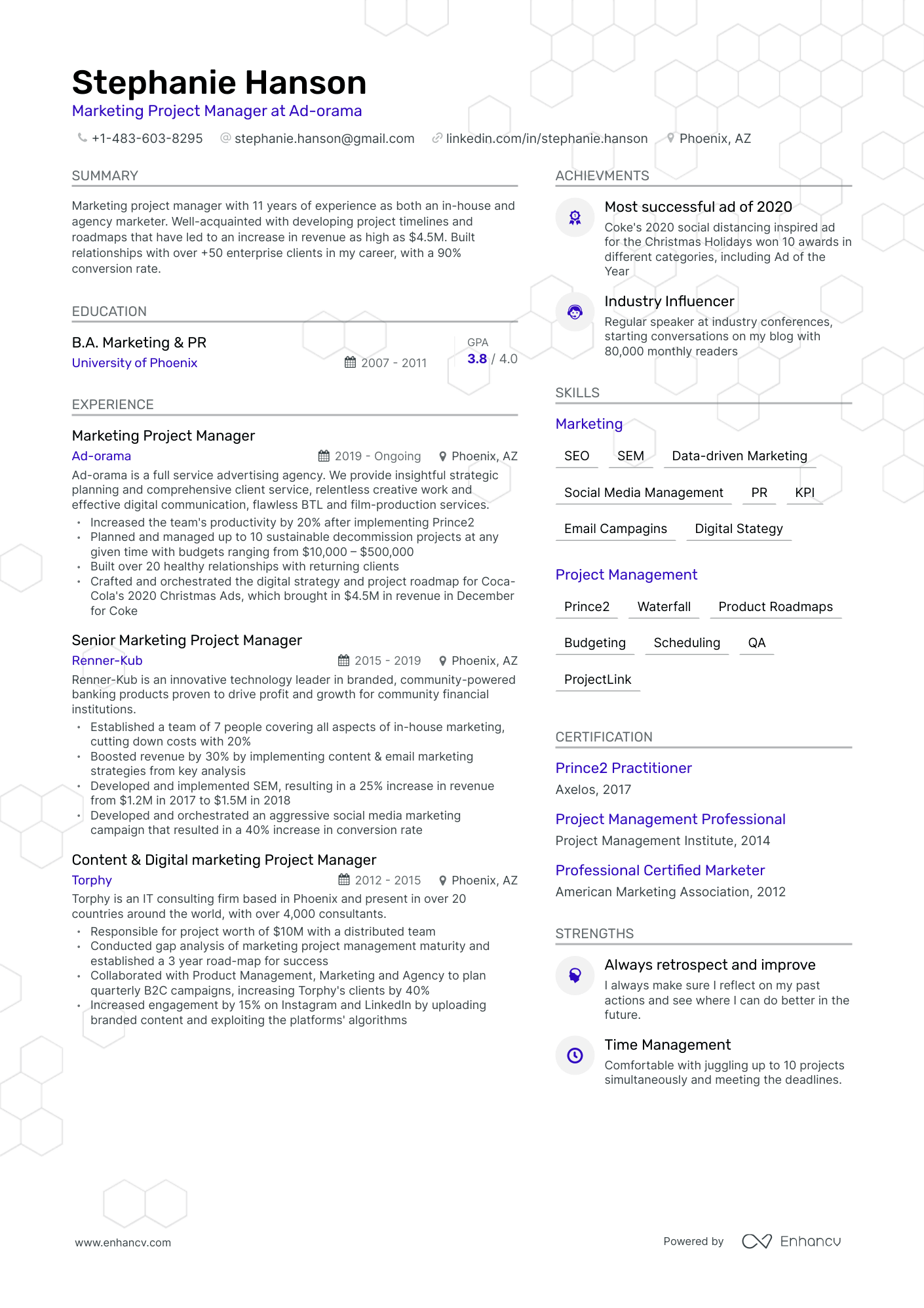
Marketing Project Manager
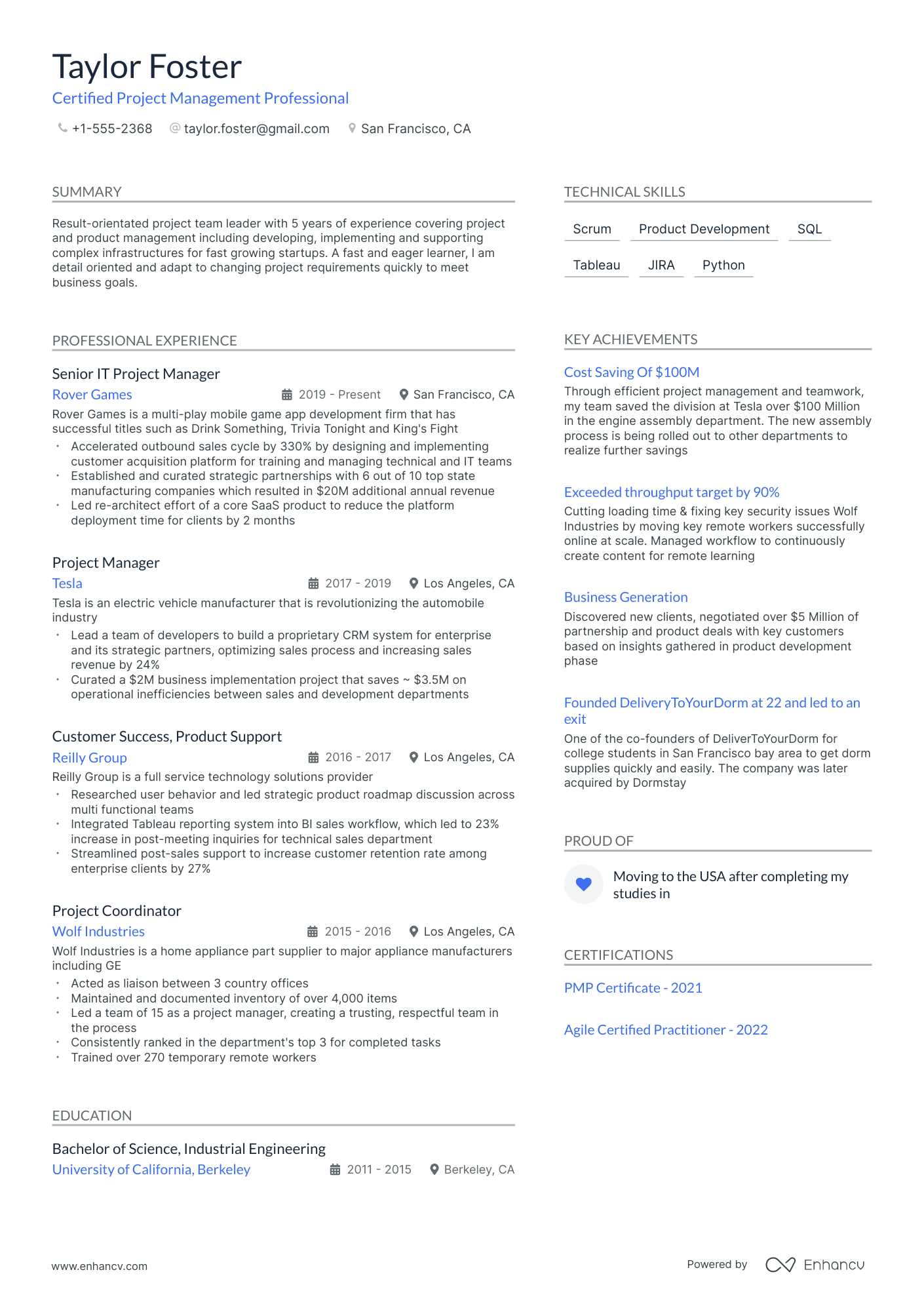
Certified Project Management Professional resume example
Resume Guide
Project manager resume example
Formatting Tips
Resume Experience
Skills On Resume
Certifications & Education Tips
Resume Summary Tips
Additional Resume Sections
Key Takeaways
By Experience

Project managers need to have strong resumes – not only to stand out from other applicants but also to show their experience and accomplishments in a manner that shows recruiters quantifiable achievements.
See, as a project manager, you play a key role in ensuring projects are completed on time, within budget, and to the required quality standards. Furthermore, you are responsible for planning, organizing, and overseeing the work of a team to achieve specific goals and objectives.
This is a huge investment for any business, and it’s the reason why recruiters evaluate all project manager applications with scientific accuracy. Including yours.
Let’s see what you’ll learn here:
- Begin with a Project Manager resume example to understand the layout and essential information.
- How to list your skills in managing projects, leading teams, and meeting deadlines.
- How to share examples of successful projects you've led, highlighting budget management and problem-solving.
- How to phrase specific parts of your resume, e.g. how you coordinate with different departments and stakeholders to ensure project success.
If you’re specializing in a specific field of project management, we’ve got guides that cover it all:
- Program manager resume
- Program analyst resume
- Project analyst resume
- Scrum master resume
- Product manager resume
- Operations manager resume
- Systems analyst resume
- Change management resume
- Management resume
- IT manager resume
- IT project manager resume
Project manager resume example

Here's what this applicant does well in their resume:
- Quantifiable achievements : Demonstrates impact with specific, measurable results, such as increasing sales revenue by 24% at Tesla and improving outbound sales cycle by 330% at Rover Games.
- Professional progression : Shows a clear career trajectory from Project Coordinator to Senior IT Project Manager, underscoring increasing responsibility and expertise.
- Technical skills and certifications : Lists relevant technical skills and certifications like PMP and Agile Certified Practitioner, aligning with the demands of project management roles.
- Key achievements section : Highlights significant accomplishments, like saving Tesla $100M, which adds credibility and draws attention to major successes.
How to format a project manager resume
A reverse-chronological resume format is a gold standard for resumes. The experience (listed from most recent to oldest), is going to be the centerpiece of your resume. This should be your first choice too.
Here are the most common resume layout elements to be aware of:
- Font family. Choose a professional font that looks good both on PDF and printed on paper. Our recommendations are Lato, Rubik, Arial, Calibri, Bitter, or the classic Times New Roman.
- Font size. The standard font size for resumes is 12p., but it can vary slightly between 10p and 14p so that you can fit your resume on a single page. Anything above or below will make it difficult to read.
- Color . Use color sparingly. We suggest using one base color for your content, and a secondary one for highlights, such as your section headings.
- Margins. Use a standard 1-inch. A smaller margin will make you want to cram too much unnecessary information.
- Length . Keep to a maximum of two pages. The rule of thumb is to go back up to 10 to 15 years of relevant experience.
- Create a resume header with your basic content information, including your phone number, a professional email address, your location, and a link to your professional LinkedIn profile. Don’t add a photo if you’re applying for a US or a UK company - it’s frowned upon.
- File format . Save your resume as a PDF , to preserve your formatting. Modern applicant tracking software can read them flawlessly.
If you’re wondering whether your resume format ticks all the ATS boxes, give our Resume Checker a spin:
Is your resume good enough?
Drop your resume here or choose a file . PDF & DOCX only. Max 2MB file size.
The top sections on a project manager resume:
- Contact information : Provides recruiters with necessary details to get in touch.
- Summary statement : Presents an overview of qualifications and expertise relevant to project management.
- Project management experience : Demonstrates your background in and knowledge of managing successful projects.
- Skills : Highlights your project management abilities - both soft and technical.
- Education and certifications : Proof of professional development, showcasing relevance to the project management field.
What recruiters want to see on your resume:
- Project execution history : Recruiters prioritize this to understand your experience in leading and managing projects from initiation to completion.
- Leadership skills: Essential for a project manager's role, recruiters look for this to ensure you can guide, motivate, and monitor a team effectively.
- Time management skills : Critical in meeting project deadlines, recruiters prioritize this to confirm your ability to allocate resources and time efficiently.
- Risk management skills : A key element in project management, recruiters value this to ensure you can identify, assess, and mitigate potential risks in a project.
- Certification in project management : Recruiters prioritize qualifications like PMP or Agile certificates, which are specifically relevant and demonstrate your proficiency in project management.
How to write your project manager resume experience
Use your resume experience section to prove exactly why you’re the right person for the job.
The experience section is less about efforts and more about accomplishments. HRs will hire people who have a track record to show it, and this is the place to do so. Here’s how to frame your experience:
- Use direct action verbs to highlight the work you achieved as a project manager.
- Feature relevant, strong project management skills that are most required in the job application.
- Include precise numbers and business results to showcase the value you provided.
- Tailor your resume to the job description. For example, if it uses terminology, such as “Prince2”, and what you use is “Prince 2”, or “Prince II”, chances are this mismatch will affect your ATS (applicant tracking system) score.
Now, let’s look at some practical examples.
- • Responsible for project management processes and procedures for contracted work.
- • Reviewed customer specifications and requirements for potential future product development.
- • Handled communicating with project progress and challenges to stakeholders.
- • Responsible for the reporting and documentation of all departmental activities.
Notice how shallow the example above is.
Although it shows some of the tasks you handle, it doesn’t highlight any of the results. It also includes basic job duties that any candidate can copy from resumes online.
That keeps you away from getting hired.
We’ll show you a better example of how you can improve your experience section.
Let’s make some simple tweaks.
- • Introduced an expense tracking strategy to stay within yearly budget goals which reduced business costs by $1.2M.
- • Developed strong cross-functional relationships with big clients and stakeholders across different levels of the business.
- • Lead monthly meetings with 8 project teams to identify challenges and resolve software development issues.
- • Conducted post product launch evaluation to identify successful software features and find ways to improve on them
The second example, on the other hand:
- Shows enough details about your past work.
- Demonstrates more metrics and examples, which enhances trust and shows credibility.
- It portrays you as a professional project manager who contributed a lot to the company.
Need more work experience section tips? Go through our guide here: How to Describe Your Work Experience on Resume .
How to quantify impact on your resume
You’ve heard many times that quantifying your achievements makes it easier for hiring managers to evaluate your performance in previous companies. To kick off your brainstorming process, let’s look at a few work situations in project management that you can use to show numbers in your resume :
- Include the number of projects you've managed: This demonstrates the breadth of your experience and your hands-on expertise.
- List the sizes of teams you have led: Showing the number of people you've managed can indicate your leadership and coordination skills.
- Mention the budgets you have handled: This reflects your ability to manage resources, which is key for any business.
- Detail the percentage by which you've completed projects under budget: This showcases your financial management skills, and how you save resources.
- State the average percentage of projects delivered on time: On-time project delivery is crucial and this shows respect towards deadlines and efficiency in project execution.
- Quantify the overall project performance improvement under your management: This can help demonstrate your value-add in improving operational effectiveness.
- Provide the number of risk assessments performed or handled: This indicates your active involvement in risk management, a critical aspect of project management.
- Include the number of successful stakeholder negotiations: Demonstrating your skills in managing stakeholder expectations can indicate your communication and negotiation abilities.
How do I write a project manager resume with no experience
Let's be honest here for a second:
Having experience is a plus to your resume. It makes hiring managers more confident in recruiting you.
But, HRs understand well that job success isn't only about experience. Many attributes can make a difference in an applicant.
Here's the deal:
The hiring company is looking for an entry-level project manager to handle specific tasks. You'll be able to find more details about that in the job application. Here’s how to build your resume:
- Read the job description, identify those duties, and prepare to include them in your resume.
- Feature the specific skills you have that allow you to perform those tasks.
- Support that with your educational background and unique certificates.
We'll teach you in the rest of this guide how you can do all that. Learn how to read a job description and extract the main resume keywords in this guide .
How to list your hard skills and soft skills on your resume
Since project managers cover a wide field of responsibilities, it doesn't help to list a handful of skills that are of the same nature.
You must pick the most relevant skills for the position you're applying to. Then use them to show that you can guarantee objectives, ensure quality, mitigate risk, etc.
14 technical skills on a project manager resume
- Project development
- Project Management Software
- Project Schedule
- Data processing
- Microsoft Office: Word, MS Excel, Project, PowerPoint
- ProjectLink
- Oracle Project Accounting
- Project Management Tools
- Risk Management
- Project Deployment
As you may have noticed, these technical skills are specific to the job duties of any project manager.
Of course, you shouldn’t list them all in your resume.
Identify which skills are most required for the job you’re applying to by reading the job description carefully.
17 important soft skills to include in your resume for a project manager job
- Leadership skills
- Negotiation
- Communication Skills
- Critical Thinking
- Strategic project planning & Project scope
- Multitasking
- Detail-oriented
- Analytical skills
- Team management
- Customer Focus
- Interpersonal Skills
- Business Analysis
- Decision-Making
- Problem-Solving
- Resource Allocation
- Vendors Management
- Project Budgeting
These skills are a must-have for any applicant that’s serious about getting hired. But don’t limit yourself to the skills section for them.
The best way to showcase your soft skills is in other parts of your resume.
For example, you can include them within your experience section. Or list your skills in your summary section to capture the HR’s interest .
Also, don’t lean too hard on buzzwords. If you decide to use buzzwords in your Project Manager resume, make sure to use them in the right context and in the right place.
How to list your certifications and education on your resume
Project management is a role that requires lots of human interaction, flexibility, and creativity.
And you don’t learn this anywhere in school.
So you might ask:
Why do I need to include an education section in my resume anyway?
Think of it this way:
If you’re the hiring manager and had to cut a list from 1000s of candidates down to a dozen ones, what would your criteria be?
You’ll now focus on the secondary features of the applicants.
You want to hire someone who has all that, plus some relevant educational background .
Your resume needs an education section. Of course, you won’t detail everything you learned since primary school. In fact, you’ll do the exact opposite.
You’ll list your highest school degree, the university or college you went to, and the duration you spent there.
Check out this example:
All in all, the required degree depends on the industry the hiring company operates in.
Most often, those companies ask for a Bachelor’s in management or business. But sometimes they only hire candidates from technical fields such as computer science and IT.
It doesn't matter how strong your resume is. Featuring certifications in project management on a resume is always a plus.
It shows that you've invested lots of time to boost your career and learn new skills. And it also proves that you're experienced in your work.
But the most important thing is this:
It makes the hiring decision easier on recruiters and allows them to feel good about their choices.
If lots of trusted organizations are vouching for a candidate, it's a good thing to trust their judgment.
What are the best project management certificates to feature on your resume?
Top 10 certificates for your resume
- Project Management Professional (PMP) from Project Management Institute (PMI)
- Certified Associate in Project Management (CAPM)
- Certified ScrumMaster (CSM)
- Certified Project Management Practitioner (CPMP)
- Master Project Manager (MPM)
- Lean management
Project management and PMP from PMI – the gist of it
Let’s do a blitz round of the hottest questions about whether a PMP certification is worth the money or not.
Is PMP certification still relevant today?
Yes, there’s a growing demand for certified project managers. The demand for project managers is likely to continue to grow as organizations increasingly rely on project-based work to achieve their goals.
Can a PMP certificate increase my salary?
According to the Project Management Institute (PMI), the median annual salary for non-certified project managers in the United States is $93,000. On the other hand, Project Management Professionals (PMPs), who are certified by PMI, earn a median wage of $123,000 per year, which is a 32% increase compared to their non-certified colleagues.
Should I invest in a master's degree or PMP?
A PMP certification is considered superior to a Master's degree in Project Management. This is because a PMP certification requires at least 7,500 hours of hands-on experience leading and directing projects, as well as an objectively assessed level of theoretical knowledge. In comparison, a Master's degree in Project Management is focused primarily on theoretical knowledge and may not provide the same level of practical experience.
How to write your project manager resume summary or objective
Not sure what the utility of a summary in a resume is? It’s meant to provide a quick overview of your career so that hiring managers can learn more about you at a glance.
Generally, you want to include:
- Most successful projects you worked on
- Strongest project management skills that allowed you to thrive in your past jobs
- Best results and accomplishments you achieved in your career
- Types of projects you were responsible for implementation
To take this a step further, you’ll:
- Include precise metrics to support your claims.
- Use short, direct sentences to keep HRs interested.
- Personalize it by including specific project management keywords, skills, and achievements.
Let’s take a look at some project management resume summaries.
This barely scratches the surface as to who the candidate is and what they’re up to. Instead, it makes them look too uninterested and lazy to update their resume.
Let’s make this better with a few simple changes.
This is a better summary, because:
- It contains precise numbers that serve as strong evidence of your competence.
- It’s more personalized and speaks directly to the hiring manager.
- It features real examples of what the candidate worked on and achieved in their past job.
Finally, the question begs…
Do you need a resume objective ?
We say - you don’t. A project manager is usually an experienced candidate for whom a career objective won’t greatly help.
Additional sections for a project manager resume
You feel you need to add more depth to your resume, but you keep repeating the same bullet points over and over again? Let’s look at some additional sections that can put your experience beyond just professional roles and settings:
- Languages : Demonstrates multilingual abilities, beneficial in global project teams and diverse work environments.
- Professional affiliations : Lists memberships in relevant organizations, indicating engagement with the professional community.
- Volunteer experience : Showcases leadership and teamwork skills in non-professional settings, reflecting personal values and work ethic.
- Awards and honors : Presents achievements and recognitions, underscoring excellence and dedication in the field.
- Publications : Includes articles or papers written, reflecting expertise and thought leadership in project management.
- Personal projects : Describes relevant personal or side projects, showing initiative and passion beyond professional work.
Key takeaways for making an outstanding project manager resume
- Read the job description carefully . Understand what the hiring company is looking for, then craft your resume accordingly
- Use your resume header to grab attention and prove your competence
- Highlight your greatest accomplishments throughout your resume to remind people of your worth
- Use your experience section to feature your relevant expertise in cross-functional teams, and strongest skills
- When faced with competition, add an education and certificates sections to stand out from other
Project Manager resume examples
Explore additional project manager resume samples and guides and see what works for your level of experience or role.

- The career objective clearly states the candidate's career goals and relevant experience.
- The internship experiences provide specific examples of the candidate's relevant experience in the IT industry.
- The strengths and skills sections include specific examples of the candidate's soft and hard skills, providing evidence of their abilities in real-life situations.

- 10 years of work experience as a project manager in Agile teams
- Project Manager Professional Certification
- Bachelor degree in adjacent to project management industry

Looking to build your own Project Manager resume?

- Resume Examples
How To Answer The “Why Were You Fired From Your Previous Job?” Interview Question
Choosing a marketing career path, how to answer: “what’s the reason for leaving your job”, why does my resume look different when i upload it, what's the best way to address a cover letter, bulgaria: a cv to make you proud.
- Create Resume
- Terms of Service
- Privacy Policy
- Cookie Preferences
- Resume Templates
- AI Resume Builder
- Resume Summary Generator
- Resume Formats
- Resume Checker
- Resume Skills
- How to Write a Resume
- Modern Resume Templates
- Simple Resume Templates
- Cover Letter Builder
- Cover Letter Examples
- Cover Letter Templates
- Cover Letter Formats
- How to Write a Cover Letter
- Resume Guides
- Cover Letter Guides
- Job Interview Guides
- Job Interview Questions
- Career Resources
- Meet our customers
- Career resources
- English (UK)
- French (FR)
- German (DE)
- Spanish (ES)
- Swedish (SE)
© 2024 . All rights reserved.
Made with love by people who care.

Build my resume
- Build a better resume in minutes
- Resume examples
- 2,000+ examples that work in 2024
- Resume templates
- Free templates for all levels
- Cover letters
- Cover letter generator
- It's like magic, we promise
- Cover letter examples
- Free downloads in Word & Docs
150 Top Skills for Your Resume + How to List Skills in 2024
- Best General Skills
Hard Skills vs. Soft Skills
- How to Include Skills on Your Resume
- Job-Specific Skills
- Skills FAQs
When it comes to your resume skills, the more specific you can get, the better. That’s why we broke down the most in-demand job skills by career type .
Still, it can be helpful to start by looking at the skills employers generally might be wanting right now.
We analyzed countless job descriptions across all careers and identified 150 of the most sought-after and widely applicable skills you can put on your resume (like this one) in 2024.
Software Engineer Resume
or download as PDF
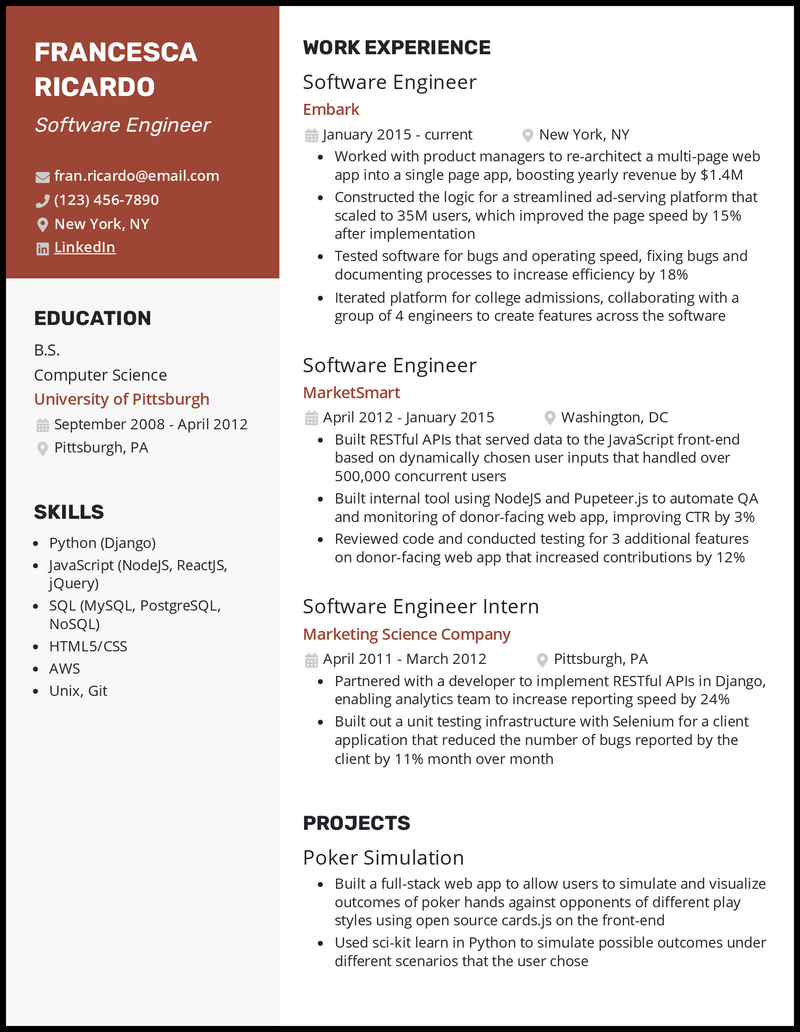
20 Good Skills to Put on a Resume

While we’re going to give you plenty of job-specific resume skills you can add to your AI cover letter and resume, there are some that work across just about any field. These can add value for candidates who either lack work history or are creating an entry-level resume .
- Data Analysis
- Problem-solving
- Collaborative
- Detail-oriented
- Written Communication
- Public Speaking
- Critical Thinking
- Multi-tasking
- Interpersonal Skills
- Time Management
- Accountable
- Results-oriented
- Project Management
- Compassionate/ Empathetic

Before we jump into which skills to put on your resume, we need to get some definitions out of the way:
- Hard skills are the tools and software you use to get your job done. Excel and QuickBooks are examples of hard skills.
- Soft skills are those that are hard to measure or prove expertise in. “Communication” is a textbook example of a soft skill.
Quickly distinguish between hard and soft skills by asking, “Is there a specific tool or software associated with the skill?” If “yes,” you’re likely dealing with a hard skill. If not, you’re talking about a soft skill.
As we explained earlier, companies often use an ATS to filter out job applicants based on whether they include the right skills on their resumes.
The ATS filters are looking primarily for hard skills; they want to be sure the people they end up hiring know the right tools and software needed to succeed.
This doesn’t necessarily mean you should exclude soft skills from your resume. Why? After the ATS approves your resume, it’s passed on to the human hiring manager. They’ll likely want to see soft skills depending on the kind of industry and role you’re applying to.
Try out this quick guide to determine whether to put soft skills on your resume:
Should I include soft skills on my resume?
If you answer “yes” to any of these questions, you should likely include soft skills on your resume (we’ll detail how in the next section).
- Technical roles are those primarily dominated by hard skills (software engineering, data science, accounting, etc.)
- Just listing soft skills on your resume isn’t as impactful as showing how you used them to do your job .
- For example, if you’re in sales or customer service, you need the ability to communicate persuasively with customers!
Examples of hard skills according to industry
- Predictive Modeling (Finance)
- eQUEST (Energy)
- Crop Rotation (Agriculture)
- eZee Frontdesk (Hospitality)
- Google Classroom (Education)
- X-ray Diagnostics (Healthcare)
- Mailchimp (Marketing)
- AutoCAD (Engineering)
Examples of soft skills
- Self-starter
- Conflict Resolution
- Attentive to Details
How to List Skills on Your Resume

Now that you know whether you should put hard skills, soft skills, or a combination on your resume, how do you actually include them?
- When it comes to your resume skills, the presentation can matter just as much as the content!
- Before we get to structure, a word of warning :
Don’t list too many skills in your skills section! While it’s all right to dump all sorts of skills into your resume outline , it’s a big red flag to the hiring manager if they see a resume where an applicant lists 15+ skills.
First, it might mean the applicant is exaggerating their skillset (a big no-no). Second, a hiring manager would rather hire someone who’s a master of a few skills than a novice in many.
Different resume formats may display your skills in various ways, but regardless of the layout you choose, there are three places you should mention your most important skills :
- In your resume objective or resume summary (if you include this section)
- In a dedicated “skills” section on your resume
- In your work experience or projects ( show how you used your skills to do your job)
Your resume objective should only be two to three sentences , so you should include your top one to two skills most relevant to the job you’re applying for here. In addition to our objective sample below, we’ve got plenty more great examples of how to mention your best skills in your resume objective or resume summary .
Organized, considerate administrative assistant with a history of remaining cool under high-pressure situations where multiple priorities are managed. Genoa Telepsychiatry is doing invaluable work for underserved housing populations, and I would be an asset in enabling Ms. Garcia to focus on that mission by alleviating her organizational burden.
How to organize skills on your resume
When it comes to skills for a resume, there are a couple of ways you can structure them:
- By skill category (technology type, soft skills vs. hard skills)
- Experience level
These kinds of breakdowns aren’t mandatory. You can just list all of your skills in your skills section, provided you keep the number to under 10.
First, you can break up your skills by category . This is most appropriate if you’re applying for a technical role since you can group different technologies you use by type.
For example, as a data analyst, you might want to divide your skills by the different facets of your job (programming, modeling, and data visualization).
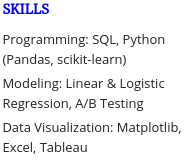
This breakdown of your skills can also work well if soft skills are your biggest strength. For example, you can chunk your soft skills into categories like leadership, customer service, communication, etc.
Another way to classify your skills on your resume is by your experience level . Convey your expertise either in terms of years of expertise with that skill or by a rating you choose (beginner, intermediate, expert, for instance).
Here’s an example of this skills breakdown in action:

And again, you can also just list all of your skills without categories like the example below if there are fewer than 10:
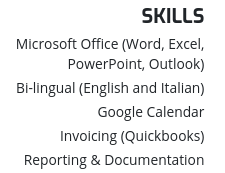
Let your work experience vouch for your job skills
Now that you’ve got your top one to two skills in your resume objective and a dedicated skills section, it’s time to talk about how you’ve used your skills in your previous roles and projects.
This is especially important for soft skills. Put yourself in the shoes of the hiring manager .
Does seeing that someone described themselves as “attentive to detail” in their skills section mean much without seeing that skill in action?
It’s much more valuable if you highlight a time you were attentive to detail in a previous job. So, if you’re an administrative assistant, you might say you “re-organized thousands of customer contacts in HubSpot without losing any customer data.”
Remember, it’s one thing to say you have a skill, but showing your knowledge of that skill in a work or personal project carries far more weight in the eyes of the hiring manager.
Let’s make this practical with an example: This software engineer lists NodeJS and Django in her resume skills list.

This won’t be the last we see of these skills, though. Take a look at this job seeker’s work experience at MarketSmart. For instance, see how she weaves NodeJS into improving CTR? And even her intern experience shows how Django played a role in increasing reporting speed.

Pro tip: Try starting with specific work experience and then work backward to determine which skills you used instead of the other way around.
Regarding technical skills, try to be specific about what you did with the tool/ software you’re describing. Microsoft Excel is a program that can be used for many different applications, for example. Discuss specifically which functionality you used to accomplish your task (pivot tables, vlookups, etc.).
Match your resume skills to the job description
How can you identify the most common skills for the industry or role you’re applying for? The best way is to look at job ads for positions that grab your attention.
Try this two-step process to list skills on your resume:
- Look across 5-10 different job descriptions for roles you’re interested in and identify the 10-15 most common skills in those job listings.
- For each specific role you apply to, choose the 5-7 skills from your list that are most relevant to that job .
Yup, this means you’ll have to customize your resume for each role. Customizing your skills section, however, will vault you into the top five percent of applicants and is the quickest way to increase the number of interviews you get!
Let’s walk through an example of how to customize your skills for a specific job.
Say you’re looking for a position as a digital marketer, and after looking at some job descriptions, you notice the most common skills employers are looking for are the following:
- CRM: HubSpot, Salesforce, Microsoft Dynamics, Pipedrive
- Web Analytics: Google Analytics, Adobe Analytics, Mixpanel, Heap
- General Tools: Microsoft Excel/ Word/ PowerPoint, Google Sheets/ Docs/ Slides
- Optimization: A/B testing, customer segmentation, attribution modeling
- Paid Ads: Facebook, AdWords, LinkedIn, Google Display Network, retargeting
- Social Media: Twitter, Instagram, Facebook, LinkedIn
- Email Marketing: Mailchimp, ConvertKit, Drip
- SEO: Content creation, keyword research, backlink building
Now, you’re specifically interested in a digital marketing role at Barnes and Noble with the following job description:
Digital marketing manager
ESSENTIAL FUNCTIONS:
- Develop and execute data-driven marketing strategies and campaigns with a strong focus on driving acquisition, engagement, and retention across multiple channels (e.g., SMS, mobile, email, social media, etc.) on time and on budget.
- Aim to generate revenue and deliver on key business objectives, ROI, and KPI targets.
- Own, measure, deliver, and optimize key metrics and reporting on marketing activities across channels and platforms.
- Identify trends and insights, optimize segments, spend, and performance based on data.
- Utilize strong analytical ability to evaluate end-to-end customer experience across multiple channels and customer touchpoints and work cross-functionally to drive qualified traffic, improve conversion, and identify new opportunities to boost user engagement and retention through A/B and multivariate testing.
REQUIREMENTS:
- Minimum 5-7 years of digital marketing experience with a minimum of 3 years demonstrated success in mobile, email, social media, PPC, and SEM marketing from concept to completion with a proven track record of success.
- Results-driven mentality with exceptional detail orientation and knowledge of metrics, A/B testing, and ROI analysis.
- Experience with testing and optimization platforms.
- Strong track record of distilling actionable insights from data to improve multi-channel marketing strategies.
- In-depth familiarity with email service providers and knowledge of marketing automation platforms.
- Solid understanding of website analytics tools (Google Analytics, Amplitude, Appsflyer), email systems (Sailthru, Salesforce Marketing Cloud), and ad-serving tools (Adroll, Facebook.)
Finally, we cross-reference our list of 10-15 skills with the skills this specific job is looking for (underlined above). This leaves us with the remaining five key skills:
- Optimization: A/B Testing, Segmentation
- CRM: Salesforce
- Web Analytics: Google Analytics
- Paid Ads: Facebook
- Social Media: Email Marketing
There you have it! These skills are what will make up your skills list for this specific role. Don’t forget to include the seemingly most essential skills in your resume objective (for this position, we’d say those are optimization and A/B testing) and mention relevant work experience where you used some of these skills.
Remember, it’s important to be truthful about which skills you know and which you don’t. A good rule of thumb is to ask yourself whether you’d be comfortable being interviewed about a skill. If the answer is “yes,” then include it. Otherwise, it’s best to leave it off your resume.
And for the grand finale to this digital marketing example: Check out how this resume integrates key skills into the career objective, skills section, and work experience.
Digital Marketing Manager Resume
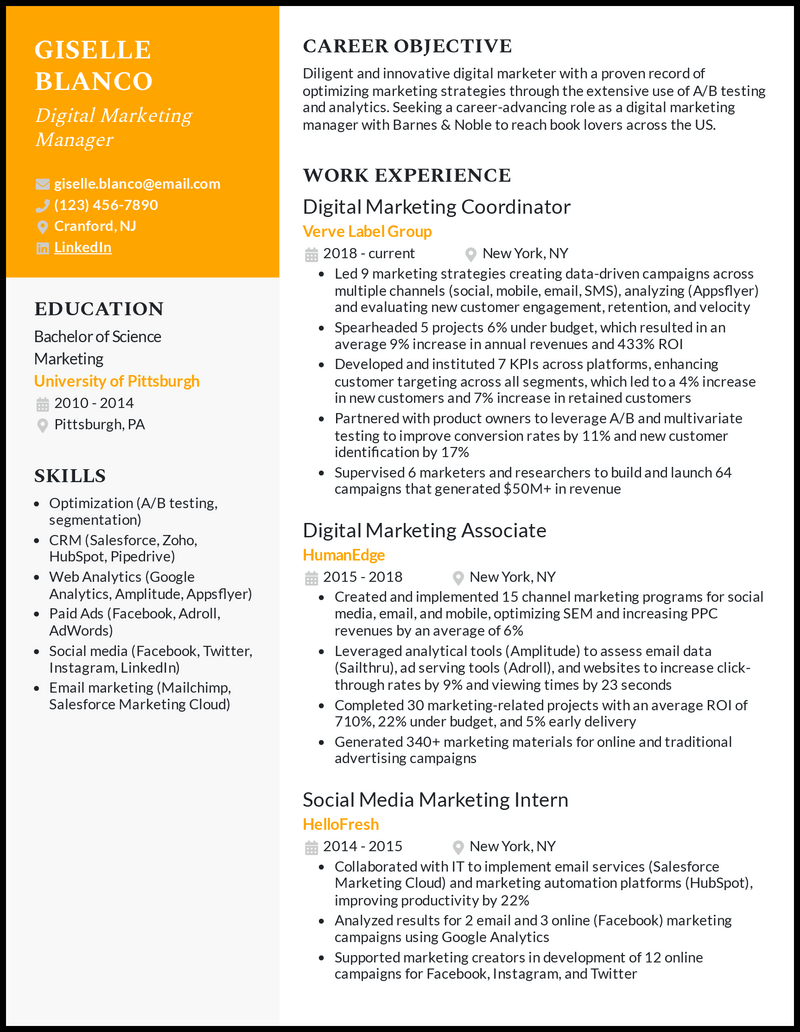
Why this resume works
- Starting with the most obvious section—the skills section—Giselle lists skills important to Barnes & Noble, grouping them in easy-to-read categories.
- Don’t be deterred, even if you lack experience in an area or two! Demonstrating a willingness to learn is highly valuable.
- The work experience section is a prime opportunity to showcase skills in action. Like Giselle, start with active verbs to show how you used skills, software, and tools to impact the company positively.
Job-Specific Resume Skills

We promised an extensive list of resume skills, organized by profession, and we’re not ones to break our promises!
Below, you’ll find countless role-related skills you can put on your resume, along with informational tidbits for each profession.
Remember that honesty is critical when you build a resume , so we stand behind a shorter list of genuine skills rather than a slew of half-truths you’ll blush over later in an interview.
Web developer skills for your resume
Web developers build the web apps we interact with in our everyday lives. From banking to transportation to Netflix, it’s hard to find a facet of life that isn’t touched by web development.
We did an extensive analysis of the top web developer skills employers are looking for in 2024, and below are the results in order of those most in demand.
Top web developer skills
- JavaScript (React, Angular, Vue)
- SQL (MySQL, PostgreSQL, SQL Server, Oracle)
- Cloud Storage (GCP, AWS, Azure)
Data analyst skills for resume
Companies are currently swimming in large pools of data. Marketing, product, engineering, and executive teams all rely on data to make the most effective decisions in the face of uncertainty.
That’s where data analysts come in. To be a successful data analyst, you need the right skills to clean, organize, visualize, and make actionable recommendations from data.
We analyzed over 100 job openings and determined the most in-demand data analyst skills needed to get a data analyst position in 2024. Below are the results in order of the most popular skills.
Top data analyst skills
- Business Intelligence Tools (Tableau, PowerBI, Qlik, Looker)
- Excel/ Google Sheets
- Python (Pandas, Matplotlib, Scikit-learn, Numpy)
- R (Dplyr, ggplot2)
Marketing skills for resume
No matter how great a product or website—unless a successful marketing campaign drives customers to that product, it won’t succeed.
Marketers must strike a balance between creativity and science to reach the right people at the right time to make them customers.
To do this successfully, marketers need a wide range of skills.
Top marketing skills
- CRM: Salesforce, Microsoft Dynamics, Pipedrive, HubSpot
- Web Analytics: Adobe Analytics, Mixpanel, Heap, Google Analytics
- General Tools: Google Sheets/ Docs/ Slides, Microsoft Excel/ Word/ PowerPoint
- Optimization: Customer Segmentation, Attribution Modeling, A/B Testing
- Paid Ads: AdWords, LinkedIn, Google Display Network, Retargeting, Facebook
- Social Media: Instagram, Facebook, LinkedIn, Twitter
- Email Marketing: ConvertKit, Drip, Mailchimp
- SEO: Keyword Research, Backlink Building, Content Creation
- Direct Mail
Customer service skills for resume
When a customer has a problem or a question, they need to get a prompt and accurate answer to ensure they remain a customer.
More than that, a strong customer service representative will build relationships with customers to help identify potential new features or directions to take a product.
To do this successfully, you need a potent blend of people skills while also knowing the tools of the trade.
Top customer service skills
- Strong Communication & Interpersonal Skills
- Curious, Empathetic, and Professional
- Willing to Learn
- Goal-oriented
- Enterprise Software
- Experience with Business Processes
- Microsoft Excel
- Zendesk, HubSpot, Helpscout
Management skills for resume
No matter how effective a person is as an individual contributor, management is an entirely different job that requires an altogether different skill set.
To be an effective manager, you must first understand and relate to your employees while ensuring company initiatives are hit on time. To get this done, you need a mix of different skills.
Top management skills
- Financial Analysis
- Self-motivation
- Conflict Resolution & Management
- Managing Career Growth
- Performance Reviews
- Ability to Motivate
- Foster Team Environment
- Ability to Work Under Pressure
- Result-driven
Accounting skills for resume
Accountants are the unsung heroes of any well-oiled company. A company is only as successful as it can demonstrate through its financial reports.
Accountants need to be wizards with reporting and data while maintaining a culture of rigorous organization. Accounting is a field that requires knowledge of particular hard skills.
Top accounting skills
- Financial Reporting
- General Ledger Accounting
- Quarterly Close Processes
- Quarterly Financial Statements
- Tax Accounting
- GAAP Accounting Principles
- Expense Reporting
- Accounts Payable & Receivable
- Account Reconciliation
Project manager skills for resume
Project managers keep the trains on the rails. To be a successful project manager, you must know how to ensure deadlines are met on time and on budget.
In this role, you’ll need the ability to communicate with diverse teams and technical knowledge to help engineers remove roadblocks they encounter that will prevent them from getting their job done.
Top project manager skills
- Project Management Software (Jira, Trello)
- Microsoft Office/Google Suite (Excel/Google Sheets, PowerPoint/Slides)
- Project Management Frameworks and Methodologies (Agile, Scrum, Waterfall, Kanban)
- Programming Languages and Frameworks (JavaScript, Node.js, Python, Django)
- CRM Experience (HubSpot, Salesforce)
- Digital Marketing
Sales skills for resume
An effective salesperson can form meaningful relationships with new sales prospects very quickly.
To be able to sell a new customer on your product or tool, you first need to intimately understand their pain points and what they’re trying to solve.
In addition to solid soft skills, you need to know the technical tools to track and manage prospects through the sales pipeline.
Top sales skills
- Strong Communication
- Negotiation
- CRM (HubSpot, Salesforce)
- Presentation Skills
- Lead Generation (LinkedIn, Email)
- Microsoft Office (Word, Excel, PowerPoint)
Administrative assistant skills for resume
When it comes to a career as an administrative assistant, there’s no skill more valuable than organization. How can you help others be at their best without ensuring all ducks are in a row?
Of course, other skills are needed to succeed as an administrative assistant, and we’ve analyzed numerous administrative assistant job openings to determine the most in-demand skills for this career.
Top administrative assistant skills
- Microsoft Excel/Google Sheets
- Microsoft Word/Google Docs
- Microsoft PowerPoint/Google Slides
- Scheduling (Microsoft Outlook/Google Calendar)
- Words per Minute you Type
- Languages you Speak
- Database Management
- CRM (Salesforce, HubSpot)
- Personable and Welcoming
Nursing skills for resume
The value of nurses in our society has never been more apparent than during the COVID-19 crisis.
A good nurse must have a rigorous understanding of the medical procedures and documentation they need to complete while also maintaining the soft skills necessary to build trust and understanding with patients.
It’s a very tricky balance to strike. To help you pursue a new job in nursing, we compiled the most popular skills employers are looking for across a wide range of nursing disciplines.
Top nursing skills
- EMR Systems
- Ambulatory Care
- Emergency Care
- CPR Certified
- Best Practices
- Long-term Patient Care
- Compassionate
- Organized & Reliable
- Infant & Child Care
- Medical Documentation
Teacher skills for resume
With the shift to remote learning due to the COVID-19 pandemic, the skills required to be an effective teacher from afar are also changing.
Teachers now need to be more in tune with the technologies used for remote learning to reach students.
Still, there are some skills required to be a great teacher that haven’t changed. Based on our analysis, here are the top skills schools want when they hire teachers.
Top teacher skills
- Lesson Planning
- Blackboard/Moodle
- Google Apps (Gmail, Sheets, Slides)
- SMART Boards
- Remote Teaching (Zoom)
- Safe, Supportive Classrooms
- Accountability
- Communication with Parents and Students
- Organization
- Focused on Student Performance
Software engineer skills for resume
Software engineer is a broad, all-encompassing term. There are hundreds of specific disciplines within this umbrella that require different skills.
Still, there are fundamental and common skills that all developers must have. First and foremost, you need to be able to program!
We collected the most in-demand skills for software developers to help you make the best resume possible.
Top software engineer skills
- Python (Django)
- Java (Spring)
- Ruby (Ruby on Rails)
- PHP (Laravel)
- JavaScript (Node, React, Vue, jQuery)
- SQL (MySQL, PostgreSQL, NoSQL)
- AWS, GCS, Azure
Business analyst (BA) skills for resume
Business analysts combine skills from many areas to help drive outcomes that materially improve a customer’s core metrics.
A BA is a great communicator, a robust data analyst, and an effective project manager. After a project is complete, the BA then has to be able to communicate the outcomes to the executive team.
Top business analyst skills
- SQL (MySQL, PostgreSQL, SQLite, SQL Server)
- Excel, Google Sheets
- PowerPoint, Google Slides
- Tableau, Looker, Chartio
- Salesforce, NetSuite, HubSpot, Pipedrive
- A/B testing, Linear Regression, Logistic Regression
- Project Management (JIRA, Trello)
Student skills for resume
When you’re a student, it can be challenging to know which of your skills you should highlight when applying for your first job or internship.
It varies depending on the position, but at this point in your career, hiring managers don’t expect you to be an expert in all the tools you’ll need for the job.
The key is to mention which skills you have some familiarity with and express an openness to learning on the job.
Top student skills
- Microsoft Outlook/Gmail
- Hard-working
- Social Media
- Collaboration
Data scientist skills for resume
Data scientists are hybrid programmers and statisticians. It can be tough to figure out which of your technical skill sets should be the focus of your resume.
Touch on your primary programming language and put context around the modeling techniques you use regularly.
After studying over 100 data scientist job openings, here are the top skills employers are looking for in these roles.
Top data scientist skills
- Python (Numpy, Pandas, Scikit-learn, Keras, Flask)
- R (Dplyr, Shiny)
- SQL (MySQL, PostgreSQL, Oracle)
- AWS (Redshift)
- Supervised Learning (Linear and Logistic Regression, Decision Trees, Support Vector Machines, Recommendation Engines)
- Unsupervised Learning (K-Means Clustering, Principal Component Analysis)
- Customer Segmentation, Price Optimization
Human resources (HR) skills for resume
When it comes to the skills you need to get your next job as a human resources manager, it’s important to demonstrate a combination of people skills (it’s in the job title, after all), but you also have to show command of the tools needed to get the job done.
You should demonstrate which phases of HR you have experience in. Whether that’s recruiting, benefits, compensation, or a combination thereof, these should be clear.
Top human resources skills
- ATS (Workday, Jobvite, Greenhouse)
- Compensation & Benefits
- Performance Management
- Recruiting (Sourcing & Interviewing)
- Employee Onboarding
- Benefits Planning & Administration
- Employee Coaching
- LOA, FMLA, PLOA, Disability
- Microsoft Excel, PowerPoint
- Recruiting Coordination
- Compliance (OFFCP, FLSA, Unemployment)
- Employee Retention
- Organizational Strategy
- Labor Relations
- Succession Planning
- HR Analytics
Product manager skills for resume
Product managers help steer the direction of a company by working to understand new features and products customers are looking for.
A successful PM should have the technical skills to communicate fluently with engineers. They also need strong data analysis skills to determine whether new feature launches are working.
Top product manager skills
- Google Analytics, Adobe Analytics, Mixpanel
- Google Tag Manager
- A/B Testing
- Optimizely, Google Optimize
- Basic Python scripting, APIs
- Agile, Scrum, Waterfall, Kaban
- Jira, Github, Confluence
- Google Analytics, Microsoft Excel
Recruiter skills for resume
Since recruiters are the first people prospective employees interact with in a company, they must have strong people skills.
Outside of that, a recruiter needs to be familiar with using an ATS to keep track of candidates as they go through the application funnel.
In addition, they need to know various tools to effectively source prospective candidates for a job opening.
Top recruiter skills
- Microsoft Excel, PowerPoint, Word
- HR Information Systems (Workday, Oracle HCM, Zoho, SAP)
- ATS (Greenhouse, Lever, Workable, Breezy HR, BambooHR)
- Sourcing Tools (LinkedIn Recruiter, TalentNest, Connectifier)
- Full Cycle Recruiting, Intakes, Sourcing, Screening, Evaluating Talent
- CRM (HubSpot, Marketo, Hootsuite)
Scrum Master skills for resume
As a Scrum Master, it’s vital you demonstrate which project management frameworks you have experience in on your resume.
Scrum Masters help ensure project deadlines are hit by establishing and monitoring incremental goals along the way.
Communication and management skills are must-haves, in addition to a few technical tools.
Top Scrum Master skills
- Agile Development & Best Practices
- Agile Frameworks—Scrum, Kanban, XP
- JIRA & JIRA Portfolio
- Microsoft Excel, PowerPoint, Project, Visio
- User Stories, ATDD, TDD, Continuous Integration, Automated Testing
- Project Planning & Scoping
Social media manager skills for resume
As the name implies, a social media manager must show prospective employers they can use social media to drive customers toward a business.
It’s not enough, however, to demonstrate experience with various social media platforms. You must also clearly understand data and analytics to prove that your campaigns can and will work for a business.
Top social media manager skills
- Instagram, Twitter, Facebook, Pinterest, YouTube, TikTok
- Sprout Social, Hootsuite
- Google Analytics
- Google Docs/Microsoft Word
- Google Sheets/Microsoft Excel
- Paid Social Media Advertising
- Data Analytics
IT manager skills for resume
IT managers need to possess razor-sharp technical skills while demonstrating the ability to mentor and guide employees under their leadership.
Since the number of potential technical skills an IT manager can have is vast, you must demonstrate a firm command of at least a few skills.
On your resume, it’s much better to demonstrate expertise in a few skills than a weak command of a large number of tools.
Top IT manager skills
- Software Development Life Cycle (SDLC)
- Agile/Lean Methodologies
- Network Infrastructure (DNS, DHCP, SSL)
- Linux/ Unix
Design skills for resume
As you might imagine, designers need to convince the hiring manager reviewing their resume of their creative ability. This is usually done via a portfolio.
Outside of your creativity, you also need to quickly and effectively communicate which tools you use to complete your design work. One of the first things a prospective employer will check is whether you have the technical skills they’re looking for in a designer.
Top design skills
- Design Principles
- Color Theory
- Adobe Creative Cloud (Photoshop, Illustrator, InDesign)
- Storytelling
- Canva, Vectr
- Print Design
- Photography
Your skills should directly correlate with the job you’re applying for so recruiters can tell what makes you special at a glance. Refer to the job description for keywords or mission statements that show what the organization values and what the job role emphasizes. Prioritize skills that relate directly to your profession over those that could enhance your qualifications for other fields.
Try to limit your array of abilities to just 6 to 10 skills per resume. If you have more to choose from, choose to meet the optimal resume skill range with abilities that specifically answer the call of the job description. You don’t want a skills list that looks too “hodgepodge,” so hone your skills to a trade-specific edge that demonstrates your expertise.
Soft skills are the tools you use to socially function with grace and efficiency. They refer to your interpersonal abilities like negotiation, communication, and team delegation (just to name a few!). Keep in mind that you don’t want to overdo your skills list and appear disorganized, so select only the most relevant soft skills to list. You can use them as context for your professional experiences.
Technical skills, or hard skills, can refer to anything from software proficiency to specialized actions or tasks you can perform that relate to your job. Physical technology or machinery, digital meeting programs, and the ability to interpret industry-specific data all count! These important skills show off your specialties and highlight your unique candidacy for the job role.
Every skills list should be technical, but yours especially so: This is your opportunity to demonstrate your expertise instantly. By naming precisely which software programs you use (think: Adobe Photoshop, AutoCAD, or Salesforce to name a few) instead of generalizing, you effectively spotlight your skills ahead of time. Recruiters often skim the skills list first since they move fast, so seize the chance to align yourself with the job!
Honestly, that depends on you! Which of your resume sections is the strongest: skills, experience, internships, or stuff like your degree and academic achievements? Resume layouts with a side column can put your skills list in a highly visible space. If your experiences are super strong, you can also list your skills at the bottom of the page. Just make sure your best qualities are the most eye-catching!


COMMENTS
Skills to include on a project management resume include: 1. Project management methodologies. Project management requires knowledge of the different project management methodologies such as Waterfall, Agile and PMI methods as well as the ability to decide which is the best method for various projects. Waterfall and PMI methods consist of a lot ...
Project management needs a mixture of technical and interpersonal skills including scheduling, team leadership, emotional intelligence, organizational ability, and communication. Elizabeth Harrin. Project manager, author, mentor. Elizabeth Harrin is a Fellow of the Association for Project Management in the UK.
Project management resume samples. Project management is the art of keeping a team coordinated and on-task in pursuit of a specific goal. Project managers need a unique skill set, including both managerial experience and hands-on industry knowledge. Time management and interpersonal skills are essential to this field, too.
Let's start with the processes and the hard skills that make for an excellent project manager: Understanding of project management methodologies (for example, Agile, Waterfall, PRINCE2) Proficiency with project management software (for example, Microsoft Project, Trello, Asana, JIRA) Budgeting and financial forecasting.
Several types of soft skills and hard skills can be necessary to take on the role of a project manager, and the following types of skills can be important to develop and highlight on your resume: Communication and interpersonal skills. Leadership and teamwork skills. Analytical and problem-solving skills. Time management and organizational skills.
Write an Impactful Project Manager Resume Summary #4. Make Your Project Manager Work Experience Stand Out #5. List Your Education Right #6. List Your Project Manager Skills 50 Project Manager Skills to Put on Your Resume #7. Include Your Project Management Certificates #8. Make Use of Relevant Additional Sections #9.
Here's how to write a resume that'll capture the essence of your qualifications. 1. Tailor Your Resume With the Right Keywords. When you submit an online application or resume for a project manager opportunity, it's usually directed to an applicant tracking system (or ATS ).
1. Start with a powerful resume summary. A resume summary is a 3-5 sentence summary of your most relevant skills and qualifications. Here's an example of an effective project management resume summary that highlights the candidate's relevant experience, credentials, and skills:
1. First, choose one or two skills to highlight. When including project management skills on your cover letter, try to select one or two primary skills that have been listed as requirements in the job description. The skills you list on your cover letter should be specific to each job position that you are applying for. 2.
Project manager resume sample. Project managers are efficient and organized with excellent communication and leadership skills. They enjoy planning all sorts of activities, have no problem making decisions on their own, and thrive under pressure. If these skills define you, they will help you thrive at any stage of your project management ...
4. Put the Right Skills in Your Project Manager Resume. Good examples of project management skills vary depending on your primary field of expertise. For example, valuable skills for a technical project manager resume will differ from skills on a digital project manager resume. Start with this list of skills for PM resumes:
Return to the list of project management skills. 8. Project Control. Project control involves monitoring and managing critical aspects of the project such as cost, schedule, scope, and stakeholders. It's a project manager's job to keep their project (s) from going over budget and over schedule.
Here's a list of steps you can follow to improve your project management resume skills: 1. Enrol in training courses. Consider signing up for project management webinars, seminars, or conferences to increase your knowledge and skills. You can also take specialization courses on various e-learning platforms online.
Stephen Greet April 25, 2024. According to the Project Management Institute (PMI), the demand for project managers is expected to grow a whopping 33 percent through 2027. The need for project managers and the increase in pay transparency laws means it's an excellent time to pursue a project management job. But that's easier said than done.
Project management buzzwords are words you include in your resume to bring attention to a specific standard or expectation. Buzzwords are general phrases that communicate a common idea to the reader. When you mention a buzzword, you indicate that you're aware of the terminology, but you're also setting up a theme that you can expand upon with ...
1. Identify your project management skills. Review your professional abilities and determine the skills that reflect your capacity to manage a project effectively. Consider making a list of project management skills and matching them to your work experience. Review the job description to find the skills the role may require and try to ...
2. Data analysis. Analyzing data to increase productivity and improve your team's work is one of the top skills for project managers. This can include database management, resource management, financial analysis, and any other applications of data that you have experience working with. 3.
Management skills are necessary across industries: managers can be found in investment firms, start-ups, bars and restaurants, government agencies, and more. Here is a list of key management skills you might consider for your resume: Leadership. Project management. Planning.
Successful project managers are approachable and accessible. To create this type of environment, it's essential to have excellent communication skills. 2. Develop your leadership skills. A good leader takes care of their team members. Take time to learn about other members of your team.
Project execution history: Recruiters prioritize this to understand your experience in leading and managing projects from initiation to completion.; Leadership skills: Essential for a project manager's role, recruiters look for this to ensure you can guide, motivate, and monitor a team effectively. Time management skills: Critical in meeting project deadlines, recruiters prioritize this to ...
Technical skills that can add value to your resume include: Data analysis. Data design and modeling. Project phase design. Product development and testing. IT system management and implementation. Process development and improvement. Program risk assessment and mitigation. Scrum.
Project management skills Advancing your career relies heavily on showing you can oversee and manage work projects. Be sure to mention any familiarity with Agile methodologies, such as Scrum, and project management software, such as Trello and Zoho, in the skills section of your resume.
Project management, program management, and portfolio management are three different types of work management that are easily confused. Each discipline requires managers to perform a different set of tasks. Project management. Project management uses a variety of strategies and tools to complete a specific project on time and within budget.
Don't list too many skills in your skills section!While it's all right to dump all sorts of skills into your resume outline, it's a big red flag to the hiring manager if they see a resume where an applicant lists 15+ skills.. First, it might mean the applicant is exaggerating their skillset (a big no-no). Second, a hiring manager would rather hire someone who's a master of a few skills ...
3 ways to highlight skills on your resume. Let's go over three places on your resume to highlight your skills and strengths: 1. Dedicated skills section Use the skills section on your resume to discuss your technical and workplace skills (sometimes called hard and soft skills).
Here are three steps for highlighting your professional skills on a project manager resume: 1. Consider the type of project manager job you're seeking. While project managers all organize activities and lead teams, there are many different project managers who use particular skills according to their fields.
5. Critical Thinking. Critical thinking is your ability to find solutions beyond the obvious. Good critical thinkers can get to the "why" behind a problem, anticipate future problems and elevate ...
2) Career Objective. 3) Key Qualifications/Skills. 4) Key Achievements (quantified achievements) Normally these days, employers do look at the first page, then check your LinkedIn profile (make sure you have a good LI profile and it is consistent with your resume) and then will have a screening interview with the candidate.